Explaining the Historical Rise of US Research Universities
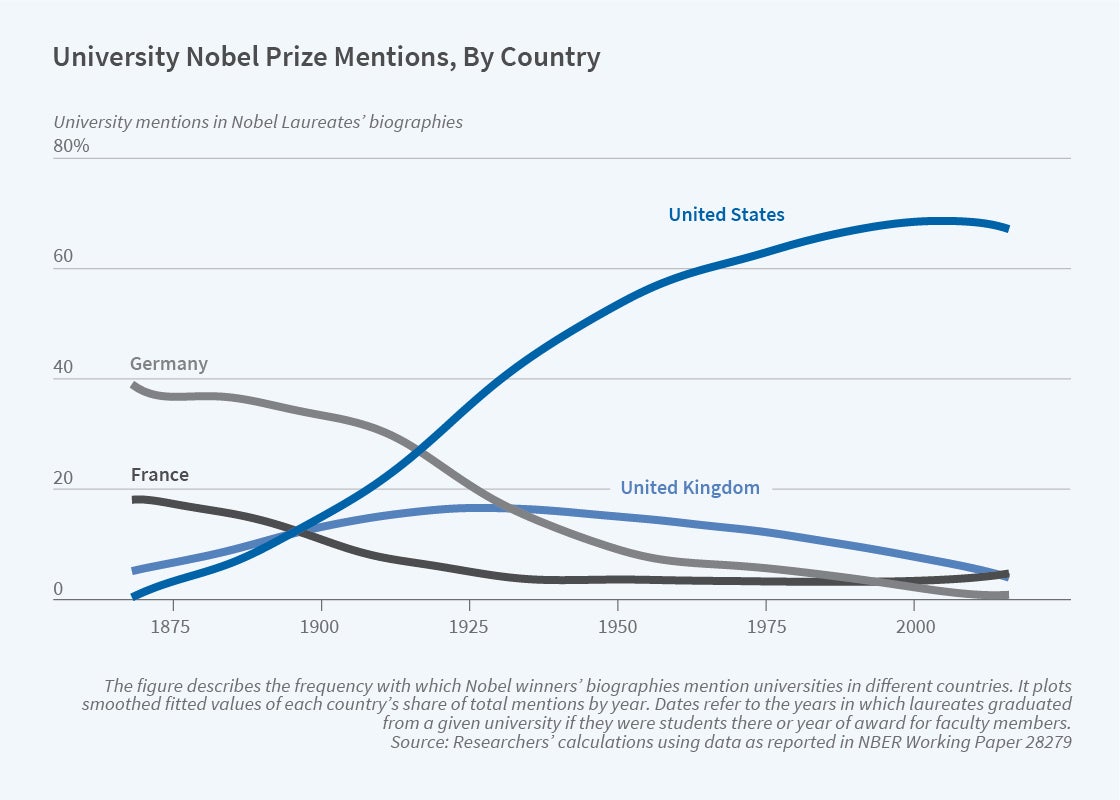
Competition for private donors, talented students, and highly skilled professors produced a virtuous circle in which elite institutions re warded high-quality research.
T he United States had about 900 colleges before the Civil War. By 1875, educational attainment exceeded that in any European nation, but the country had no top-tier research universities. Yet over the next half century, US research universities not only emerged, but achieved global dominance. In 1920, for example, there were more mentions of US universities than German universities — long the global research leaders — in the biographies of Nobel Prize winners.
In Why Does the US Have the Best Research Universities? Incentives, Resources, and Virtuous Circles (NBER Working Paper 28279 ), W. Bentley MacLeod and Miguel Urquiola explain how American higher education in the late nineteenth century was remodeled when a relatively free market encountered changing student demand. New universities specializing in advanced instruction and research attracted both funding and students. Today, the most selective US research universities spend about $150,000 per student, six times the national average.
In the first century after American independence, US students generally preferred colleges that were close to home, and schools were differentiated by religious affiliation. The curricula emphasized Latin, Greek, logic, rhetoric, mathematics, physical sciences, and ethics and politics. Open enrollment meant that anyone who could afford the tuition could attend, and colleges grew by adding more students. There were few professors, and they were paid relatively little. Some professors conducted research, but it was neither emphasized nor rewarded.
Attempts at reform only succeeded decisively when private donors created Cornell University in 1865 and Johns Hopkins University in 1876. Both schools attracted students by expanding curricula, offering specialized instruction, and focusing on graduate education. MIT, Stanford, the University of Chicago, the University of California, Berkeley, and various land-grant state universities were other early entrants. Well-established institutions, such as Harvard and Columbia, responded to the competition by creating their own specialized departments and professional schools.
In Europe, where higher education was largely funded by governments, the entry of new universities was discouraged. While US schools created nationwide faculty and student sorting systems in their competition for research talent, some European countries, including Germany, focused their resources on preserving equality across schools. Many European faculty salaries were determined by rank and seniority rather than the internal “up-or-out” evaluation based on research quality that came to prevail in the US.
Instructors qualified to teach new, specialized curricula were in short supply in the US, and they were difficult to identify. Schools competed for talent by offering higher salaries, reduced teaching loads, sabbaticals, and, beginning at Princeton in the 1920s, tenure. The researchers suggest that tenure increased institutional research productivity in part because tenured faculty do not need to protect their jobs by avoiding hiring more talented colleagues.
As the US supply of graduate specialists grew, professors founded associations like the American Chemical Society (1877) and the American Historical Association (1884). They began publishing specialty journals that reviewed the quality of research before publication .
Growing numbers of students with open enrollment meant that less-prepared students began attending college, threatening colleges’ ability to cater to the elites who had been their traditional customers. In 1919, Columbia implemented selective admissions. It capped its class size, required personal data on application forms, and denied admission without explanation. This, along with the use of standardized tests like the SAT in 1926, gradually created academically stronger student bodies. Early adopters of selective admissions developed supportive alumni networks that donated to them, further advancing research and specialized instruction. These institutions were well positioned to garner an outsized portion of the large increase in federal research funding that began in the 1960s.
— Linda Gorman

Researchers
Working groups.
NBER periodicals and newsletters may be reproduced freely with appropriate attribution.
More from NBER
In addition to working papers , the NBER disseminates affiliates’ latest findings through a range of free periodicals — the NBER Reporter , the NBER Digest , the Bulletin on Retirement and Disability , the Bulletin on Health , and the Bulletin on Entrepreneurship — as well as online conference reports , video lectures , and interviews .

© 2023 National Bureau of Economic Research. Periodical content may be reproduced freely with appropriate attribution.
- Future Students
- Current Students
- Faculty/Staff

News and Media
- News & Media Home
- Research Stories
- School's In
- In the Media
You are here
The story behind the modern university.
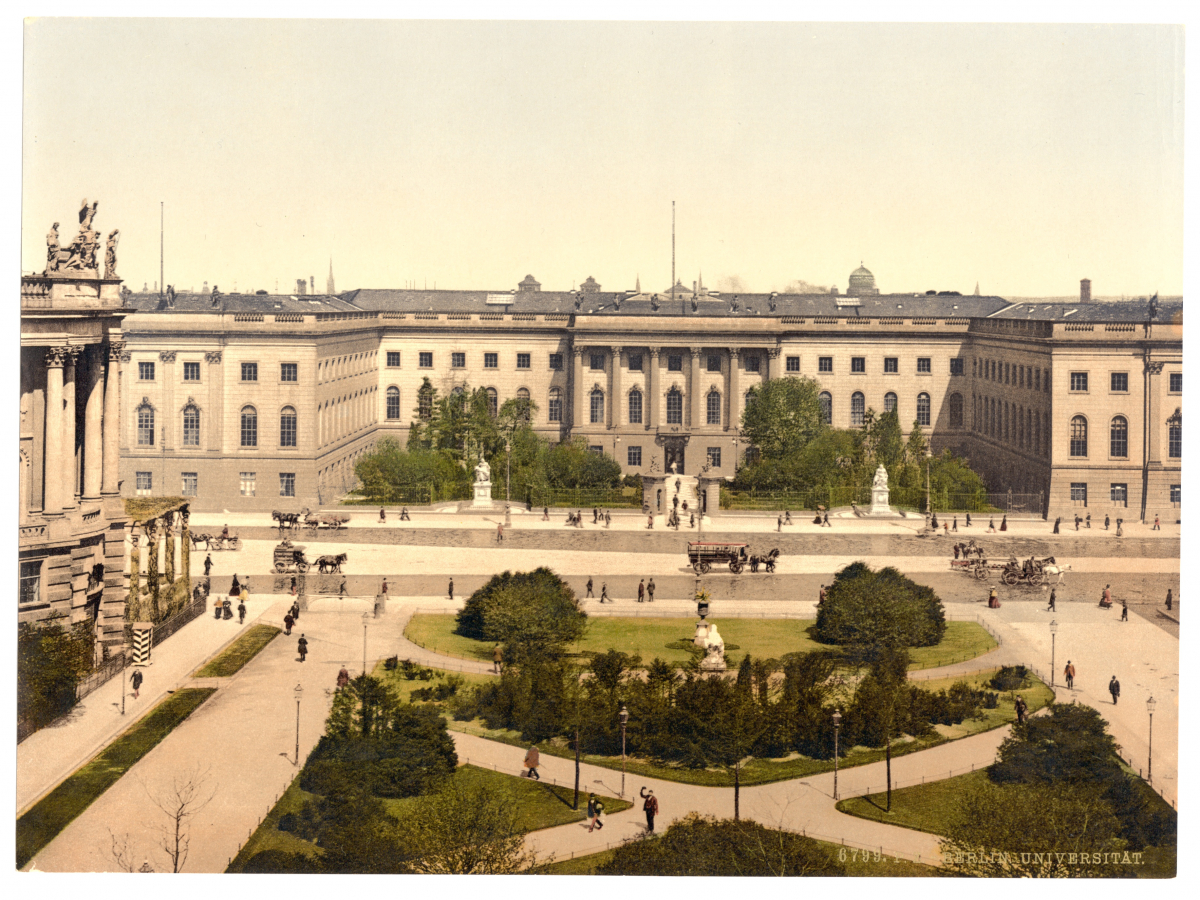
Many of us take for granted that universities are a natural home for both research and teaching. But that wasn’t always the case: When the first U.S. and European colleges were established, they were largely religious institutions, designed to reinforce sectarian ideas and beliefs.
“Probably the most charitable reading was that they [offered preparation] for a learned clergy,” said Emily J. Levine , an associate professor at Stanford Graduate School of Education (GSE). “At worst, they were finishing schools…. These were not places that inspired awe in science and innovation.”
On this episode of School’s In , Levine, author of the new book Allies and Rivals (University of Chicago Press, 2021), joined GSE Dean Dan Schwartz and Senior Lecturer Denise Pope to talk about how academic entrepreneurs both competed and collaborated to shape the modern research university.
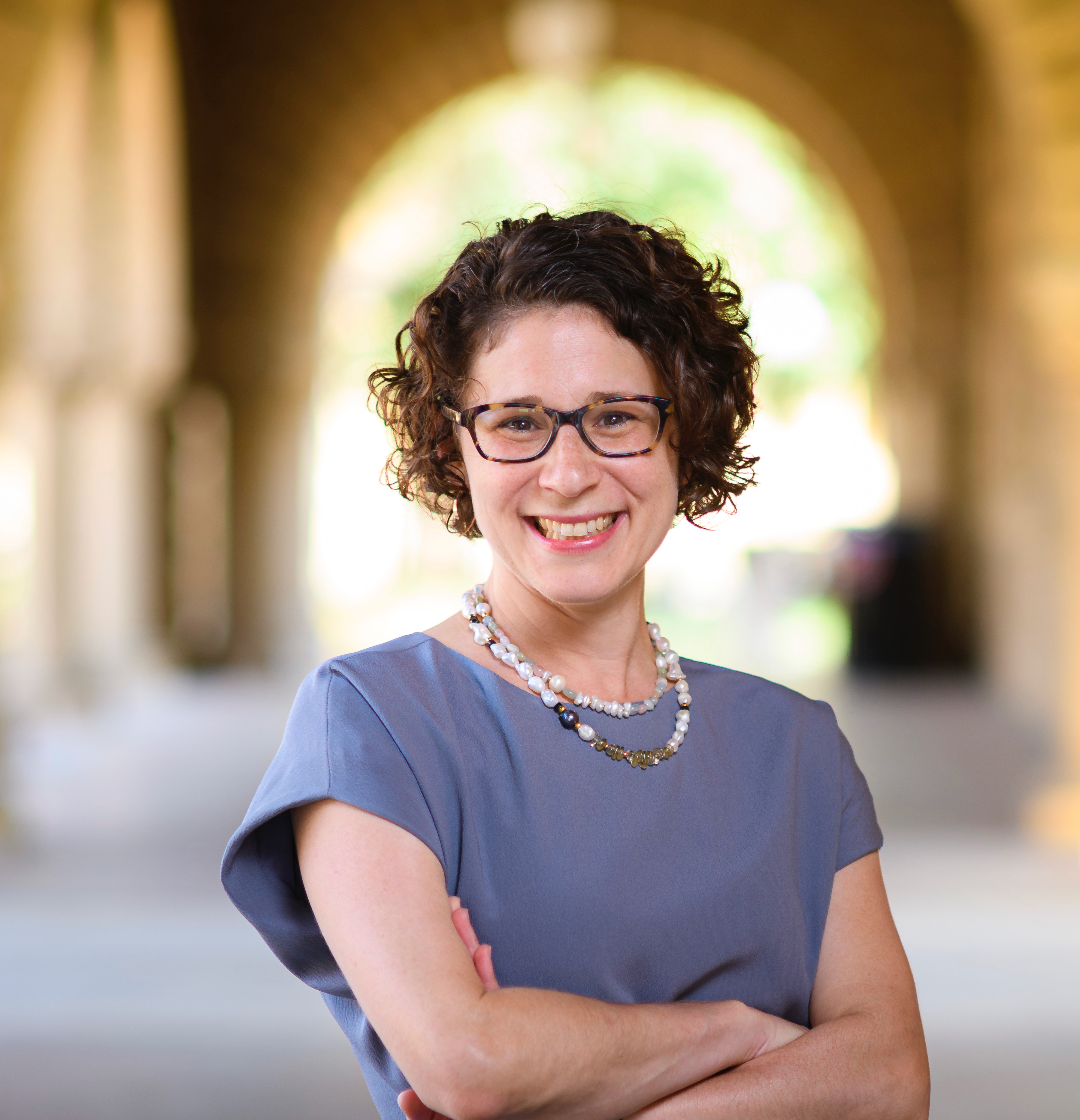
GSE Associate Professor Emily J. Levine
Levine, one of the principal investigators of a new Stanford Changing Human Experience grant, “Recovering the University as a Public Good,” also shared some of the lessons the institution’s history offers about academic leadership today.
The model for a university devoted to both research and teaching, Levine said, didn’t emerge until the 19th century, in Germany, with the rise of the nation-state. The German scholar Wilhelm von Humboldt was tapped to create an institution that would cultivate civil servants and support a more competitive military – while providing scholars the autonomy to pursue their own areas of study.
This hybrid institution became “the envy of the world,” Levine said, and drew thousands of American students to Germany for a singular educational experience. After returning home to the United States, many went on to become university presidents.
The traditional narrative, she said, has American returnees importing the German model to America. But Levine’s research reveals a more complicated story.
“They [didn’t] just cut and paste the German graduate school,” she said. “They [created] a new hybrid institution of their own.”
As Germans and Americans – the “allies and rivals” of the book’s title – competed for world leadership, they collaborated to innovate in educational models. The process of “competitive emulation,” Levine said, gave rise to the now-familiar institution replicated around the globe.
This history offers lessons for academic leaders today, said Levine. “What we see among these academic entrepreneurs … is that they’re very skilled at moving back and forth between different circles: between the scholars and their values of science and pure research, and the needs of society, be they economic or political,” she said. “You often don’t know what side they’re really on, which I think is key. The chameleon-like quality of that negotiation required to move across this complex terrain is really what we need in our leaders today.”
You can listen to School's In on SiriusXM , Apple Podcasts , Google Podcasts , Spotify , Stitcher and Soundcloud .
⟵ Go to all School's In
Get the Educator
Subscribe to our monthly newsletter.
Stanford Graduate School of Education
482 Galvez Mall Stanford, CA 94305-3096 Tel: (650) 723-2109
Improving lives through learning
- Contact Admissions
- GSE Leadership
- Site Feedback
- Web Accessibility
- Career Resources
- Faculty Open Positions
- Explore Courses
- Academic Calendar
- Office of the Registrar
- Cubberley Library
- StanfordWho
- StanfordYou

- Stanford Home
- Maps & Directions
- Search Stanford
- Emergency Info
- Terms of Use
- Non-Discrimination
- Accessibility
© Stanford University , Stanford , California 94305 .
The Triumph of America's Research University
Since the 19th century, the institutions’ thinkers have discovered a dazzling array of new knowledge—yet attacks on academic freedom mean all their potential is now at risk.

Most members of the educated public probably think of America’s greatest universities in terms of undergraduate and professional education—in terms of teaching and the transmission of knowledge rather than the creation of new knowledge. This point of view is completely understandable. They are concerned about the education of their children and grandchildren or relate to their own educational experience.
But what has made American research universities the greatest in the world has not been the quality of their undergraduate education or their ability to transmit knowledge, as important as that is. Instead, it’s been their ability to fulfill one of the other central missions of great universities: the production of new knowledge through discoveries that change our lives and the world.
The teaching of undergraduate and graduate students is critically important and an integral part of the mission of great universities; some do this very well, others in a less distinguished manner. In many ways, such teaching is the faculty member’s first calling. At least at the graduate level, many of the great research discoveries are produced through a collaboration between a faculty member and her students. At the undergraduate level, there is, in fact, contrary to popular belief, a modest positive association between the quality of a professor’s research and the assessed quality of her teaching. But, the fulfillment of the undergraduate teaching mission is not what has made America’s universities the best in the world.
When educated Americans think of their best universities, they probably don’t think that lasers, FM radio, magnetic resonance imaging, global positioning systems, bar codes, the algorithm for Google, the fetal monitor, the nicotine patch, antibiotics, the Richter Scale, Buckyballs and nanotechnology, the discovery of the insulin gene, the origin of computers, of bioengineering through the discovery of recombinant DNA, transistors, improved weather forecasting, cures for childhood leukemia, the pap smear, scientific agriculture, methods for surveying public opinion, the concept of congestion pricing, human capital, or “the self-fulfilling prophecy” all had their origins in the country’s research universities. Even the electric toothbrush, Gatorade, the Heimlich maneuver, and Viagra had their origins at these great universities. These institutions have become the engines of innovation and discovery that now drive a large part of the economic growth and social change in the United States.
Of course, there are other great universities in Europe and Asia, but there is arguably no system of higher learning that matches that in the U.S.—as determined by the number of Nobel Prize winners it’s produced ( 350-plus ), the impact of its discoveries , the multiple international rankings that have American research universities at about 75 percent of the top 50 institutions and about 60 percent of the top 100. What, then, has made these universities the envy of the world? And how, in less than 75 years, have they become the preeminent backbone of higher education internationally—the place where many of the brightest and most able young people want to attend and work?
The American research university was born a century after the American Revolution, when Johns Hopkins University opened its doors in 1876. It was an amalgam of the British Oxbridge undergraduate system and the German emphasis on research; Hopkins’s focus on inquiry and experimentation drew the attention of some of the late 19th century’s great academic minds—people like Henry A. Rowland, who became the first president of the American Physical Society. America’s research universities, even in their early years, were far more open and democratic than their European counterparts.
Perhaps more importantly, the system was, from the beginning, fiercely competitive. Even in its neonatal state it represented the beginning of academic free agency; it was always competing with other institutions to be the best. The renowned Columbia University physicist I.I. Rabi in the 1930s said that the United States had young people as talented as any in the world, but that it lacked the established leadership found at great German, English, and French universities. As it turned out, the nightmare that was created by Hitler’s National Socialism represented, ironically, a boom for American research universities. The migration of Jews and others at risk in Europe—including intellectuals in virtually all fields—propelled the American higher-education system forward.
When this talent was combined with the internalization of the extraordinary value system that derived from the science revolutions of 17th-century England, the United States created the foundation on which great research universities could be built. Those core values included meritocracy; organized skepticism (the willingness to entertain the most radical of ideas, but subject the claims to truth and fact to the most rigorous scrutiny); the creation of new knowledge; the belief that discoveries should be available to everyone and that those that make discoveries should not profit from them; the peer-review system that relies on experts to judge the quality of proposed research that’s seeking funding; and academic freedom and free inquiry, without which no great university can be established. These values became part of the culture of America’s great research universities.
To be sure, these were ideals that have yet to be reached. Some of these values have, in fact, eroded over the past 25 years with the increased commodification of the university and the desire by universities and their faculty members to gain income from things like patented discoveries and from contracts with business that want to be associated with a university’s football or basketball team. But essentially, these values have represented the foundation on which these universities have been built.
Add to these values the implementation after World War II of the most enlightened federal science policy that the world has ever produced—one that used taxpayer money to fund research; that outsourced the work to the great universities on a competitive basis; that linked research and teaching by concentrating the training of advanced students with laboratory work with a leading professor; that produced funding for veterans to return to school and to those who could not afford college without financial aid; and that granted great autonomy to universities in exchange for the production of new discoveries, increased human capital, and more enlightened citizens—then you have some of the conditions that led to the international preeminence of the American research-university system.
Looking at the people who live in this community of scholars offers perhaps the best way to convey how research, combined with teaching, is the principal determinant of a university’s greatness. Take Bonnie Bassler, a molecular biology professor working with students from around the world who’s doing fundamental science at an extremely high level in her laboratory at Princeton University. She is charismatic and has won almost every prestigious award a scientist can hope for. Bassler works with bacteria that can cause lethal diseases such as anthrax, and her goal, of course, is to make fundamental discoveries that will lead to cures or treatments for these diseases.
She wants to develop molecules that will act as antimicrobial drugs aimed at bacteria that can cause lethal diseases. It turns out that these lethal bacteria are impotent against the human immune system when they attack it alone—but they have the ability to talk to each other (chemically), to strategize, and to attack the immune system at its weakest point. When they attack in great numbers, they can overwhelm a human’s immune system; Bassler and her students and colleagues want to find a way to stop the bacterial from “talking.”
Bassler is, of course, only one of thousands of extraordinarily talented scientists in America’s research universities who train a multinational group of students—who effectively become their extended family members—in how to conduct the research necessary to make profound discoveries. She and other world-class scientists and engineers and humanists show just how deeply embedded teaching is in the research function of America’s great universities. Postdoctoral fellows, graduate students, and occasionally undergraduates are learning through doing—they are rubbing minds with some of the most original thinkers of the era. Even if this is not the teaching that the public hears most about, it is going on in abundance at the country’s major universities, and accounts for the research discoveries and innovations that they’re spearheading. Moreover, these research communities have become even more important amid the demise of so many prominent industrial research laboratories, such as the Bell Labs or Xerox laboratories.
Yet all of this research potential is now at risk. Academic freedom and free inquiry are under attack from many political leaders who endorse anti-science positions and who interfere with the relative autonomy of these institutions. The compact between the federal government and the universities is frayed, with weakening trust on both sides leading to thousands of federal government regulations, the stagnation of research budgets, unnecessary controls on research, false claims that the universities are bilking the taxpayer, and, ultimately, the loss of American supremacy in some important research areas.
The universities, looking for new sources of revenue while competing for students and faculty, are increasingly becoming commodities—businesses to be run. Visa policies are far too restrictive—preventing unusual and creative talent from staying in the United States and working at its distinguished postsecondary institutions. There are few great, outspoken, and courageous higher-education leaders who have a vision for the future and the capacity to introduce significant change at their institutions. There are even fewer leaders who have “quitting issues”— who would be willing to resign when others undermine his or her core values. These threats represent real challenges for American universities’ continued preeminence and to the character of these great institutions of higher learning.
- Recent changes
- Random page
- View source
- What links here
- Related changes
- Special pages
- Printable version
- Permanent link
- Page information
- Create account
How did universities develop
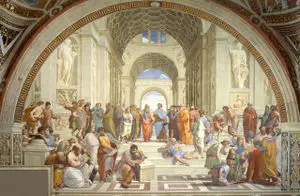
Universities today are a key component for modern states and economies, where the professional classes and academic research are fostered. We often rate societies by their abilities to produce scientific achievement and develop economic success, where universities play a critical role. However, the history of universities was very different, and these institutions were first relatively parochial, and only in recent times have they become pervasive.
Which Societies created the Precursors to Universities?
Early institutions of higher learning existed long before universities were established. These early institutions conducted research and taught pupils, similar to our ideas of universities today. Early recordings from Egypt and Mesopotamia suggest some scholars conducted research, and these scholars likely taught and were affiliated with institutions of learning. The Ashurbanipal Library at Nineveh and Library at Sippar were collections of knowledge that likely also had students and teachers associated with them that taught a select group of individuals who learned the complex written languages of their day also began to study and apply their knowledge. [1]
The Platonic Academy of Greece
The first institution that was more fully documented was the Platonic Academy (Figure 1), founded in 387 BCE, with Aristotle's Peripatetic school founded in 335 BCE having derived from Plato's Academy. These schools generally had a select few pupils. They were not institutions for mass education. [2] Perhaps one of the first truly international institutions of higher education was the Musaeum, institutions that brought knowledge to it from around the known world.
The Library of Alexandria
The Library of Alexandria was part of this institution, and it served as a repository for knowledge not just from the Hellenistic world but also accumulated knowledge from Babylonia and Persia that had preceded Greek scholarship. The Musaeum largely functioned like an international university, where students would come to be educated by the best teachers. The Ptolemaic state was tolerant to scholarship and allowed individuals from many regions to come to Alexandria to be involved in this institution. [3]
Creation of Universitie in India
In the ancient world, several regions developed traditions of scholarship. In the Indian subcontinent, Pushpagiri and Nalanda were two well-known centers of higher education. These institutions were devoted to Buddhist teaching and trained individuals in arts, medicine, mathematics, and astronomy. Even politics, or something comparable to political science, or political theory, was taught at these academies. Earlier Hindu higher learning centers, such as Taxilia, also inducted students. This place became associated with one of the earliest economic treatises known to us, a text call the Arthashastra, which also discussed other topics, such as political statecraft. [4]
The Chinese Imperial Training System
China had developed an imperial academy to train bureaucrats during the Han dynasty in Taixue by the 1st century CE. While earlier academies were more akin to private institutions, the Chinese imperial training system became more similar to public education. The school seemed to recruit students nationwide, and admission was based on skills and accolades, demonstrating that higher education had become a form of social mobility and mass education. Up to 30,000 students may have attended the academy at a given time. Later in the 1st millennium CE, the school began to develop an examination system that evaluated its enrolled classes. [5]
The Persian Medical academy - Gundishapur
In ancient Persia, during the Sasanid dynasty around the 3rd century CE, Gundishapur functioned as a medical training and higher education academy. This academy continued to function for some time after the arrival of Islam. It became one of the key influences and foundations for Islamic higher education that succeed it. [6]
Higher education in Rome and the Middle Ages
In Europe, during the Roman and later Antiquity period, scholarship continued to follow the Greeks' Platonic tradition. However, these institutions were closed by the 6th century CE due to their association with pagan practices and philosophies. With the fall of the Roman Empire, scholarship became confined to isolated monasteries. These monasteries trained individuals in learning, mostly those who became priests or monks and began to document some of the Greek and other knowledge from the past. [7]
When were the first Early Universities created?
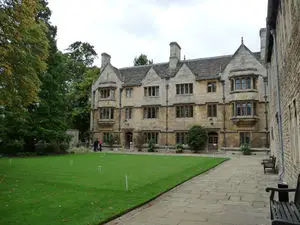
The first true university, an institution called such, was founded in Bologna, Italy, in 1088. The Latin phrase universitas magistrorum et scholarium indicated an association of teachers and scholars. At this early date, universities were more of an association or a guild for learning particular crafts. In the case of Bologna, the focus was law. The emphasis was on training students for more developed skills within a particular profession to serve and develop those skills at more professional levels. Oxford, the second oldest university and oldest English speaking university, was probably sometime late in the 11th century. Traditions such as having a chancellor and residence halls had become established by the 13th century. Oxford had established its oldest colleges, Balliol and Merton Colleges, by the mid 13th century (Figure 2). [8]

The early universities, such as Paris, later became the Sorbonne, derived from the monastic or cathedral learning schools that had continued into the early Medieval era after the fall of the Roman Empire. Thus, these early universities were closely affiliated with the Catholic church, although education began to be broad and offered important skills outside of religious education. Despite the religious association of schools, they also developed to be independent and sometimes trained individuals who would come into conflict with the church. [9]
A key development occurred in the founding of the University of Naples, founded in 1224. It was founded as a public institution dedicated to a king rather than the pope or Catholic church. Some see this as the beginning of developing the concept of secular education, although virtually all higher education institutions had religious curriculum as part of their broader education. In Germany, where many cities developed very independent traditions, we see municipalities and municipal governments being active in universities' founding. This is the case with the University of Cologne, founded in 1388. [10]
When were the Modern Universities Established?
By the late Medieval and Early Modern Period, the number of universities began to grow rapidly in Europe, whereby in the 18th century, there were probably around 143 universities. This does not include other forms of higher education institutions that did not call themselves universities, such as academies. The University of Paris began to develop the idea of faculties that differentiated areas of study. The topics of focus that began to develop in universities were philosophy. The traditional title for PhDs is philosophy, medicine, logic, theology, law, mathematics, astronomy, and grammar. These branches of study were seen to be related to a humanistic perspective, as many required translation of ancient works in addition to a focus on the discipline. [11]
Early universities were rigid and heavily influenced by Aristotle's notion of the sciences and learning. However, scholars began to experiment with new ways of learning and experimentation. Disciplines began to break away from a heavy influence of humanistic influences. This led to the divergent development of the sciences from the humanities within an education system. By the 18th century, universities also began developing research journals, encouraging scholars to publish and circulate their findings with other scholars. In Germany, Wilhelm von Humboldt developed ideas of academic freedom, seminars, and laboratories as a way for universities to foster debate, knowledge, and new scientific inquiry. [12]
During the 19th century, public universities available to the masses became more widespread. Only in the 19th century did religion become less of an important focus in the curriculum. This gradually made universities secular higher education institutions. With the development of the Industrial Revolution, many universities began to focus more on the sciences as industrialization began to develop as a form of competition between the Western world. In Britain, the concept of the civic university was seen as an engine for developing a secular, economic potential that used the masses by giving them access to education. [13]
The British Empire and later other European empires began to transplant the European education model around the world. While the United States began to adopt some of the German models for a research university, much of the rest of the world also was instilled with European concepts. These then became pervasive and entrenched within countries such that when colonial powers diminished in the 20th century, the university systems they either founded or had fostered as educational models were largely kept in places such as India, Kenya, and the Middle East. [14]
Today's universities have diversified further. Private universities that have a business-like or for-profit model has been one prominent model developed recently. Intergovernmental and universities built by countries in foreign places have been created to promote ideas or training that is similar to what one might obtain in the home countries. This has spread many similar universities worldwide, where countries with very different cultures and traditions now have relatively similar universities' ideas. This has also become a way in which countries now see universities to compete in the global marketplace, as they train their masses and develop their economic competitiveness.
We see then that higher education changed conceptually from restricted academic institutions to the foundation of universities, which proved to be similar to guilds in the Medieval period. It was only in the late Medieval and Early Modern eras that universities began to spread more rapidly, and in the 19th century, these institutions became fully secular. This secularization, and later acceptance of women, helped the masses to enroll in universities during the 19th century. The concept of mass education became established as industrialization became a key for countries' economic success and power.
- ↑ For more on learning in Mesopotamia and Egypt, see: Krebs, Robert E. 2004. Groundbreaking Scientific Experiments, Inventions, and Discoveries of the Middle Ages and the Renaissance. Groundbreaking Scientific Experiments, Inventions, and Discoveries through the Ages. Westport, CT: Greenwood Press.
- ↑ For more on the early Greek higher education institutions, see: Reale, Giovanni, John R. Catan, and Giovanni Reale. 1990. Plato and Aristotle. A History of Ancient Philosophy, Giovanni Reale ; 2. Albany, NY: State Univ. of New York Press, pg. 149.
- ↑ For more on the Musaeum and Library at Alexandria, see: MacLeod, Roy M., ed. 2000. The Library of Alexandria: Centre of Learning in the Ancient World. London ; New York : New York: I.B. Tauris ; In the U.S.A. and Canada distributed by St. Martin’s Press.
- ↑ For more on India's higher education ancient tradition, see: Mookerji, Radhakumud. 1989. Ancient Indian Education: Brahmanical and Buddhist. Delhi: Motilal Banarsidass.
- ↑ For more on China's early higher education and imperial academy, see: Becker, Jasper. 2000. The Chinese. Oxford; New York: Oxford University Press, pg. 8.
- ↑ For more on Gundishapur, see: Esposito, John L., ed. 1999. The Oxford History of Islam. New York, N.Y: Oxford University Press, pg. 742.
- ↑ For a history of early Medieval European learning, see: Kleinhenz, Christopher, ed. 2004. Medieval Italy: An Encyclopedia. The Routledge Encyclopedias of the Middle Ages. New York: Routledge, pg. 314.
- ↑ For more on the early universities, see: Ridder-Symoens, Hilde de, ed. 1992. Universities in the Middle Ages. A History of the University in Europe, v. 1. Cambridge [England] ; New York: Cambridge University Press.
- ↑ For more on the Church's role in universities, see: Ellis, John Tracy. 1989. Faith and Learning: A Church Historian’s Story. Melville Studies in Church History, v. 1. Lanham, MD : [Washington, D.C.]: University Press of America ; Dept. of Church History, Catholic University of America.
- ↑ For more on public universities' development, see: Nicholas, David. 1992. The Evolution of the Medieval World: Society, Government, and Thought in Europe, 312-1500. London ; New York: Longman.
- ↑ For more on the early modern universities, see: Kirwan, Richard, and Jonathan Davies. 2013. Scholarly Self-Fashioning and Community in the Early Modern University. Burlington, Vt.: Ashgate.
- ↑ For more on Humboldt's developments, see: The University according to Humboldt: History, Policy, and Future Possibilities. 2015. 1st edition. New York, NY: Springer Science+Business Media.
- ↑ For more on the development of mass education in the 19th century, see: Brockliss, L. W. B, and Nicola Sheldon. 2012. Mass Education and the Limits of State Building, C. 1870-1930. New York, NY: Palgrave Macmillan.
- ↑ For more on the British model and spread of universities during the period of European empires, see: Pietsch, Tamson. 2015. Empire of Scholars: Universities, Networks and the British Academic World, 1850-1939. Manchester: Manchester University Press.
Related DailyHistory.org Articles
- How historically accurate is the Gladiator
- What Role Did the Canaanites Play in the Bronze Age Near East
- What Are the Origins of the Germanic Tribes
- How Did the God Baal Become Popular
- Who was Theseus the great Athenian king and hero
- How Did the Ancient Egyptian City of Thebes Become Prominent
- What Were the Origins of Ancient Macedon (aka Macedonia)
- When Did the Nubian Kingdom of Meroe Rise to Prominence
- What was the Spartan Training called the Agoge
- Why Was Gordian Knot Important to Alexander the Great’s Conquests
- Who was the Roman God Janus
- How Did the Ancient City of Sais Rise to Prominence
- What Was the Significance of the Near East Middle Bronze Age System
- How Did Ancient Alexandria Rise to Prominence
- Category:Persian History
- How Did the Ancient City of Memphis Rise to Prominence
- Where Was the Kingdom of Alashiya
- How Did the Seleucid Empire Collapse
- Who was Thanatos the God of Death in Greek mythology
- How Did the Ancient Egyptian State Form
- Ancient History
- European History
- Cold War History
- This page was last edited on 21 September 2021, at 02:44.
- Privacy policy
- About DailyHistory.org
- Disclaimers
- Mobile view
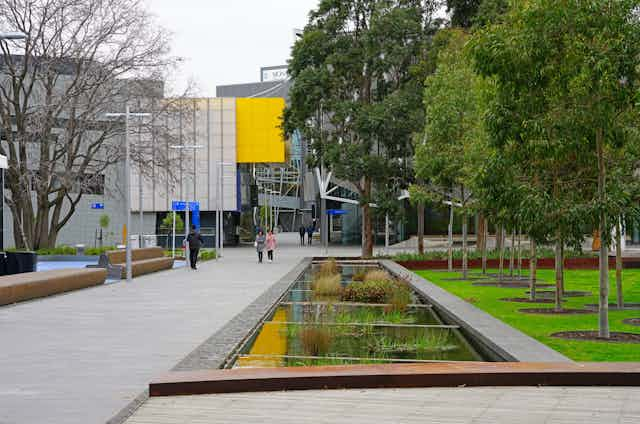
A century that profoundly changed universities and their campuses
Adjunct Professor of Architecture, University of Adelaide
Disclosure statement
Geoff Hanmer is managing director of ARINA and a member of the Australian Institute of Architects, the Association of Consulting Architects, the Architectural Association and SAHANZ.
University of Adelaide provides funding as a member of The Conversation AU.
View all partners
This history of the development of universities is the first of two articles on the past and future of the campus. This is a long read, so set aside the time to read it and enjoy.
Once the first atomic bomb exploded on July 16 1945 in New Mexico, the world would never be the same again. Scientists and engineers had turned an obscure principle into a weapon of unprecedented power. Los Alamos , the facility where the bomb was designed, was run by the University of California.
This was a turning point for universities. As they increasingly focused on scientific research, the role of universities worldwide – and their campuses – changed.
Read more: Think big. Why the future of uni campuses lies beyond the CBD
Before the first world war, the largest investment on most campuses was the university library. After the second world war, investment shifted decisively to laboratories and equipment.
A key reason for the increasing focus on university research was the lessons of the first world war. After the war, governments of rich countries took an increasingly interventionist role in directing and encouraging the research and development of artificial materials, weapons, defences and medicine. Universities or institutes associated with universities did much of this work.
Read more: Universities and government need to rethink their relationship with each other before it's too late
By 1926, the Council for Science and Industrial Research, the predecessor to the CSIRO , and the organisation that would become the National Health and Medical Research Council ( NHMRC ) had been founded in Australia.
A gradual turn towards research
In the UK, many of the older universities were not that keen on applied research. Chemistry, engineering and physics were taught at Oxford between the wars, but by 1939 the chemistry cohort was just over 40 students, of whom “ two or three were women ”.
It wasn’t until 1937 that Oxford drew up a plan to develop the “Science Area” with new buildings, but in that same year, the university also agreed to reduce its size to avoid a fight with the Town over “ further intrusion on the Parks ”.
Facilities at Cambridge for physical sciences were slightly better, but not by much, despite its historical focus on mathematics. The Cavendish laboratory in which the New Zealander Ernest Rutherford discovered in 1911 that the atom had a nucleus was small, dark, damp and ill-equipped.
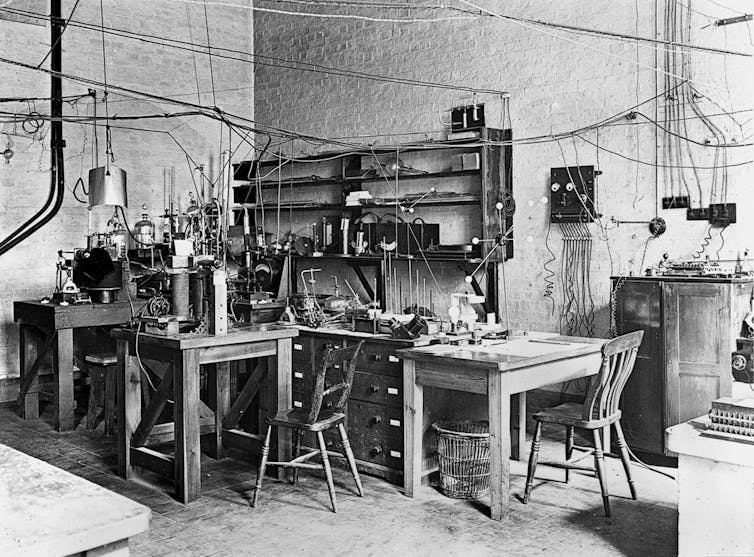
This relative lack of interest in experimental sciences at Oxbridge was unhelpful for science research in Australia, because our six small state-run universities tended to follow their lead. As an indication of its priorities, the University of Adelaide built its humanities buildings in stone and its much more modest science facilities in brick.
Nobel laureate and University of Adelaide Professor W.H. Bragg carried out his pioneering experiments on X-ray crystallography in Adelaide during 1900 to 1908 in a converted storeroom in the basement of the Mitchell Building. His lab is now a storeroom again.
The post-war transformations
The application of university research had been a German strength since well before the first world war with the rise of the Humboldtian model of higher education, which favoured research over scholarship. A key reason the Allies prevailed in 1945 was that the United States in particular rapidly improved its capacity to carry out and apply research, based on the Humboldtian model.
In 1917, MIT established a naval aviation school . The University of Washington soon followed MIT’s example.
This decision had a direct bearing on the success of the Boeing company following construction of the Boeing wind tunnel at the University of Washington’s Seattle campus in 1917. It led directly to the development of advanced aerodynamics for the Boeing 247 of 1933, which provided the template for all subsequent commercial airliners.
The Australian university system between the wars offers no such exemplars. The focus on applied research was foreign to the prevailing university culture in Australia at the time. As Hannah Forsyth writes in A History of the Modern Australian University , not until the 1940s did “scholarly esteem began to move away from ‘mastery’ of disciplines towards the discovery of new knowledge”.
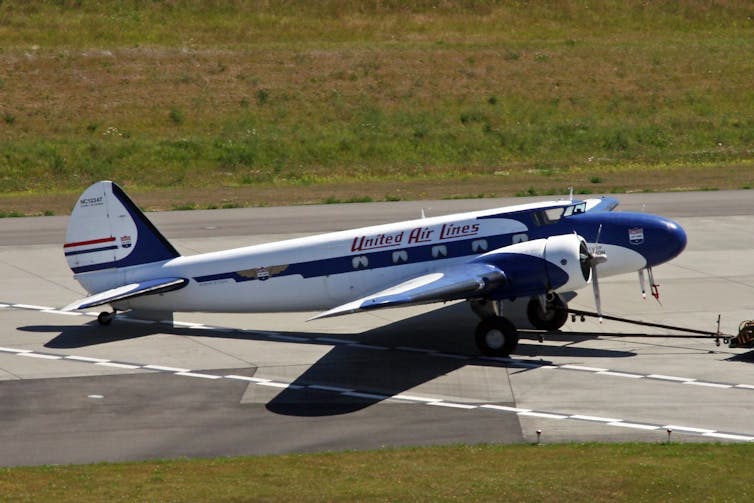
New research facilities and new campuses
New technologies led to a host of new post-war industries, including commercial aviation, television, plastics, information technology (IT) and advanced health care. The demand for skills to operate these new industries was the primary driver of an explosion in university enrolments.
University science research in Australia only got a serious start in 1946 with the foundation of the Australian National University (ANU) and the Commonwealth Universities Grants Committee, which became the Australian Research Council ( ARC ).
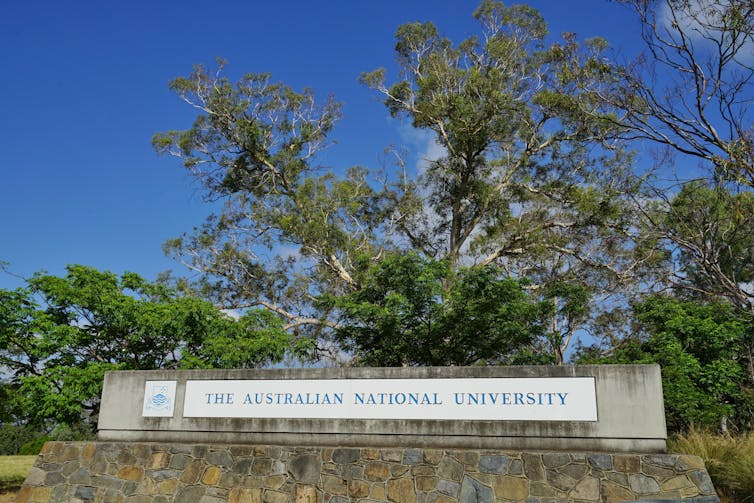
As Robert Menzies, the prime minister from 1949-66, later wrote :
The Second World War brought about great social changes. In the eye of the future observer, the greatest may well provide to be in the field of higher education.
In Australia, about 80% of our universities have been founded since the second world war. The growth of the sector has been startling.
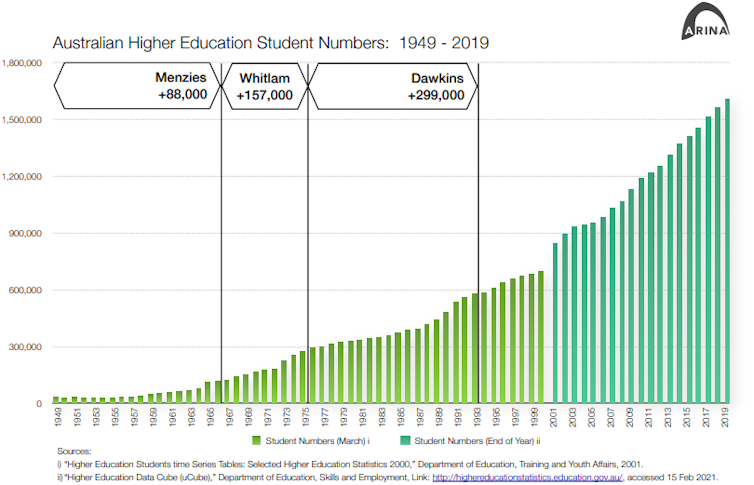
Read more: Australia doesn't have too many universities. Here's why
All of the institutions founded during the Menzies era were sited on large campuses in the suburbs or beyond. Although mainly Commonwealth-funded, they were designed and delivered by state public works authorities to tight budgets on land provided largely by state governments. UNSW, Monash, Griffith, La Trobe, Flinders and WAIT (now Curtin) share a heritage of economical buildings on large parcels of land.
The key reasons for this approach were to minimise cost and maximise capacity for growth and change. Low to medium-rise buildings on land surplus to state needs maximised bang for buck. Development costs per square metre of building were about half that of a campus in the central business district (CBD) of cities.
This was not a new discovery. The universities of Stanford, Berkeley, Caltech, Tokyo, Wisconsin and Peking, all founded in the 19th century, used this model for similar reasons.
Fortunately, the states were generous with land they didn’t need. Of all the universities built in the Menzies era, only UNSW with 39 hectares has a significant land area constraint. The other universities have at least 50ha and several have well over 100ha. This has given them some headaches, but also lots of options.
Research by ARINA, an architectural firm specialising in higher education, community and public design, shows that virtually all universities built since 1949 – that’s more than 90% of universities in the world – have large campuses with densities less than 500 students per hectare. The University of Bath, built in 1966, is typical of post-war UK universities with 59ha and 16,000 students in 2021, less than 300/ha.
The same is true even in small city-states such as Hong Kong and Singapore. The National University of Singapore has a campus of about 140ha with 37,000 students (264/ha) and Hong Kong University of Science and Technology has 55ha with 11,000 students (200/ha).

Most new universities in Europe, Asia, India and the Middle East still rely on the large campus model. The University of Paris-Saclay, for example, is being built on 189ha of former farmland 15km south of the Paris orbital motorway.
Broad-acre campuses are popular with students as measured by surveys of educational experience such as the Australasian Survey of Student Engagement ( AUSSE ) and the US National Survey of Student Engagement ( NESSE ). The most popular campuses in Australia are Bond, New England, Griffith and Notre Dame. RMIT and UTS, the highest-ranked CBD campuses finish in the middle of the pack , a long way behind the leaders. A similar phenomenon can be seen in the UK and the US.
Read more: Looking beyond the sandstone: universities reinvent campuses to bring together town and gown
Campus model goes corporate
The ARINA research indicates broad-acre campus models have also become increasingly part of the physical organisation and accommodation of many commercial operations.
In 2020, 63% of the top 30 US Fortune 500 index and 87% of the top 30 tech companies in the index were located in suburban and extra-urban settings, mostly campuses. This includes well-known tech companies such as Apple, Alphabet, Facebook, Tesla and HP, but also less obvious candidates such as Walmart, Exxon Mobil and Amazon.
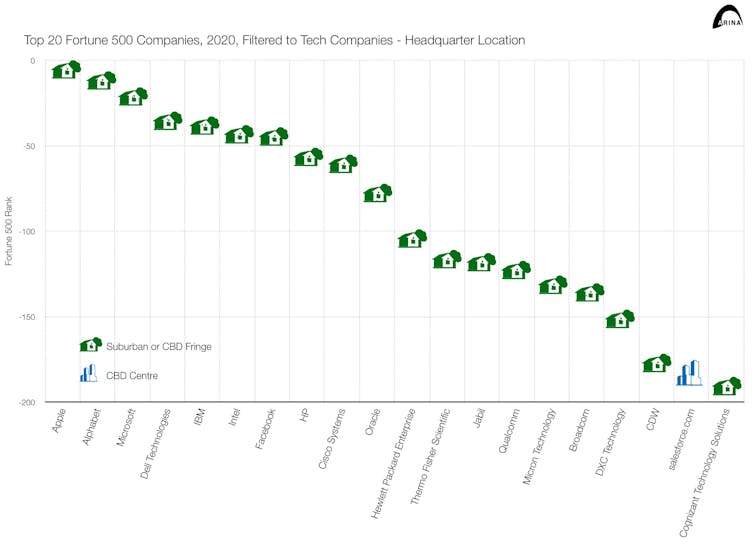
In the UK, 28% of all FTSE 100 companies and 54% of FTSE Techmark 100 companies by market capitalisation are based outside greater London.
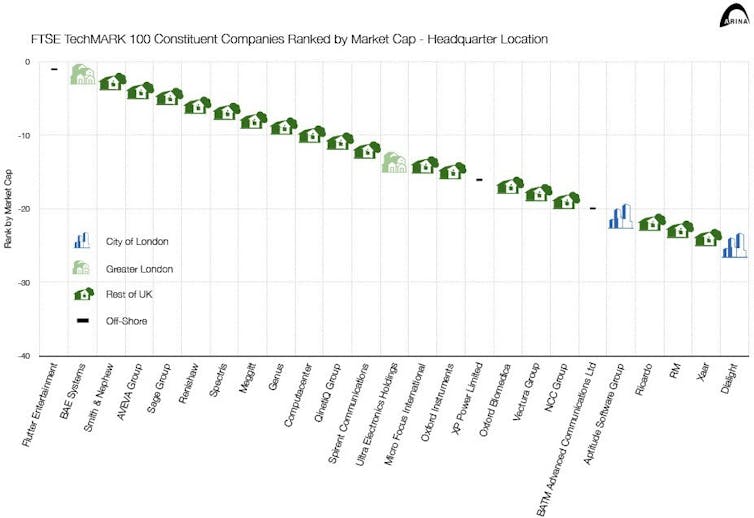
The reasons for this are straightforward: capital and operating costs for research-based firms are lower outside a CBD. While some Australian universities are choosing to head into the city, much of the new economy appears to be heading for the suburbs. It’s happening for the same reason that universities started to migrate there over a hundred years ago.
Read more: The rise of the corporate campus
- Universities
- Higher education
- University campuses
- University research
- Role of Universities
- University teaching
- Campus life
- College campuses
- campus design

Research Fellow – Beyond The Resource Curse

Audience Development Coordinator (fixed-term maternity cover)

Lecturer (Hindi-Urdu)

Director, Defence and Security

Opportunities with the new CIEHF
- Subject List
- Take a Tour
- For Authors
- Subscriber Services
- Publications
- African American Studies
- African Studies
- American Literature
- Anthropology
- Architecture Planning and Preservation
- Art History
- Atlantic History
- Biblical Studies
- British and Irish Literature
- Childhood Studies
- Chinese Studies
- Cinema and Media Studies
- Communication
- Criminology
- Environmental Science
- Evolutionary Biology
- International Law
- International Relations
- Islamic Studies
- Jewish Studies
- Latin American Studies
- Latino Studies
- Linguistics
- Literary and Critical Theory
- Medieval Studies
- Military History
- Political Science
- Public Health
- Renaissance and Reformation
- Social Work
- Urban Studies
- Victorian Literature
- Browse All Subjects
How to Subscribe
- Free Trials
In This Article Expand or collapse the "in this article" section Historical Evolution of Higher Education in the United States
Introduction, general overviews.
- Data Sets and Reports
- Land-Grant Colleges and Universities
- Research Universities and Sponsored Research
- Foundations in Higher Education
- Community Colleges and For-Profit Institutions
- Academic Freedom
- Governance and Management
- Law in Higher Education
- Race and Culture
- Testing and Admissions
- Student-Aid Policy
- Student Life and Cultures
- Student Politics
- Women in Higher Education
- College Sports
- LGBTQ+ Community and Higher Education
Related Articles Expand or collapse the "related articles" section about
About related articles close popup.
Lorem Ipsum Sit Dolor Amet
Vestibulum ante ipsum primis in faucibus orci luctus et ultrices posuere cubilia Curae; Aliquam ligula odio, euismod ut aliquam et, vestibulum nec risus. Nulla viverra, arcu et iaculis consequat, justo diam ornare tellus, semper ultrices tellus nunc eu tellus.
- Adjuncts in Higher Education in the United States
- American Indian Education
- College Admissions in the United States
- Crossborder and Transnational Higher Education
- Global University Rankings
- History of Education in the United States
- Researcher Development and Skills Training within the Context of Postgraduate Programs
- The Regulation of Standards in Higher Education
Other Subject Areas
Forthcoming articles expand or collapse the "forthcoming articles" section.
- Gender, Power, and Politics in the Academy
- Girls' Education in the Developing World
- Non-Formal & Informal Environmental Education
- Find more forthcoming articles...
- Export Citations
- Share This Facebook LinkedIn Twitter
Historical Evolution of Higher Education in the United States by Christopher Loss , Serena Hinz , Christopher J. Ryan , Christine Dickason LAST REVIEWED: 19 November 2019 LAST MODIFIED: 26 August 2020 DOI: 10.1093/obo/9780199756810-0057
In this article, the historical evolution of higher education refers to higher learning in the United States from the colonial era to the present day. A radically pluralistic system of public, private, and for-profit two- and four-year training institutes and colleges and professional and graduate schools, the American system is generally regarded as the best in the world. A by-product of the American commitment to liberty and to the belief that academic life should exist outside the grasp of direct government control, US higher education’s independence has gradually decreased since World War II and with the dramatic growth of federal funding for research and student aid. Consisting of 4,700 institutions that enroll upward of twenty million students from the United States and abroad, the sector has become a critical governmental intermediary that relies on heavy state-level and federal subsidies and tax expenditures in order to fulfill its core mission of teaching, research, and service. The higher education system also faces a number of pressing challenges: rising costs, declining public support, high student attrition, and long time-to-degree that often results in no degree at all, especially at two-year colleges where the majority of poor and underrepresented minority students enroll. The US higher education system, existing as it does at the intersection of state/society relations, is a fascinating site to study American history. The citations included in this article are intended to provide a point of embarkation for further inquiry. They have been selected because they offer a thematic overview of the history of American higher education intended to provoke additional reading and investigation.
Chroniclers have been tracing the historical evolution of organized higher learning since its formation in Europe and England in the 11th and 12th centuries CE . In the American context, “house histories” of varying quality and accuracy likewise accompanied the founding of the first colonial colleges in the 17th century. While these institutional histories remain a staple of the historical literature and are popular among alumni (and could alone fill an entire annotated bibliography), the first professional histories written by professionally trained historians did not emerge until the late 19th century, which saw the rise of the American history profession. A fringe field dominated by narrowly drawn institutional studies, the systematic scholarly exploration of the history of higher education surged after World War II, when the importance of the research university for national defense and for educating citizens for the rapidly changing labor market and world first became manifest. The postwar period witnessed unprecedented demand for collegiate study, especially among the country’s millions of GI Bill–wielding veterans, which, in turn, generated heightened interest in the study of the institution’s historical evolution. In an effort to make sense of American higher education’s dramatic emergence as a key engine of social mobility, economic progress, and national defense, Brubacher and Rudy 1958 examines the history of the higher education sector as it changed from one dominated by the old-time college to one dominated by the research university. Rudolph and Thelin 1990 provides an incisive study of the “collegiate way” and the lasting influence of the college model on the ascendant university in the late 19th century. For the emergence of the American university, readers should engage Kerr 1963 and Veysey 1965 . On the academic enterprise’s transformation into a secular middle-class institution, see Bledstein 1978 and Reuben 1996 . For the best synthetic history of American higher education, see Thelin 2011 . For a new interpretation of higher education’s role in nation building and in defining the terms of democratic citizenship in the 20th century, see Loss 2012 . Smith and Bender 2006 compiles an impressive collection of primary documents that will assist readers in navigating higher education’s changing meanings, policies, and practices since World War II.
Bledstein, B. J. 1978. Culture of professionalism: The middle-class and the development of higher education in America . New York: Norton.
Through a close examination of leading university presidents—including Harvard’s Charles Eliot and Yale’s Noah Porter—the book explores the rise and impact of the middle class on the modern university and how the middle class turned the institution into a main engine of upward mobility and social status.
Brubacher, J. S., and W. Rudy. 1958. Higher education in transition: A history of American colleges and universities . New York: Harper & Row.
A comprehensive history notable for being among the first critical appraisals of American higher education written in the post–World War II period.
Kerr, C. 1963. The uses of the university . Cambridge, MA: Harvard Univ. Press.
A seminal work—first published in 1963—on the history of the “federal grant university,” what Kerr famously dubbed the “multiversity.” Conceptually rich yet accessibly written, this book is essential reading for scholars, students, and administrators interested in understanding the behavior of the modern research university since World War II.
Loss, C. P. 2012. Between citizens and the state: The politics of American higher education in the 20th century . Princeton, NJ: Princeton Univ. Press.
A social and political history that tracks the growing partnership between the federal government and higher education between World War I and the rights revolution of the 1970s, and the collapse of that relationship from the 1980s onward.
Reuben, J. A. 1996. The making of the modern university: Intellectual transformation and the marginalization of morality . Chicago: Univ. of Chicago Press.
Examines the impact of value-neutrality and of objective truth on the gradual disestablishment of religious orthodoxy in the modern university.
Rudolph, F., and J. R. Thelin. 1990. The American college and university: A history . Athens, GA: Univ. of Georgia Press.
Rudolph’s survey covers the colonial college and the rise of the university, but is at its best dissecting the “college movement” of the first half of the 19th century and the spread of the “collegiate way”—the institutions and habits of mind that gradually coalesced to form the general pattern of undergraduate education in the United States.
Smith, W., and T. Bender. 2006. American higher education transformed, 1940–2005: Documenting the national discourse . Baltimore: Johns Hopkins Univ. Press.
This collection of primary documents serves as a miniature archive on the history of American higher education since World War II, covering an assortment of topics: from the liberal arts and graduate study to the academic profession, academic freedom, and the rights of students. Provides an excellent guide for faculty and administrators interested in better understanding American higher education.
Thelin, J. R. 2011. A history of American higher education . 2d ed. Baltimore: Johns Hopkins Univ. Press.
This well-written and engaging study, which deploys sociologist Burton Clark’s idea of the university as an institutional saga, is the rare scholarly study that will enlighten both the general reader and the professional academic—ideal for both introductory and advanced courses in higher education administration and policy studies.
Veysey, L. R. 1965. The emergence of the American university . Chicago: Univ. of Chicago Press.
Working at the crossroads of organizational theory and intellectual history, this book uses a series of illuminating institutional case studies of the country’s first universities to explore how the fragmentation of knowledge led to the bureaucratization of the institution and to new patterns of social experience for faculty, students, and administrators.
back to top
Users without a subscription are not able to see the full content on this page. Please subscribe or login .
Oxford Bibliographies Online is available by subscription and perpetual access to institutions. For more information or to contact an Oxford Sales Representative click here .
- About Education »
- Meet the Editorial Board »
- Academic Achievement
- Academic Audit for Universities
- Academic Freedom and Tenure in the United States
- Action Research in Education
- Administrator Preparation
- Adolescence
- Advanced Placement and International Baccalaureate Courses
- Advocacy and Activism in Early Childhood
- African American Racial Identity and Learning
- Alaska Native Education
- Alternative Certification Programs for Educators
- Alternative Schools
- Animals in Environmental Education
- Art Education
- Artificial Intelligence and Learning
- Assessing School Leader Effectiveness
- Assessment, Behavioral
- Assessment, Educational
- Assessment in Early Childhood Education
- Assistive Technology
- Augmented Reality in Education
- Beginning-Teacher Induction
- Bilingual Education and Bilingualism
- Black Undergraduate Women: Critical Race and Gender Perspe...
- Blended Learning
- Case Study in Education Research
- Changing Professional and Academic Identities
- Character Education
- Children’s and Young Adult Literature
- Children's Beliefs about Intelligence
- Children's Rights in Early Childhood Education
- Citizenship Education
- Civic and Social Engagement of Higher Education
- Classroom Learning Environments: Assessing and Investigati...
- Classroom Management
- Coherent Instructional Systems at the School and School Sy...
- College Athletics in the United States
- Community Relations
- Comparative Education
- Computer-Assisted Language Learning
- Computer-Based Testing
- Conceptualizing, Measuring, and Evaluating Improvement Net...
- Continuous Improvement and "High Leverage" Educational Pro...
- Counseling in Schools
- Critical Approaches to Gender in Higher Education
- Critical Perspectives on Educational Innovation and Improv...
- Critical Race Theory
- Cross-National Research on Continuous Improvement
- Cross-Sector Research on Continuous Learning and Improveme...
- Cultural Diversity in Early Childhood Education
- Culturally Responsive Leadership
- Culturally Responsive Pedagogies
- Culturally Responsive Teacher Education in the United Stat...
- Curriculum Design
- Data Collection in Educational Research
- Data-driven Decision Making in the United States
- Deaf Education
- Desegregation and Integration
- Design Thinking and the Learning Sciences: Theoretical, Pr...
- Development, Moral
- Dialogic Pedagogy
- Digital Age Teacher, The
- Digital Citizenship
- Digital Divides
- Disabilities
- Distance Learning
- Distributed Leadership
- Doctoral Education and Training
- Early Childhood Education and Care (ECEC) in Denmark
- Early Childhood Education and Development in Mexico
- Early Childhood Education in Aotearoa New Zealand
- Early Childhood Education in Australia
- Early Childhood Education in China
- Early Childhood Education in Europe
- Early Childhood Education in Sub-Saharan Africa
- Early Childhood Education in Sweden
- Early Childhood Education Pedagogy
- Early Childhood Education Policy
- Early Childhood Education, The Arts in
- Early Childhood Mathematics
- Early Childhood Science
- Early Childhood Teacher Education
- Early Childhood Teachers in Aotearoa New Zealand
- Early Years Professionalism and Professionalization Polici...
- Economics of Education
- Education For Children with Autism
- Education for Sustainable Development
- Education Leadership, Empirical Perspectives in
- Education of Native Hawaiian Students
- Education Reform and School Change
- Educational Statistics for Longitudinal Research
- Educator Partnerships with Parents and Families with a Foc...
- Emotional and Affective Issues in Environmental and Sustai...
- Emotional and Behavioral Disorders
- Environmental and Science Education: Overlaps and Issues
- Environmental Education
- Environmental Education in Brazil
- Epistemic Beliefs
- Equity and Improvement: Engaging Communities in Educationa...
- Equity, Ethnicity, Diversity, and Excellence in Education
- Ethical Research with Young Children
- Ethics and Education
- Ethics of Teaching
- Ethnic Studies
- Evidence-Based Communication Assessment and Intervention
- Family and Community Partnerships in Education
- Family Day Care
- Federal Government Programs and Issues
- Feminization of Labor in Academia
- Finance, Education
- Financial Aid
- Formative Assessment
- Future-Focused Education
- Gender and Achievement
- Gender and Alternative Education
- Gender-Based Violence on University Campuses
- Gifted Education
- Global Mindedness and Global Citizenship Education
- Governance, Education
- Grounded Theory
- Growth of Effective Mental Health Services in Schools in t...
- Higher Education and Globalization
- Higher Education and the Developing World
- Higher Education Faculty Characteristics and Trends in the...
- Higher Education Finance
- Higher Education Governance
- Higher Education Graduate Outcomes and Destinations
- Higher Education in Africa
- Higher Education in China
- Higher Education in Latin America
- Higher Education in the United States, Historical Evolutio...
- Higher Education, International Issues in
- Higher Education Management
- Higher Education Policy
- Higher Education Research
- Higher Education Student Assessment
- High-stakes Testing
- History of Early Childhood Education in the United States
- History of Technology Integration in Education
- Homeschooling
- Inclusion in Early Childhood: Difference, Disability, and ...
- Inclusive Education
- Indigenous Education in a Global Context
- Indigenous Learning Environments
- Indigenous Students in Higher Education in the United Stat...
- Infant and Toddler Pedagogy
- Inservice Teacher Education
- Integrating Art across the Curriculum
- Intelligence
- Intensive Interventions for Children and Adolescents with ...
- International Perspectives on Academic Freedom
- Intersectionality and Education
- Knowledge Development in Early Childhood
- Leadership Development, Coaching and Feedback for
- Leadership in Early Childhood Education
- Leadership Training with an Emphasis on the United States
- Learning Analytics in Higher Education
- Learning Difficulties
- Learning, Lifelong
- Learning, Multimedia
- Learning Strategies
- Legal Matters and Education Law
- LGBT Youth in Schools
- Linguistic Diversity
- Linguistically Inclusive Pedagogy
- Literacy Development and Language Acquisition
- Literature Reviews
- Mathematics Identity
- Mathematics Instruction and Interventions for Students wit...
- Mathematics Teacher Education
- Measurement for Improvement in Education
- Measurement in Education in the United States
- Meta-Analysis and Research Synthesis in Education
- Methodological Approaches for Impact Evaluation in Educati...
- Methodologies for Conducting Education Research
- Mindfulness, Learning, and Education
- Mixed Methods Research
- Motherscholars
- Multiliteracies in Early Childhood Education
- Multiple Documents Literacy: Theory, Research, and Applica...
- Multivariate Research Methodology
- Museums, Education, and Curriculum
- Music Education
- Narrative Research in Education
- Native American Studies
- Note-Taking
- Numeracy Education
- One-to-One Technology in the K-12 Classroom
- Online Education
- Open Education
- Organizing for Continuous Improvement in Education
- Organizing Schools for the Inclusion of Students with Disa...
- Outdoor Play and Learning
- Outdoor Play and Learning in Early Childhood Education
- Pedagogical Leadership
- Pedagogy of Teacher Education, A
- Performance Objectives and Measurement
- Performance-based Research Assessment in Higher Education
- Performance-based Research Funding
- Phenomenology in Educational Research
- Philosophy of Education
- Physical Education
- Podcasts in Education
- Policy Context of United States Educational Innovation and...
- Politics of Education
- Portable Technology Use in Special Education Programs and ...
- Post-humanism and Environmental Education
- Pre-Service Teacher Education
- Problem Solving
- Productivity and Higher Education
- Professional Development
- Professional Learning Communities
- Program Evaluation
- Programs and Services for Students with Emotional or Behav...
- Psychology Learning and Teaching
- Psychometric Issues in the Assessment of English Language ...
- Qualitative Data Analysis Techniques
- Qualitative, Quantitative, and Mixed Methods Research Samp...
- Qualitative Research Design
- Quantitative Research Designs in Educational Research
- Queering the English Language Arts (ELA) Writing Classroom
- Race and Affirmative Action in Higher Education
- Reading Education
- Refugee and New Immigrant Learners
- Relational and Developmental Trauma and Schools
- Relational Pedagogies in Early Childhood Education
- Reliability in Educational Assessments
- Religion in Elementary and Secondary Education in the Unit...
- Researcher Development and Skills Training within the Cont...
- Research-Practice Partnerships in Education within the Uni...
- Response to Intervention
- Restorative Practices
- Risky Play in Early Childhood Education
- Scale and Sustainability of Education Innovation and Impro...
- Scaling Up Research-based Educational Practices
- School Accreditation
- School Choice
- School Culture
- School District Budgeting and Financial Management in the ...
- School Improvement through Inclusive Education
- School Reform
- Schools, Private and Independent
- School-Wide Positive Behavior Support
- Science Education
- Secondary to Postsecondary Transition Issues
- Self-Regulated Learning
- Self-Study of Teacher Education Practices
- Service-Learning
- Severe Disabilities
- Single Salary Schedule
- Single-sex Education
- Single-Subject Research Design
- Social Context of Education
- Social Justice
- Social Network Analysis
- Social Pedagogy
- Social Science and Education Research
- Social Studies Education
- Sociology of Education
- Standards-Based Education
- Statistical Assumptions
- Student Access, Equity, and Diversity in Higher Education
- Student Assignment Policy
- Student Engagement in Tertiary Education
- Student Learning, Development, Engagement, and Motivation ...
- Student Participation
- Student Voice in Teacher Development
- Sustainability Education in Early Childhood Education
- Sustainability in Early Childhood Education
- Sustainability in Higher Education
- Teacher Beliefs and Epistemologies
- Teacher Collaboration in School Improvement
- Teacher Evaluation and Teacher Effectiveness
- Teacher Preparation
- Teacher Training and Development
- Teacher Unions and Associations
- Teacher-Student Relationships
- Teaching Critical Thinking
- Technologies, Teaching, and Learning in Higher Education
- Technology Education in Early Childhood
- Technology, Educational
- Technology-based Assessment
- The Bologna Process
- Theories of Educational Leadership
- Three Conceptions of Literacy: Media, Narrative, and Gamin...
- Tracking and Detracking
- Traditions of Quality Improvement in Education
- Transformative Learning
- Transitions in Early Childhood Education
- Tribally Controlled Colleges and Universities in the Unite...
- Understanding the Psycho-Social Dimensions of Schools and ...
- University Faculty Roles and Responsibilities in the Unite...
- Using Ethnography in Educational Research
- Value of Higher Education for Students and Other Stakehold...
- Virtual Learning Environments
- Vocational and Technical Education
- Wellness and Well-Being in Education
- Women's and Gender Studies
- Young Children and Spirituality
- Young Children's Learning Dispositions
- Young Children's Working Theories
- Privacy Policy
- Cookie Policy
- Legal Notice
- Accessibility
Powered by:
- [66.249.64.20|195.216.135.184]
- 195.216.135.184
The Rise of American Research Universities
Hugh Davis Graham and Nancy Diamond
Whether measured by Nobel and other prizes, international applications for student admissions and faculty appointments, or the results of academic surveys, America's top research universities are the best in the world. The Rise of American Research Universities provides a fresh historical interpretation of their ascendancy and a fresh, comprehensive estimate of their scholarly achievement. Before the Second World War, few universities in the United States had earned high respect among the international community of scholars and scientists. Since 1945, however, the distinctive attributes of...
Whether measured by Nobel and other prizes, international applications for student admissions and faculty appointments, or the results of academic surveys, America's top research universities are the best in the world. The Rise of American Research Universities provides a fresh historical interpretation of their ascendancy and a fresh, comprehensive estimate of their scholarly achievement. Before the Second World War, few universities in the United States had earned high respect among the international community of scholars and scientists. Since 1945, however, the distinctive attributes of American higher education—decentralized administration, pluralistic and research-minded faculties, and intense competition for government funding—have become world standard. Whether measured by Nobel and other prizes, international applications for student admissions and faculty appointments, or the results of academic surveys, America's top research universities are the best in the world.
The Rise of American Research Universities provides a fresh historical interpretation of their ascendancy and a fresh, comprehensive estimate of their scholarly achievement. Hugh Davis Graham and Nancy Diamond question traditional methods of rating the reputation and performance of universities; they offer instead an empirical analysis of faculty productivity based on research grants received, published research, and peer approval of that work. Comparing the research achievements of faculty at more than 200 institutions, they differ with most studies of higher education in measuring performance in every academic field—from medicine to humanities—and in analyzing data on research activity in terms of institutional size.
In this important and timely work, Graham and Diamond reassess the success of American universities as research institutions and the role of public funding in their developmentfrom the expansionist "golden years" of the 1950s and '60s, through the austerity measures of the 1970s and the entrepreneurial ethos of the 1980s, to the budget crises universities face in the 1990s.
Related Books
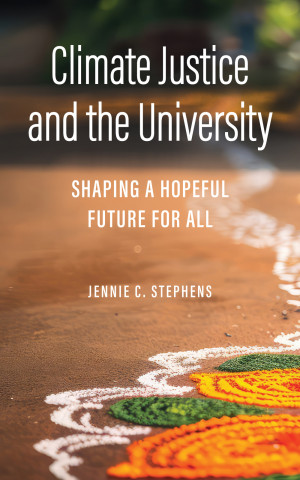
Jennie C. Stephens
edited by Maggie Debelius, Joshua Kim, and Edward Maloney
Doris Iarovici, MD
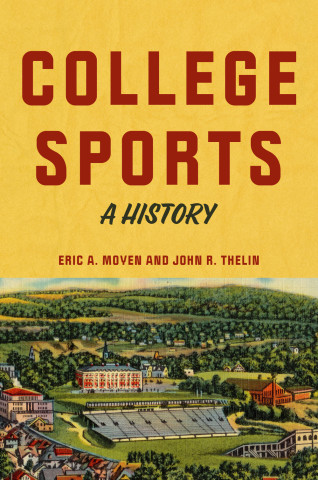
Eric A. Moyen and John R. Thelin
edited by Christopher C. Morphew, Ashley Cureton, and Vanya C. Jones
[The authors] argue that ratings based on reputation reflect yesterday's reality and understate the quality of some universities while overstating others.
Provides a historical perspective on the annual snapshots by such periodicals as U.S. News and World Report ... Fluid, concise, [and] compelling.
An important contribution to our understanding of what actually happened during that amazing period in the history of higher education that began with World War II.
A serious contribution to our knowledge of American research universities. Students and researchers of American higher education will want to read this book, as will public policy makers and administrators.
Book Details
Acknowledgements Introduction Chapter 1. Origins of the American Research University Chapter 2. The Revolution in Federal Science Policy Chapter 3. Comparing Universities in the Golden Decade of the 1960s
Acknowledgements Introduction Chapter 1. Origins of the American Research University Chapter 2. The Revolution in Federal Science Policy Chapter 3. Comparing Universities in the Golden Decade of the 1960s Chapter 4. The Stagnant Decade Revisited: Research Universities Adjust to the 1970s Chapter 5. The Golden Age Redux: Federal Funding and Academic Research in the 1980s Chapter 6. The Public Research Universities Chapter 7. The Private Research Universities and Rising Institutions Conclusion Appendix A: Institutional Data for 203 Research Universities Appendix B: Per Capita Scores for 203 Research Universities Note on Method and Sources Notes Index
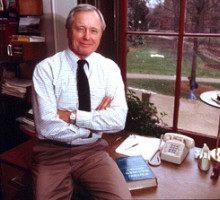
Hugh Davis Graham
Nancy diamond.
with Hopkins Press Books


URA is a not-for-profit 501(c)(3) academic consortium composed of over 94 premier research universities across the United States, United Kingdom, Italy, and Japan headquartered in Washington, D.C. supporting government lab management and operation in the national interest.
- Leadership & Management
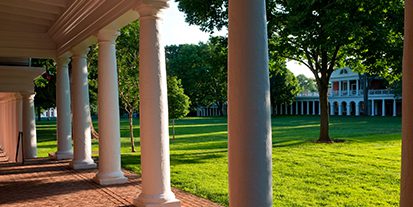
Member Universities
URA fosters valuable university research partnerships through membership. URA presents members with research opportunities at national engineering and physics labs, engagement with laboratory leadership and management, and recognition of academic achievements.
- Member Universities Map
- Become a Member
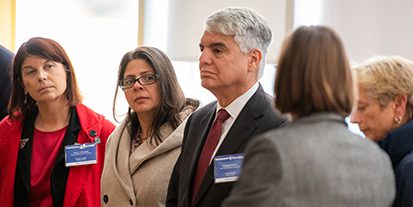
Lab Management
Since 1965 URA has been an integral part of the management of Fermilab, overseeing the management and operations of the lab and bringing the expertise of our 94 member universities to bear on the challenges facing the Fermilab. URA supports scholars and interns doing research at Fermilab and recognizes outstanding contributions. In 2007 URA became part of the organization that manages and operates Sandia National Laboratories and since then has worked to support the scientific and technical demands of Sandia by supporting external calibration of science, technology and engineering (ST&E) programs; aid in ST&E programs’ strategic planning; and assist in development of university partnerships and diverse workforce talent.
- Sandia National Lab
- Pierre Auger Observatory
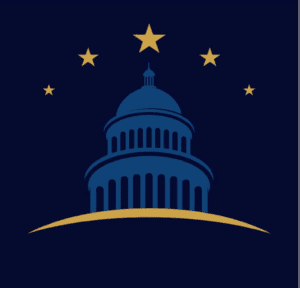
Science & Research Policy
URA strives to engender an awareness of the current national science policy issues among its members and early career scientists. This is achieved through a variety of platforms at URA, including science policy and communication training, connecting scientists and policymakers, and policy town halls and workshops. URA’s goal is to facilitate effective science communication to promote the public’s understanding of scientific discoveries, foster trust in scientific institutions, and facilitate informed decision-making by policymakers and the public.
- Women in STEM
- Research Policy Forums
- Council of Presidents Policy Forum

High Energy Physics User Community
URA has been a supporter, convener, and integral part of the high energy physics User Community since Fermilab’s creation. Currently approximately seventy-five percent of the university-based users at Fermilab come from URA members. URA members represent the best scientific expertise the nation has to offer. Through our leadership, oversight, and programs URA is committed to ensuring that the full range of expertise from around the Nation and the world contributes to Fermilab’s scientific challenges and the user and affiliate community remains the vital part of the lab’s research base that it has always been.
- URA Early Career Award
- URA Engineering Award
- URA Doctoral Thesis Award
- URA Tollestrup Award for Postdoctoral Research
- HEP Visit to Capitol Hill
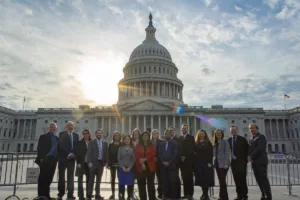
STEM & Research Initiatives
URA is investing in STEM workforce development to contribute to the broader national STEM research ecosystem. Our fellowships, internships, and awards for undergraduate and graduate students and early career scientists serve as a conduit for STEM talent between universities and Fermi and Sandia National Laboratories. URA believes that a skilled workforce drives innovation, enhances national security, maintains technological competitiveness, cultivates future talent, and fosters collaborative research efforts, ultimately contributing to scientific advancement and societal progress.
- URA Visiting Scholars Program
- URA-Sandia Graduate Student Summer Fellowship
- URA-Fermilab Undergraduate Women in STEM Internship
- SPARC: Science Policy & Advocacy for Research Competition
For over 50 years, the Universities Research Association has engaged in laboratory management and continues to contribute to the national science enterprise through management and operating (M&O) contracts with the Department of Energy. Today, URA participates in key partnerships and M&O contracts which include the Fermi Research Alliance, National Technology and Engineering Solutions of Sandia (NTESS), and the National Science Foundation.
Early history.
The Universities Research Association (URA) was founded in 1965 by a cohort of 34 universities across the U.S. to “provide a national basis” for the management and operation of the proposed 200 GeV proton accelerator. This project emerged from recommendations on behalf of the scientific community to expand the frontiers of high-energy physics research. Norman Ramsey, who later became URA’s first president, directed a joint panel in 1963 of the President’s Science Advisory Committee and the General Advisory Committee of the Atomic Energy Commission. This panel recommended the construction of a proton accelerator. The panel also emphasized the importance of national representation for the accelerator and an administrative structure that encompassed national interests.
Following the panel’s recommendation, designs for the accelerator were initiated by Lawrence Radiation Laboratory and completed in 1965. Next, the Atomic Energy Commission began its twenty-month-long search for a laboratory site to house the accelerator. The Atomic Energy Commission received 126 proposals suggesting almost 200 site locations in 46 different states. In 1966, the AEC selected 6,800 acres in Weston, Illinois, for the project.
It was suggested that a “truly national laboratory” would house the accelerator, later referred to as the Tevatron, to promote equal consideration of experiments and access to its users based on scientific merit. These needs laid the foundation for the Universities Research Association and the creation of Fermi National Accelerator Laboratory.
Fermilab and the Tevatron
Fermilab was home to the Tevatron which operated from 1983 until 2011. It was the first particle accelerator to reach energies up to 1TeV — hence its name— the Tevatron enabled the discovery of the Top Quark, the most massive of the Standard Model fermions. Since the shutdown of the Tevatron in 2011, experiments using particle beams produced in Fermilab’s accelerators continue to explore the fundamental nature of matter, energy, space, and time, and their relationships in the physical universe.
Fermilab and the Large Hadron Collider (LHC)
The next generation on the energy frontier began with the initiation of the Large Hadron Collider (LHC) at the CERN facility outside of Geneva, Switzerland, now the world’s high-energy accelerator for elementary particle physics research. Fermilab was a full partner in the construction of the LHC that announced the discovery of the long-sought Higgs Boson in 2012, which was previously hinted at in final Tevatron data. Today, the LHC Remote Operations Center at Fermilab keeps U.S. scientists and technicians closely connected to activities at the LHC and Fermilab continues to participate in the upgrade of the LHC’s capabilities.
Today, as a consortium of over 94 academic institutions across the United States, Japan, Canada, and Italy. URA aims to pair the academic expertise of its members with national laboratories to foster scientific innovation. For over 50 years, URA has operated in the national interest by generating a STEM talent pipeline to associated laboratories; promoting university-laboratory partnerships; and communicating the needs of academic institutions and laboratories to key science policymakers. URA’s partnering laboratories currently include Fermi National Accelerator Laboratory, Sandia National Laboratories, and Pierre Auger Observatory.

- University of Wisconsin–Madison
- University of Wisconsin-Madison
- Research Guides
- Introduction to Historical Research
Introduction to Historical Research : Home
- Archival sources
- Multimedia sources
- Newspapers and other periodicals
- Biographical Information
- Government documents
Subject-Specialist Librarians
There are librarians on campus that can help you with your specific area of research.
Subject Librarian Directory Subject-specialist/ liaison librarians are willing to help you with anything from coming up with research strategies to locating sources.
Ask a Librarian
or click for more options ...
This guide is an introduction to selected resources available for historical research. It covers both primary sources (such as diaries, letters, newspaper articles, photographs, government documents and first-hand accounts) and secondary materials (such as books and articles written by historians and devoted to the analysis and interpretation of historical events and evidence).
"Research in history involves developing an understanding of the past through the examination and interpretation of evidence. Evidence may exist in the form of texts, physical remains of historic sites, recorded data, pictures, maps, artifacts, and so on. The historian’s job is to find evidence, analyze its content and biases, corroborate it with further evidence, and use that evidence to develop an interpretation of past events that holds some significance for the present.
Historians use libraries to
- locate primary sources (first-hand information such as diaries, letters, and original documents) for evidence
- find secondary sources (historians’ interpretations and analyses of historical evidence)
- verify factual material as inconsistencies arise"
( Research and Documentation in the Electronic Age, Fifth Edition, by Diana Hacker and Barbara Fister, Bedford/St. Martin, 2010)
This guide is meant to help you work through these steps.
Other helpful guides
This is a list of other historical research guides you may find helpful:
- Learning Historical Research Learning to Do Historical Research: A Primer for Environmental Historians and Others by William Cronon and his students, University of Wisconsin A website designed as a basic introduction to historical research for anyone and everyone who is interested in exploring the past.
- Reading, Writing, and Researching for History: A Guide for College Students by Patrick Rael, Bowdoin College Guide to all aspects of historical scholarship—from reading a history book to doing primary source research to writing a history paper.
- Writing Historical Essays: A Guide for Undergraduates Rutgers History Department guide to writing historical essays
- History Study Guides History study guides created by the Carleton College History Department

- Next: Books >>
- Last Updated: Mar 4, 2024 12:48 PM
- URL: https://researchguides.library.wisc.edu/introhist
Please enable JavaScript in your web browser to get the best experience.

Welcome to the Institute of Historical Research
The Institute of Historical Research is the UK's national centre for history, dedicated to supporting historians of all kinds.
Subscribe to the IHR Bulletin
Stay up-to-date with events, research training, publications, library and research news from the Institute of Historical Research
Centre for the History of People, Place and Community
CHPPC fosters engaged, innovative research into placed histories across all regions and periods, from the rural to the urban and the parish to the metropolis.
History & Policy
Promotes better public policy through a greater understanding of history,
Library & Digital
Home to one of the world's greatest open-shelf collections of primary works, reference materials, bibliographical and archival guides. As well as BHO & BBIH.
Search the IHR Wohl Library Catalogue

History+ Humanities for Mid-Career Academics
Join us on the 1 May at the in Manchester as we explore the challenges that mid-career scholars are facing. Limited bursaries available to enable attendance.

Library user survey
Please help us improve our services by completing our annual survey to let us know your views about the library. Survey closes on 12 April 2024

Writing Trade History: an IHR - Curtis Brown Initiative
Catch up on the Writing for Trade History workshop with Curtis Brown and find out how to apply for the 20 June in-person workshop at the IHR.

IHR London Summer School 2024 | Rivers
Bookings are now open for the July 2024 Summer School.
The Veale-Straschnov Doctoral Studentships
Are you aged 25 or over and interested in doing a PhD in History? The IHR has two full-funded studentships available for students beginning in Autumn 2023.

Sign up for the IHR's monthly e-bulletin
Our monthly news update covers what's going on and what's coming up at the IHR. It's delivered at the end of each month by email.
From our blog - On History
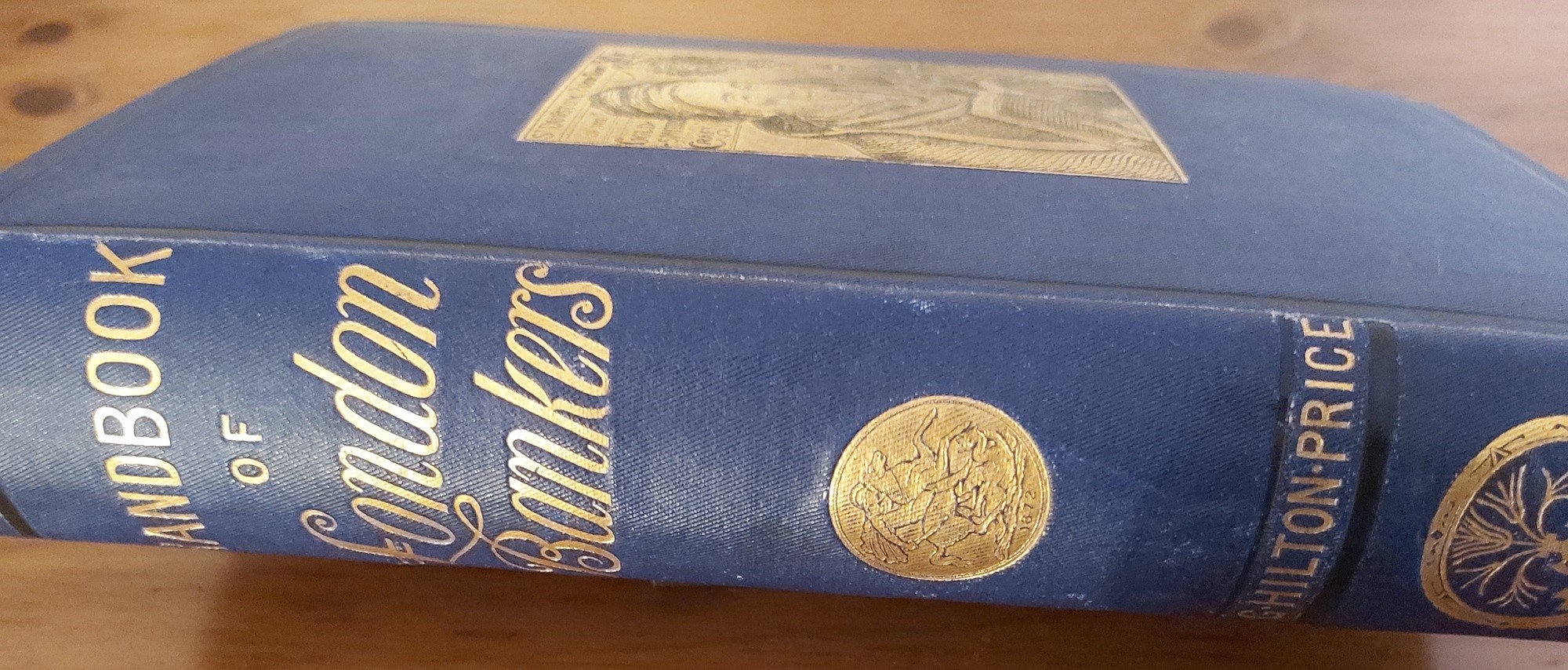
Using the Bibliography of British and Irish History (BBIH) as a PhD researc…
In this blog, PhD student Phil Winterbottom reflects on the ways in which he has used BBIH as a tool to help him develop his historiographical knowledge and kee…
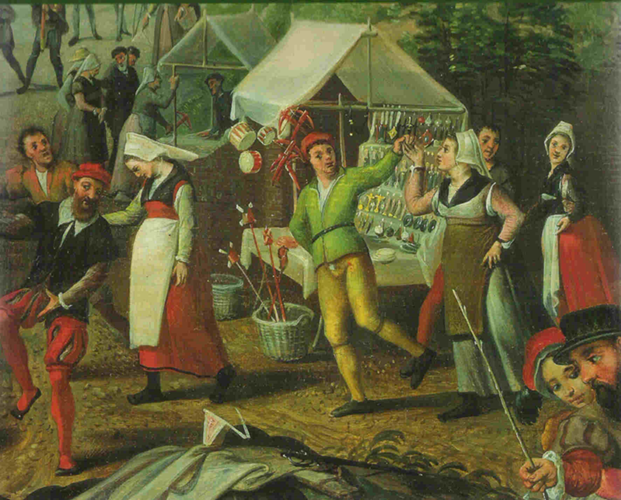
Glimpses of a Transnational Life: Frank Mathew and Imports of Everyday Good…
The IHR’s Centre for the History of People, Place and Community has been carrying out some exploratory research on the potential of analysing London’s…
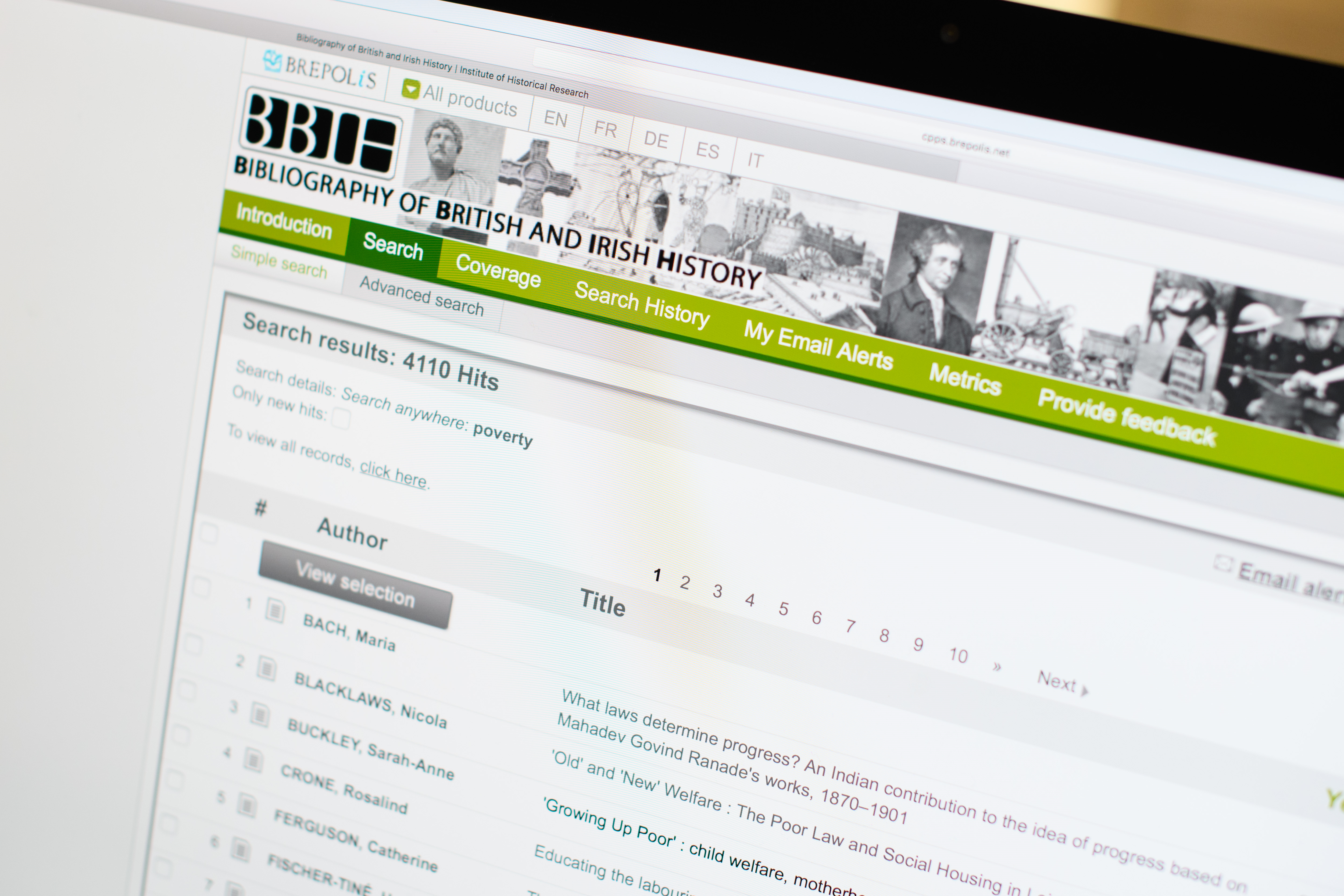
Bibliography of British and Irish History February 2024 update
What’s new in BBIH? The February 2024 update to the Bibliography of British and Irish History adds 4,115 new publications. The new update includes books,…

New LGBTQ+ History acquisitions in the IHR library
This blog post was written by Sophia Benko, Graduate Trainee Library Assistant at the IHR Wohl Library. At the core of LGBTQ+ History Month is a desire to …
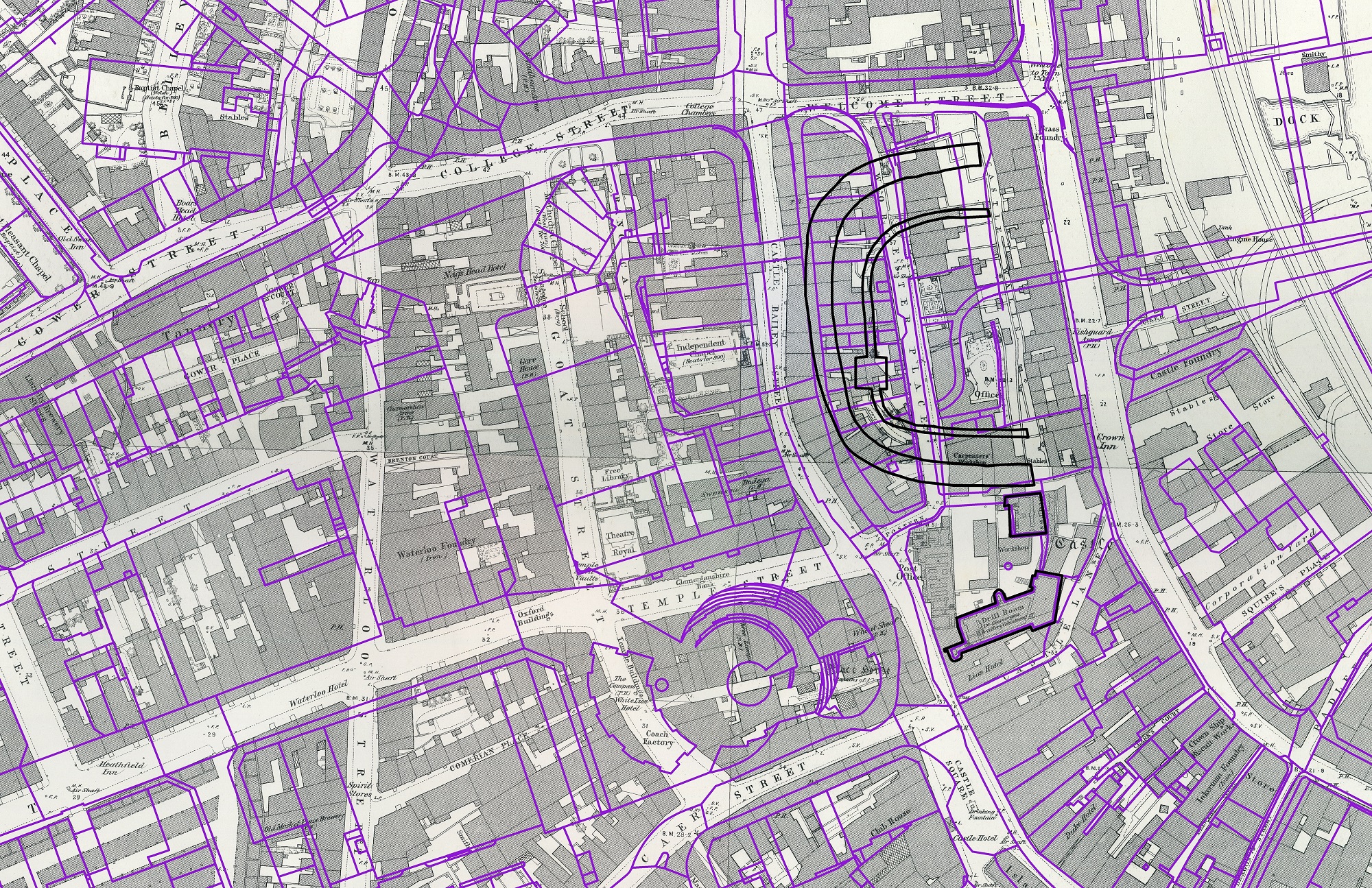
Victoria County History Smartphone App: Retirement
In early 2020 we launched our VCH smartphone app, ‘A History of English Places’. It had been developed through a project funded internally by the University of …

Paternosters and Beads: Finding Devotional Objects in the London Customs Ac…
The IHR’s Centre for the History of People, Place and Community has been carrying out some exploratory research on the potential of analysing London’s medieval …

Uncovering Hidden Labour in the Victoria County History (VCH) Archive
In this blog post Adam Chapman (VCH General Editor) and Ruth Slatter (VCH Architectural Editor) explore the VCH Westmorland archive and reflect on how it helps …
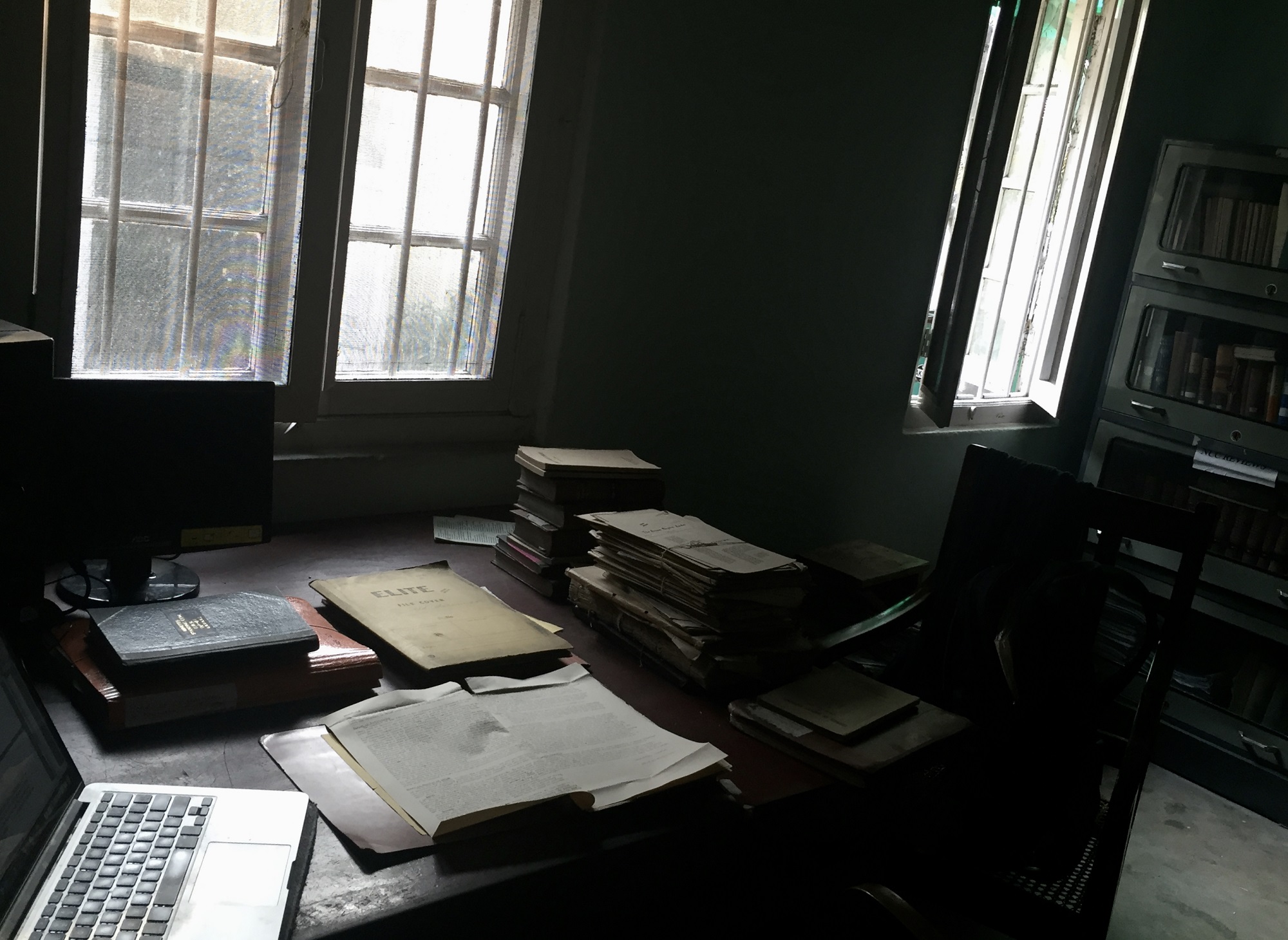
Building a Non-State Archive
Activist, social, political, and insurgent movements are non-state actors who lack a state archive. Their networked activities craft a non-state archive, made u…

Invitation: Bibliography of British and Irish History (BBIH) editorial board membership
Would you like to help shape BBIH and help us include more diverse voices and perspectives in what we do? Read the full article for details.

Call for Section Editors: Bibliography of British and Irish History (BBIH)
BBIH seeks to appoint 2 new Section Editors. Read the full article for details.

History Day 2023
This year 64 organisations joined us to celebrate and explore library, museum, archive and history collections from across the UK and beyond.

Celebrating 400 years of Shakespeare's First Folio
The School of Advanced Study and Senate House Library have announced an exciting programme of activities to mark the 400th anniversary of the First Folio.
What we do & why we matter
Our Strategy, 2020-2025
Learn more about our strategy as we embark on the IHR's second century of serving as a national home for historians.
Our Mission
The Institute of Historical Research is the UK's national centre for history. Learn more about our mission, our values and our vision for the future.
Our projects and resources

British History Online
British History Online is a digital library of key printed primary and secondary sources for the history of Britain and Ireland.

Layers of London
Layers of London is a groundbreaking crowd-sourced mapping project that records the rich layers of London's heritage.

Historical Research
Historical Research is the IHR's academic journal. Founded in 1923, it is a leading peer-reviewed journal with an international readership and reputation.
Bibliography of British and Irish History
The Bibliography of British and Irish History (BBIH) is the most extensive guide available to what's been published on British and Irish history.
Victoria County History
The Victoria County History is one of the world's longest-running research projects, exploring England's rich local history.

The Windrush Scandal in a Transnational and Commonwealth Context
This research project seeks, for the first time, to produce a scholarly examination of the so-called ‘Windrush Scandal’ within a fully transnational framework.

Reviews in History
Reviews in History is the IHR's online reviews service. It provides specialist commentaries on the latest historical books, exhibitions and digital resources.

Open Access Publishing
The IHR is committed to developing Open Access (OA) publishing for historians. Titles in a range of IHR series appear as OA from first publication.
Best Research Universities for History Degrees
The best history research universities are those with rich histories of influence, proven through the work produced by the program’s faculty and alumni. Beyond demonstrating scholarly impact in the field, the best history degree programs maximize your opportunities to interact with outstanding history faculty.
Top 10 Research Universities History Programs
Harvard university, yale university, columbia university, stanford university, princeton university, university of chicago, university of california, berkeley, university of pennsylvania, university of michigan, cornell university, massachusetts institute of technology.
- University of Texas at Austin 31%
- University of Florida 23%
- University of Virginia 19%
- University of Michigan 18%
- University of North Carolina at Chapel Hill 17%
- University of Notre Dame 13%
- New York University 12%
- University of Southern California 12%
- Georgetown University 12%
- University of California, Berkeley 11%
- University of California, Berkeley 19 to 1
- University of Texas at Austin 18 to 1
- University of California, Los Angeles 18 to 1
- University of North Carolina at Chapel Hill 17 to 1
- University of Florida 16 to 1
- University of Virginia 15 to 1
- University of Michigan 12 to 1
- Georgetown University 11 to 1
- University of Southern California 9 to 1
- Cornell University 9 to 1
- Columbia University $66,139
- Brown University $65,146
- University of Southern California $64,726
- University of Chicago $64,260
- Northwestern University $63,468
- University of Pennsylvania $63,452
- Cornell University $63,200
- Duke University $62,688
- Dartmouth College $62,658
- Yale University $62,250
- University of Chicago $65,145
- University of Southern California $63,468
- Brown University $62,680
- Dartmouth College $60,687
- Johns Hopkins University $60,480
- Duke University $60,220
- University of Notre Dame $59,644
- Massachusetts Institute of Technology $57,590
- Princeton University $57,410
- Georgetown University $56,592
University of North Carolina at Chapel Hill
University of texas at austin, dartmouth college, university of florida, university of virginia, university of southern california, university of notre dame, northwestern university, georgetown university, johns hopkins university, brown university.
- Harvard University 3%
- Massachusetts Institute of Technology 4%
- Columbia University 4%
- Stanford University 4%
- Brown University 5%
- University of Chicago 5%
- Yale University 5%
- Duke University 6%
- Dartmouth College 6%
- Princeton University 6%
- Massachusetts Institute of Technology 3 to 1
- University of Chicago 5 to 1
- Stanford University 5 to 1
- Princeton University 5 to 1
- Columbia University 6 to 1
- Duke University 6 to 1
- Northwestern University 6 to 1
- Brown University 6 to 1
- Yale University 6 to 1
- Johns Hopkins University 6 to 1
- University of Florida $4,477
- University of North Carolina at Chapel Hill $7,019
- University of California, Los Angeles $11,564
- University of California, Berkeley $11,564
- University of Texas at Austin $11,698
- University of Michigan $17,454
- University of Virginia $18,059
- Harvard University $57,261
- Massachusetts Institute of Technology $57,986
- University of North Carolina at Chapel Hill $10,552
- University of Florida $10,770
- University of California, Los Angeles $11,700
- University of California, Berkeley $11,700
- University of Texas at Austin $12,036
- University of Virginia $18,382
- University of Michigan $25,894
- Cornell University $29,500
- New York University $37,332
- University of Pennsylvania $39,838
A bachelor’s degree in history is an excellent starting point for a career in education, government consultation, journalism, and a host of other stimulating fields. As a history major, you’ll study philosophy, literature, language, and a number of other related fields. Your history degree will incorporate an array of humanities as well as foundational courses in the history of Western and Eastern Civilizations, ancient history, and contemporary history. The best schools for history are those which are regionally accredited, which offer a full array of history concentrations, and which give you the chance to work with the best and most influential professors and classmates.
Degree popularity: History bachelor’s degrees are the 39th most popular undergraduate degrees across all student demographics, ranking much higher for men at 24th. It’s most popular among white and Hispanic men, for whom it ranks 18th and 26th respectively, according to the number of degree earners reported by the National Center for Educational Statistics .
Featured Programs
Frequently asked questions about history bachelor’s degrees, what can i do with a history major.
A history major can provide you with the essential skills to succeed in a wide range of professional settings. As a history major, you will learn how to conduct research, cite your sources, and report on your findings. These are essential skills for finding and verifying information in life and work.
Moreover, the way we read and interpret history has a direct consequence on our everyday lives, from the way it informs behavior and policy to the way we preserve traditions and practice rituals.This means that those who tell history have enormous influence over the present day. Today, top influencers in history are exploring the connections between the environment and folk traditions [Link to https://academicinfluence.com/people/simon-schama]; the scope of human history through a macro-historical lens [Link to https://academicinfluence.com/people/yuval-noah-harari], what historian David Christian calls “Big History,” and much more.
Is history a good major?
History feels like a particularly excellent major during these times of social and political upheaval. When dramatic events like wars, natural disasters, and pandemics alter our way of life, the changes can be shocking and difficult to navigate. But those with a deeper understanding of history recognize the patterns that have played out across generations. History majors often have a better sense of preparedness for such events, and a willingness to adapt as changes inevitably occur. During a time when our economic, labor market, and society are in major flux, those with a degree in history are in a unique position to understand the events around us, and make informed professional and personal choices based on this specialized insight.
What courses will I take as a history major?
Once you’ve declared your major in history, you will likely be required to complete a set of core courses in a number of related subject areas. While your concentration will give you a chance to choose from a wide range of highly-specialized history electives, there are a several common courses that most history majors will be required to take, including:
- State, society and the individual in the non-western world
- Rome to Renaissance: Introduction to the Middle Ages
- Conflict and Identity in Modern Europe
- Ancient Greek History
- Intro to East Asian Civilization
- Early Russian History
- Political History of Contemporary Africa
- Colonial Cities of the Americas
What jobs can I do with a history major?
History majors not only qualify for highly specialized roles in education, publishing and academia, but majoring in history will provide you with a number of valuable workplace skills. As such, your history major can lead to a wide range of career opportunities, including these top jobs:
- History Teachers, Postsecondary
- Archivists, Curators, Museum Workers
- Park Rangers
- News Analysts, Reporters, and Journalists
If you think a liberal arts college may be a better fit for you, see our ranking of the best liberal arts colleges for a bachelor’s in history .
- #1 Best Universities in the World 2024
- #1 50 Best Private Grad Schools 2024
- #2 50 Best Private Colleges and Universities for Undergrads 2024
- #2 50 Best Colleges and Universities Ranked for Undergrads in 2024
- #2 50 Best Research Universities Ranked for Undergrads in 2024
- #8 America's 15 Most Technologically Advanced Colleges
- #1 The Most Influential Universities and Colleges Ranked by State 2024
- #1 Best Colleges in Massachusetts 2024
- #1 Best Grad Schools in Massachusetts 2024
- #1 Best Private Colleges in Massachusetts 2024
- #1 Best Research Universities in Massachusetts 2024
- #1 Best Research Universities for Psychology Degrees
- #1 Best Research Universities for English Degrees
- #1 Best Research Universities for Anthropology Degrees
- #1 Best Research Universities for Religious Studies Degrees
- #1 Best Research Universities for Political Science Degrees
- #1 Best Research Universities for Sociology Degrees
- #1 Best Research Universities for Earth Sciences Degrees
- #1 Best Research Universities for Physics Degrees
- #1 Best Research Universities for Philosophy Degrees
- #1 Best Research Universities for Chemistry Degrees
- #1 Best Research Universities for Biology Degrees
- #1 Best Research Universities for Math Degrees
- #1 Best Research Universities for Economics Degrees
- #3 Best Research Universities for Engineering Degrees
- #3 Best Research Universities for Computer Science Degrees
- #2 Guide to Free Online Courses for MBA Students in 2024
- #1 Best Schools in the World for Earning an MBA Degree Ranked for 2024
- #1 The Best Traditional MBA Programs Ranked for Students in 2024
- #7 The Fastest Traditional MBA Degree Programs Ranked for 2024
Tuition + fees
Student body
Median SAT/ACT

Career Outlook for History degree at Harvard University
Harvard University’s faculty and alumni have been influential in:
- Political Science
- Communications
Most Influential Alumni
- Jacques Derrida
- William James
- Noam Chomsky
- Charles Sanders Peirce
- T. S. Eliot
- Norbert Wiener
- Marvin Minsky
- Daniel Dennett
- Ralph Waldo Emerson
- Willard Van Orman Quine
- Paul Samuelson
- Hilary Putnam
Harvard University History Majors
- Joint concentrations in Ancient History (Greek & Roman)
- East Asian History
- Near Eastern History
- African and African American History
- History and Anthropology
- #7 50 Best Colleges and Universities Ranked for Undergrads in 2024
- #7 Best Universities in the World 2024
- #7 50 Best Research Universities Ranked for Undergrads in 2024
- #11 15 Colleges with the Happiest Freshmen
- #1 Best Private Colleges in Connecticut 2024
- #1 Best Colleges in Connecticut 2024
- #1 Best Research Universities in Connecticut 2024
- #1 Best Grad Schools in Connecticut 2024
- #2 Best Research Universities for Religious Studies Degrees
- #2 Best Research Universities for Philosophy Degrees
- #3 Best Research Universities for Psychology Degrees
- #3 Best Research Universities for English Degrees
- #3 Best Research Universities for Political Science Degrees
- #3 Best Research Universities for Biology Degrees
- #4 Best Research Universities for Anthropology Degrees
- #5 Best Research Universities for Sociology Degrees
- #5 Best Research Universities for Economics Degrees
- #6 Best Research Universities for Earth Sciences Degrees
- #7 Best Research Universities for Engineering Degrees
- #7 Best Research Universities for Chemistry Degrees
- #8 Best Research Universities for Math Degrees
- #9 Best Research Universities for Computer Science Degrees
- #10 Best Research Universities for Physics Degrees
- #2 Top 20 Best Business Schools for MBAs Ranked for Students
- #7 Best Schools in the World for Earning an MBA Degree Ranked for 2024
- #12 The Fastest Traditional MBA Degree Programs Ranked for 2024
Career Outlook for History degree at Yale University
Yale University’s faculty and alumni have been influential in:
- Religious Studies
- Anthropology
- Richard Rorty
- Harold Bloom
- Judith Butler
- Josiah Willard Gibbs
- Murray Gell-Mann
- Thorstein Veblen
- Alvin Plantinga
- Fredric Jameson
- Alan Dershowitz
- Grace Hopper
- Lawrence Lessig
- W. Edwards Deming
Yale University History Majors
- BA History – The Global Track
- BA History – The Specialist Track
- Combined BA/MA degree program
- History of Science Medicine and Public Health
- #6 Best Universities in the World 2024
- #7 America's 15 Most Technologically Advanced Colleges
- #8 50 Best Private Colleges and Universities for Undergrads 2024
- #8 50 Best Colleges and Universities Ranked for Undergrads in 2024
- #8 50 Best Research Universities Ranked for Undergrads in 2024
- #1 Best Research Universities in New York 2024
- #1 Best Colleges in New York 2024
- #1 Best Grad Schools in New York 2024
- #1 Best Private Colleges in New York 2024
- #1 Best Research Universities for Education Degrees
- #2 Best Research Universities for English Degrees
- #2 Best Research Universities for Business Degrees
- #2 Best Research Universities for Political Science Degrees
- #2 Best Research Universities for Sociology Degrees
- #2 Best Research Universities for Nursing Degrees
- #4 Best Research Universities for Religious Studies Degrees
- #4 Best Research Universities for Earth Sciences Degrees
- #4 Best Research Universities for Philosophy Degrees
- #5 Best Research Universities for Psychology Degrees
- #5 Best Research Universities for Engineering Degrees
- #5 Best Research Universities for Biology Degrees
- #6 Best Research Universities for Anthropology Degrees
- #6 Best Research Universities for Chemistry Degrees
- #7 Best Research Universities for Computer Science Degrees
- #7 Best Research Universities for Math Degrees
- #7 Best Research Universities for Economics Degrees
- #8 Best Research Universities for Physics Degrees
- #1 11 Fastest Accelerated Online Master’s of Computer Science
- #1 Fastest Accelerated Online Computer Science Doctorates (PhDs)
- #1 Most Affordable Online Computer Science PhDs (Doctorates) 2024
- #1 Online Colleges That Start Anytime and the Benefits of a Self-Paced Education
- #5 Guide to Free Online Courses for MBA Students in 2024
- #9 Top 10 Most Affordable English PhD Programs (Doctorates) 2024
- #1 Top 20 Best Business Schools for MBAs Ranked for Students
- #4 Best Schools in the World for Earning an MBA Degree Ranked for 2024
- #4 The Best Traditional MBA Programs Ranked for Students in 2024
- #13 The Fastest Traditional MBA Degree Programs Ranked for 2024
Career Outlook for History degree at Columbia University
Columbia University’s faculty and alumni have been influential in:
- Social Work
- Milton Friedman
- Herbert Marcuse
- Murray Rothbard
- Stephen Jay Gould
- Carl Rogers
- Kenneth Arrow
- B. R. Ambedkar
- Isaac Asimov
- Robert Nozick
- Margaret Mead
- Thomas Sowell
- Jerry Fodor
Columbia University History Major
- #4 50 Best Private Colleges and Universities for Undergrads 2024
- #4 50 Best Colleges and Universities Ranked for Undergrads in 2024
- #4 50 Best Research Universities Ranked for Undergrads in 2024
- #5 Best Universities in the US Ranked for Prospective Students in 2024
- #1 Best Colleges in California 2024
- #1 Best Private Colleges in California 2024
- #1 Best Research Universities in California 2024
- #1 Best Grad Schools California 2024
- #1 Best Research Universities for Communications Degrees
- #2 Best Research Universities for Psychology Degrees
- #2 Best Research Universities for Engineering Degrees
- #2 Best Research Universities for Computer Science Degrees
- #2 Best Research Universities for Biology Degrees
- #3 Best Research Universities for Anthropology Degrees
- #3 Best Research Universities for Earth Sciences Degrees
- #3 Best Research Universities for Chemistry Degrees
- #4 Best Research Universities for English Degrees
- #4 Best Research Universities for Political Science Degrees
- #4 Best Research Universities for Physics Degrees
- #4 Best Research Universities for Math Degrees
- #6 Best Research Universities for Sociology Degrees
- #6 Best Research Universities for Philosophy Degrees
- #6 Best Research Universities for Economics Degrees
- #7 Best Research Universities for Religious Studies Degrees
- #1 Best Online Master's Programs in California 2024
- #2 The Best Traditional MBA Programs Ranked for Students in 2024
- #9 Best Schools in the World for Earning an MBA Degree Ranked for 2024
- #22 The Fastest Traditional MBA Degree Programs Ranked for 2024
Career Outlook for History degree at Stanford University
Stanford University’s faculty and alumni have been influential in:
- Computer Science
- Engineering
- Mathematics
- Allen Newell
- Douglas Hofstadter
- Sandra Day O'Connor
- Hans Moravec
- John Harsanyi
- Gérard Debreu
- Rodney Brooks
- Anthony Kennedy
- Stuart J. Russell
- Garrett Hardin
- Stewart Brand
Stanford University History Majors
- General History
- Global Affairs and World History
- History, Philosophy, and the Arts
- History of Science and Medicine
- History and Law
- Public History / Public Service
- #7 Best Universities in the US Ranked for Prospective Students in 2024
- #7 50 Best Graduate Schools Ranked for Prospective Students in 2024
- #8 Best Universities in the World 2024
- #12 15 Colleges with the Happiest Freshmen
- #13 America's 15 Most Technologically Advanced Colleges
- #1 Best Private Colleges in New Jersey 2024
- #1 Best Grad Schools in New Jersey 2024
- #1 Best Colleges in New Jersey 2024
- #1 Best Research Universities in New Jersey 2024
- #2 Best Research Universities for Math Degrees
- #3 Best Research Universities for Physics Degrees
- #3 Best Research Universities for Philosophy Degrees
- #4 Best Research Universities for Economics Degrees
- #5 Best Research Universities for English Degrees
- #5 Best Research Universities for Political Science Degrees
- #6 Best Research Universities for Religious Studies Degrees
- #6 Best Research Universities for Engineering Degrees
- #6 Best Research Universities for Computer Science Degrees
- #7 Best Research Universities for Psychology Degrees
- #7 Best Research Universities for Sociology Degrees
- #7 Best Research Universities for Earth Sciences Degrees
- #10 Best Research Universities for Anthropology Degrees
- #10 Best Research Universities for Chemistry Degrees
- #8 The Fastest Traditional MBA Degree Programs Ranked for 2024
Career Outlook for History degree at Princeton University
Princeton University’s faculty and alumni have been influential in:
- Richard Feynman
- Alonzo Church
- Robert Mueller
- Edward Witten
- John McCarthy
- John Bardeen
- Edward Said
- Gary Becker
Princeton University History Major
- #7 50 Best Private Grad Schools 2024
- #8 50 Best Graduate Schools Ranked for Prospective Students in 2024
- #10 Best Universities in the World 2024
- #1 Best Colleges in Illinois 2024
- #1 Best Research Universities in Illinois 2024
- #1 Best Grad Schools Illinois 2024
- #1 Best Private Colleges in Illinois 2024
- #2 Best Research Universities for Anthropology Degrees
- #3 Best Research Universities for Religious Studies Degrees
- #3 Best Research Universities for Sociology Degrees
- #3 Best Research Universities for Economics Degrees
- #5 Best Research Universities for Earth Sciences Degrees
- #5 Best Research Universities for Philosophy Degrees
- #6 Best Research Universities for English Degrees
- #6 Best Research Universities for Political Science Degrees
- #6 Best Research Universities for Math Degrees
- #7 Best Research Universities for Physics Degrees
- #8 Best Research Universities for Psychology Degrees
- #9 Best Research Universities for Biology Degrees
- #11 Best Research Universities for Chemistry Degrees
- #14 Best Research Universities for Computer Science Degrees
- #16 Best Research Universities for Engineering Degrees
- #5 Best Schools in the World for Earning an MBA Degree Ranked for 2024
- #11 The Best Traditional MBA Programs Ranked for Students in 2024
- #16 The Fastest Traditional MBA Degree Programs Ranked for 2024
Career Outlook for History degree at University of Chicago
University of Chicago’s faculty and alumni have been influential in:
- Herbert A. Simon
- Joseph Stiglitz
- James Watson
- Martin Gardner
- George Lakoff
- John B. Watson
- Philip Roth
University of Chicago History Majors
- History – Research / Thesis Track
- History – Capstone Track
- History – Colloquium Track
- #2 Best Universities in the US Ranked for Prospective Students in 2024
- #2 Top Schools that Offer Free Master's Degrees Online
- #4 50 Best Graduate Schools Ranked for Prospective Students in 2024
- #5 Best Universities in the World 2024
- #16 50 Best Research Universities Ranked for Undergrads in 2024
- #18 50 Best Colleges and Universities Ranked for Undergrads in 2024
- #1 Best Public Colleges California 2024
- #1 Most Affordable Colleges in California 2024
- #2 The Most Influential Universities and Colleges Ranked by State 2024
- #2 Best Colleges in California 2024
- #2 Best Research Universities in California 2024
- #2 Best Grad Schools California 2024
- #2 Best Research Universities for Social Work Degrees
- #3 Best Research Universities for Communications Degrees
- #4 Best Research Universities for Engineering Degrees
- #4 Best Research Universities for Sociology Degrees
- #4 Best Research Universities for Chemistry Degrees
- #4 Best Research Universities for Computer Science Degrees
- #5 Best Research Universities for Anthropology Degrees
- #5 Best Research Universities for Math Degrees
- #6 Best Research Universities for Physics Degrees
- #7 Best Research Universities for English Degrees
- #7 Best Research Universities for Political Science Degrees
- #7 Best Research Universities for Philosophy Degrees
- #8 Best Research Universities for Earth Sciences Degrees
- #8 Best Research Universities for Biology Degrees
- #8 Best Research Universities for Economics Degrees
- #9 Best Research Universities for Psychology Degrees
- #9 Best Research Universities for Religious Studies Degrees
- #1 Best Online History Doctorate Degree Programs (PhDs) 2024
- #1 Top 3 Best Online Economics PhD Degree Programs (Doctorates)
- #1 Top 5 Best Online Sociology PhD Degree Programs (Doctorates) 2024
- #2 Fastest Accelerated Online Computer Science Doctorates (PhDs)
- #2 Most Affordable Online Computer Science PhDs (Doctorates) 2024
- #2 Top 5 Best Online English PhD Degree Programs (Doctorates)
- #2 Top 8 Best Online Public Health PhD Degree Programs (Doctorates)
- #3 Top 6 Best Online Clinical Nutrition PhD Degree Programs (Doctorates)
- #4 Guide to Free Online Courses for MBA Students in 2024
- #6 Best Schools in the World for Earning an MBA Degree Ranked for 2024
- #9 The Best Traditional MBA Programs Ranked for Students in 2024
Career Outlook for History degree at University of California, Berkeley
University of California, Berkeley’s faculty and alumni have been influential in:
- Earth Sciences
- Daniel Kahneman
- John Kenneth Galbraith
- Timothy Leary
- Shing-Tung Yau
- Ken Thompson
- Niklaus Wirth
- Douglas Engelbart
- Theodosius Dobzhansky
- Betty Friedan
- George Dantzig
- Octavio Paz
- Gary Snyder
University of California, Berkeley History Majors
- Concentrations by Period, Geography, or Theme
- #12 50 Best Research Universities Ranked for Undergrads in 2024
- #13 50 Best Private Colleges and Universities for Undergrads 2024
- #13 50 Best Colleges and Universities Ranked for Undergrads in 2024
- #14 Best Universities in the World 2024
- #1 Best Research Universities in Pennsylvania 2024
- #1 Best Colleges in Pennsylvania 2024
- #1 Best Private Colleges in Pennsylvania 2024
- #1 Best Grad Schools in Pennsylvania 2024
- #1 Best Research Universities for Business Degrees
- #1 Best Research Universities for Social Work Degrees
- #1 Best Research Universities for Nursing Degrees
- #2 Best Research Universities for Communications Degrees
- #4 Best Research Universities for Psychology Degrees
- #7 Best Research Universities for Anthropology Degrees
- #7 Best Research Universities for Biology Degrees
- #8 Best Research Universities for Engineering Degrees
- #9 Best Research Universities for Sociology Degrees
- #9 Best Research Universities for Chemistry Degrees
- #9 Best Research Universities for Economics Degrees
- #10 Best Research Universities for Political Science Degrees
- #11 Best Research Universities for English Degrees
- #11 Best Research Universities for Religious Studies Degrees
- #11 Best Research Universities for Physics Degrees
- #12 Best Research Universities for Computer Science Degrees
- #12 Best Research Universities for Math Degrees
- #14 Best Research Universities for Philosophy Degrees
- #15 Best Research Universities for Earth Sciences Degrees
- #1 Top 50 Best No GRE Online PhD Degree Programs (Doctorates)
- #1 Most Affordable Online Criminology Doctorate Programs (PhDs)
- #3 Guide to Free Online Courses for MBA Students in 2024
- #3 Fastest Accelerated Online Computer Science Doctorates (PhDs)
- #3 Most Affordable Online Computer Science PhDs (Doctorates) 2024
- #7 Top 15 Most Affordable Online Social Work PhDs (Doctorates)
- #3 The Best Traditional MBA Programs Ranked for Students in 2024
- #6 Top 20 Best Business Schools for MBAs Ranked for Students
- #10 Best Schools in the World for Earning an MBA Degree Ranked for 2024
- #10 The Fastest Traditional MBA Degree Programs Ranked for 2024
Career Outlook for History degree at University of Pennsylvania
University of Pennsylvania’s faculty and alumni have been influential in:
- Martin Seligman
- James McKeen Cattell
- John Backus
- Eric S. Raymond
- Paul R. Ehrlich
- J. Presper Eckert
University of Pennsylvania History Majors
- Concentrations by Region or Thematic area
- #4 Top Schools that Offer Free Master's Degrees Online
- #9 Best Universities in the US Ranked for Prospective Students in 2024
- #11 50 Best Graduate Schools Ranked for Prospective Students in 2024
- #11 Best Universities in the World 2024
- #22 50 Best Research Universities Ranked for Undergrads in 2024
- #1 Best Research Universities in Michigan 2024
- #1 Best Colleges in Michigan 2024
- #1 Best Grad Schools in Michigan 2024
- #1 Most Affordable Colleges in Michigan 2024
- #1 Best Public Colleges in Michigan 2024
- #2 Best Research Universities for Education Degrees
- #4 Best Research Universities for Business Degrees
- #5 Best Research Universities for Nursing Degrees
- #6 Best Research Universities for Psychology Degrees
- #6 Best Research Universities for Communications Degrees
- #8 Best Research Universities for Anthropology Degrees
- #8 Best Research Universities for Sociology Degrees
- #10 Best Research Universities for Computer Science Degrees
- #11 Best Research Universities for Engineering Degrees
- #11 Best Research Universities for Philosophy Degrees
- #11 Best Research Universities for Math Degrees
- #11 Best Research Universities for Economics Degrees
- #12 Best Research Universities for English Degrees
- #12 Best Research Universities for Political Science Degrees
- #13 Best Research Universities for Earth Sciences Degrees
- #13 Best Research Universities for Physics Degrees
- #13 Best Research Universities for Chemistry Degrees
- #13 Best Research Universities for Biology Degrees
- #14 Best Research Universities for Religious Studies Degrees
- #1 Best Online MBA Programs in Michigan
- #1 Best Online Master's Programs in Michigan 2024
- #1 Best Online Master’s in Health Science
- #1 Best Online MBA Degree Programs No GRE Required Ranked for 2024
- #1 Top 8 Best Online Public Health PhD Degree Programs (Doctorates)
- #1 Fastest Online Master's Degrees Ranked for Students in 2024
- #2 Best Online History Doctorate Degree Programs (PhDs) 2024
- #2 Top 10 Best Online Communications PhD Degree Programs (Doctorates)
- #2 Best Online Master's Programs 2024
- #2 Top 5 Best Online Sociology PhD Degree Programs (Doctorates) 2024
- #3 Top 3 Best Online Economics PhD Degree Programs (Doctorates)
- #3 Top 5 Best Online English PhD Degree Programs (Doctorates)
- #4 Top 6 Best Online Clinical Nutrition PhD Degree Programs (Doctorates)
- #6 Guide to Free Online Courses for MBA Students in 2024
- #5 The Best Traditional MBA Programs Ranked for Students in 2024
Career Outlook for History degree at University of Michigan
University of Michigan’s faculty and alumni have been influential in:
- Claude Shannon
- Arthur Miller
- Edgar F. Codd
- Hans-Hermann Hoppe
- Stephen Smale
- Urie Bronfenbrenner
- John Henry Holland
- Amos Tversky
- Marshall Sahlins
University of Michigan History Majors
- Major or Minor History
- Teacher Certification in History
- #15 Top 15 Best Online Colleges for Transfer Students in 2024
- #15 50 Best Research Universities Ranked for Undergrads in 2024
- #16 Best Universities in the World 2024
- #17 50 Best Private Colleges and Universities for Undergrads 2024
- #17 50 Best Colleges and Universities Ranked for Undergrads in 2024
- #3 Best Research Universities in New York 2024
- #3 Best Colleges in New York 2024
- #3 Best Grad Schools in New York 2024
- #3 Best Private Colleges in New York 2024
- #5 Best Research Universities for Business Degrees
- #8 Best Research Universities for Communications Degrees
- #8 Best Research Universities for Chemistry Degrees
- #8 Best Research Universities for Computer Science Degrees
- #9 Best Research Universities for Engineering Degrees
- #9 Best Research Universities for Earth Sciences Degrees
- #9 Best Research Universities for Physics Degrees
- #9 Best Research Universities for Philosophy Degrees
- #10 Best Research Universities for English Degrees
- #10 Best Research Universities for Sociology Degrees
- #10 Best Research Universities for Biology Degrees
- #10 Best Research Universities for Math Degrees
- #10 Best Research Universities for Economics Degrees
- #11 Best Research Universities for Political Science Degrees
- #12 Best Research Universities for Anthropology Degrees
- #13 Best Research Universities for Psychology Degrees
- #13 Best Research Universities for Religious Studies Degrees
- #1 Best Online Master’s in Engineering Management
- #1 Best Online Master’s in Engineering
- #2 Best Online Master's Programs in New York 2024
- #2 Best Online Master's in Management
- #4 Fastest Online Master's Degrees Ranked for Students in 2024
- #4 Top 20 Best Business Schools for MBAs Ranked for Students
- #10 The Best Traditional MBA Programs Ranked for Students in 2024
- #17 The Fastest Traditional MBA Degree Programs Ranked for 2024
Career Outlook for History degree at Cornell University
Cornell University’s faculty and alumni have been influential in:
- Thomas Pynchon
- Abraham Maslow
- Thomas Nagel
- Sheldon Glashow
- Anthony Fauci
- Francis Fukuyama
- Ruth Bader Ginsburg
- Steven Weinberg
- Leonard Susskind
- Gayatri Chakravorty Spivak
Cornell University History Majors
- History Major
- History Minor
- Interdisciplinary Minor in the History of Capitalism
- Independent Research
- #19 50 Best Colleges and Universities Ranked for Undergrads in 2024
- #24 Best Universities in the US Ranked for Prospective Students in 2024
- #24 50 Best Graduate Schools Ranked for Prospective Students in 2024
- #1 Best Research Universities in Rhode Island 2024
- #1 Best Colleges in Rhode Island 2024
- #1 Best Private Colleges in Rhode Island 2024
- #1 Best Grad Schools in Rhode Island 2024
- #6 Best Research Universities for Education Degrees
- #8 Best Research Universities for Business Degrees
- #9 Best Research Universities for English Degrees
- #11 Best Research Universities for Communications Degrees
- #13 Best Research Universities for Anthropology Degrees
- #13 Best Research Universities for Computer Science Degrees
- #14 Best Research Universities for Math Degrees
- #16 Best Research Universities for Political Science Degrees
- #16 Best Research Universities for Sociology Degrees
- #16 Best Research Universities for Earth Sciences Degrees
- #16 Best Research Universities for Philosophy Degrees
- #17 Best Research Universities for Biology Degrees
- #17 Best Research Universities for Economics Degrees
- #18 Best Research Universities for Religious Studies Degrees
- #18 Best Research Universities for Physics Degrees
- #19 Best Research Universities for Psychology Degrees
- #21 Best Research Universities for Engineering Degrees
- #24 Best Research Universities for Chemistry Degrees
- #1 Best Online Master's Programs in Rhode Island 2024
- #19 The Fastest Traditional MBA Degree Programs Ranked for 2024
Career Outlook for History degree at Brown University
Brown University’s faculty and alumni have been influential in:
- Janet Yellen
- Peter Norvig
- Richard Holbrooke
- Andy Hertzfeld
- Jacob M. Appel
- S. T. Joshi
- Lester Frank Ward
- Randy Pausch
- Jeffrey Eugenides
- David Lodge
Brown University History Major
Duke university.
- #13 50 Best Research Universities Ranked for Undergrads in 2024
- #14 50 Best Private Colleges and Universities for Undergrads 2024
- #14 50 Best Colleges and Universities Ranked for Undergrads in 2024
- #16 50 Best Graduate Schools Ranked for Prospective Students in 2024
- #20 Best Universities in the US Ranked for Prospective Students in 2024
- #24 Best Universities in the World 2024
- #1 Best Grad Schools in North Carolina 2024
- #1 Best Christian Colleges in North Carolina 2024
- #1 Best Research Universities in North Carolina 2024
- #1 Best Private Colleges in North Carolina 2024
- #1 Best Colleges in North Carolina 2024
- #4 Best Research Universities for Nursing Degrees
- #4 Best Research Universities for Education Degrees
- #5 Best Research Universities for Religious Studies Degrees
- #9 Best Research Universities for Anthropology Degrees
- #10 Best Research Universities for Philosophy Degrees
- #11 Best Research Universities for Psychology Degrees
- #11 Best Research Universities for Sociology Degrees
- #11 Best Research Universities for Biology Degrees
- #13 Best Research Universities for Political Science Degrees
- #13 Best Research Universities for Economics Degrees
- #14 Best Research Universities for English Degrees
- #14 Best Research Universities for Earth Sciences Degrees
- #16 Best Research Universities for Physics Degrees
- #16 Best Research Universities for Computer Science Degrees
- #16 Best Research Universities for Math Degrees
- #17 Best Research Universities for Engineering Degrees
- #18 Best Research Universities for Chemistry Degrees
- #1 Guide to Free Online Courses for MBA Students in 2024
- #1 Best Online Master's Programs in North Carolina 2024
- #1 Best Online MBA Programs in North Carolina
- #1 Best Online Master's in Nursing MSN
- #1 Best Online Christian Colleges and Universities for Master's Degrees
- #1 Fastest Online Doctoral Degree Programs Ranked for Students in 2024
- #3 Best Online Master's Programs 2024
- #4 Top 50 Best No GRE Online PhD Degree Programs (Doctorates)
- #5 Best Online Master's in Management
- #6 Fastest Online Master's Degrees Ranked for Students in 2024
- #9 Top 20 Best Business Schools for MBAs Ranked for Students
- #14 The Fastest Traditional MBA Degree Programs Ranked for 2024
- #15 The Best Traditional MBA Programs Ranked for Students in 2024
Career Outlook for History degree at Duke University
Duke University’s faculty and alumni have been influential in:
- Jerome Bruner
- Fred Brooks
- Charlie Rose
- John W. Campbell
- Paul Farmer
- Russell Kirk
- David G. Bromley
- Michael Tomasello
- Peter J. Denning
- Charles Tart
Duke University History Major
- Bachelor of Arts in History
- #3 50 Best Private Grad Schools 2024
- #3 50 Best Research Universities Ranked for Undergrads in 2024
- #4 Best Universities in the World 2024
- #8 Best Universities in the US Ranked for Prospective Students in 2024
- #2 Best Colleges in Massachusetts 2024
- #2 Best Grad Schools in Massachusetts 2024
- #2 Best Private Colleges in Massachusetts 2024
- #2 Best Research Universities in Massachusetts 2024
- #1 Best Research Universities for Engineering Degrees
- #1 Best Research Universities for Computer Science Degrees
- #2 Best Research Universities for Earth Sciences Degrees
- #2 Best Research Universities for Physics Degrees
- #2 Best Research Universities for Chemistry Degrees
- #2 Best Research Universities for Economics Degrees
- #3 Best Research Universities for Business Degrees
- #3 Best Research Universities for Math Degrees
- #4 Best Research Universities for Biology Degrees
- #5 Best Research Universities for Communications Degrees
- #8 Best Research Universities for Philosophy Degrees
- #9 Best Research Universities for Political Science Degrees
- #10 Best Research Universities for Psychology Degrees
- #13 Best Research Universities for English Degrees
- #15 Best Research Universities for Sociology Degrees
- #17 Best Research Universities for Anthropology Degrees
- #3 Top 20 Best Business Schools for MBAs Ranked for Students
- #6 The Best Traditional MBA Programs Ranked for Students in 2024
- #8 Best Schools in the World for Earning an MBA Degree Ranked for 2024
- #11 The Fastest Traditional MBA Degree Programs Ranked for 2024
Career Outlook for History degree at Massachusetts Institute of Technology
Massachusetts Institute of Technology’s faculty and alumni have been influential in:
- Paul Krugman
- Richard Stallman
- Ben Bernanke
- William Shockley
- Vannevar Bush
- Lawrence Summers
MIT History Major
- Bachelor of Science in History
University of California, Los Angeles
- #10 America's 15 Most Technologically Advanced Colleges
- #13 50 Best Graduate Schools Ranked for Prospective Students in 2024
- #14 Best Universities in the US Ranked for Prospective Students in 2024
- #17 Best Universities in the World 2024
- #2 Best Public Colleges California 2024
- #2 Most Affordable Colleges in California 2024
- #3 The Most Influential Universities and Colleges Ranked by State 2024
- #3 Best Colleges in California 2024
- #3 Best Research Universities in California 2024
- #3 Best Grad Schools California 2024
- #6 Best Research Universities for Nursing Degrees
- #8 Best Research Universities for Education Degrees
- #9 Best Research Universities for Business Degrees
- #10 Best Research Universities for Communications Degrees
- #11 Best Research Universities for Anthropology Degrees
- #12 Best Research Universities for Sociology Degrees
- #12 Best Research Universities for Earth Sciences Degrees
- #12 Best Research Universities for Chemistry Degrees
- #13 Best Research Universities for Math Degrees
- #14 Best Research Universities for Psychology Degrees
- #14 Best Research Universities for Engineering Degrees
- #14 Best Research Universities for Physics Degrees
- #14 Best Research Universities for Biology Degrees
- #15 Best Research Universities for English Degrees
- #15 Best Research Universities for Philosophy Degrees
- #16 Best Research Universities for Economics Degrees
- #17 Best Research Universities for Computer Science Degrees
- #18 Best Research Universities for Political Science Degrees
- #21 Best Research Universities for Religious Studies Degrees
- #4 Best Online History Doctorate Degree Programs (PhDs) 2024
- #4 Top 3 Best Online Economics PhD Degree Programs (Doctorates)
- #4 Top 5 Best Online English PhD Degree Programs (Doctorates)
- #4 Top 5 Best Online Sociology PhD Degree Programs (Doctorates) 2024
- #14 The Best Traditional MBA Programs Ranked for Students in 2024
Career Outlook for History degree at University of California, Los Angeles
University of California, Los Angeles’s faculty and alumni have been influential in:
- Elinor Ostrom
- Judea Pearl
- Glenn T. Seaborg
- Barry Boehm
- Stanley Cavell
- William F. Sharpe
- John Ehrlichman
- Stephen Krashen
- Edward O. Thorp
- Stephen Kosslyn
University of California, Los Angeles History Major
New york university.
- #23 50 Best Research Universities Ranked for Undergrads in 2024
- #2 Best Research Universities in New York 2024
- #2 Best Colleges in New York 2024
- #2 Best Grad Schools in New York 2024
- #2 Best Private Colleges in New York 2024
- #3 Best Research Universities for Social Work Degrees
- #3 Best Research Universities for Education Degrees
- #7 Best Research Universities for Communications Degrees
- #7 Best Research Universities for Business Degrees
- #8 Best Research Universities for English Degrees
- #8 Best Research Universities for Nursing Degrees
- #12 Best Research Universities for Psychology Degrees
- #12 Best Research Universities for Philosophy Degrees
- #12 Best Research Universities for Economics Degrees
- #14 Best Research Universities for Sociology Degrees
- #15 Best Research Universities for Anthropology Degrees
- #15 Best Research Universities for Religious Studies Degrees
- #15 Best Research Universities for Political Science Degrees
- #15 Best Research Universities for Math Degrees
- #18 Best Research Universities for Computer Science Degrees
- #18 Best Research Universities for Biology Degrees
- #23 Best Research Universities for Engineering Degrees
- #23 Best Research Universities for Physics Degrees
- #1 20 Best Online Master's of Speech Pathology Degree Programs
- #1 Best Online Master's Programs in New York 2024
- #1 Best Online Master's in Management
- #1 Top 10 Best Online Communications PhD Degree Programs (Doctorates)
- #1 Top 5 Best Online English PhD Degree Programs (Doctorates)
- #1 Best Online Master's Programs 2024
- #2 Top 3 Best Online Economics PhD Degree Programs (Doctorates)
- #2 Top 6 Best Online Clinical Nutrition PhD Degree Programs (Doctorates)
- #3 Top 10 Best Online Counseling PhD Degree Programs (Doctorates)
- #3 Best Online History Doctorate Degree Programs (PhDs) 2024
- #3 Top 5 Best Online Sociology PhD Degree Programs (Doctorates) 2024
- #3 Fastest Online Master's Degrees Ranked for Students in 2024
- #5 Top 20 Best Business Schools for MBAs Ranked for Students
- #7 The Best Traditional MBA Programs Ranked for Students in 2024
Career Outlook for History degree at New York University
New York University’s faculty and alumni have been influential in:
- Erich Fromm
- Martha Nussbaum
- John Archibald Wheeler
- Glenn Greenwald
- Howard Zinn
- Eric Kandel
- Lewis Mumford
- Alvin Toffler
- Louis Nirenberg
New York University History Majors
- The Major in History
- Global Liberal Studies Double Major (only for GLS students)
- Global Public Health Joint Major
- Minor in Native American and Indigenous Studies
- Minor in Science and Society
- Minor in South Asian Studies
- BA/MA Program
- #14 50 Best Graduate Schools Ranked for Prospective Students in 2024
- #17 50 Best Private Grad Schools 2024
- #1 Best Grad Schools in Maryland 2024
- #1 Best Private Colleges in Maryland 2024
- #1 Best Research Universities in Maryland 2024
- #1 Best Colleges in Maryland 2024
- #3 Best Research Universities for Nursing Degrees
- #6 Best Research Universities for Biology Degrees
- #11 Best Research Universities for Earth Sciences Degrees
- #12 Best Research Universities for Physics Degrees
- #14 Best Research Universities for Political Science Degrees
- #15 Best Research Universities for Psychology Degrees
- #15 Best Research Universities for Engineering Degrees
- #15 Best Research Universities for Chemistry Degrees
- #15 Best Research Universities for Economics Degrees
- #16 Best Research Universities for Anthropology Degrees
- #17 Best Research Universities for Math Degrees
- #18 Best Research Universities for English Degrees
- #18 Best Research Universities for Sociology Degrees
- #19 Best Research Universities for Philosophy Degrees
- #22 Best Research Universities for Computer Science Degrees
- #1 Best Online MBA Programs in Maryland
- #1 Best Online Master’s in Health Informatics
- #1 Best Online Master's Programs in Maryland 2024
- #1 Best Online Master’s in Sustainability and Green Technologies
- #1 Top 10 Best Online MBA in Economics Degree Programs Ranked in 2024
- #1 Best Online Master's in Organizational Leadership
- #1 Best Online Master's in Economics
- #2 The Best Online MBA Degree Programs in 2024 Ranked for Students
- #2 Top 50 Best No GRE Online PhD Degree Programs (Doctorates)
- #2 Best Data Science Online Master’s Programs
- #2 Fastest Online Master's Degrees Ranked for Students in 2024
- #3 Best Online Master’s in Finance
- #4 Fastest Accelerated Online Computer Science Doctorates (PhDs)
- #6 Best Online Master's Programs 2024
- #8 Best Online Master's in Management
- #18 Fastest Accelerated Online Public Health Doctorates (PhDs)
- #22 The Best Traditional MBA Programs Ranked for Students in 2024
Career Outlook for History degree at Johns Hopkins University
Johns Hopkins University’s faculty and alumni have been influential in:
- G. Stanley Hall
- John Mauchly
- Thomas Hunt Morgan
- Gertrude Stein
- Rachel Carson
- Joseph Jastrow
- Robert Fogel
- Richard E. Bellman
- John R. Commons
Johns Hopkins University History Majors
- Accelerated BA/MA at JHU (4-year)
- Dual-degree BA/MA between JHU and Universitat Pompeu Fabra (UPF) in Barcelona
- #16 50 Best Private Grad Schools 2024
- #1 Best Research Universities in DC 2024
- #1 Best Private Colleges in DC 2024
- #1 Best Grad Schools in DC 2024
- #1 Best Christian Colleges in DC 2024
- #1 Best Colleges in DC 2024
- #7 Best Research Universities for Nursing Degrees
- #8 Best Research Universities for Political Science Degrees
- #10 Best Research Universities for Religious Studies Degrees
- #18 Best Research Universities for Philosophy Degrees
- #18 Best Research Universities for Economics Degrees
- #21 Best Research Universities for English Degrees
- #22 Best Research Universities for Sociology Degrees
- #1 Best Online Master's Programs in DC 2024
- #1 Top 20 Most Affordable Online Master's of Nursing Programs
- #13 Top 20 Best Business Schools for MBAs Ranked for Students
- #13 The Best Traditional MBA Programs Ranked for Students in 2024
- #23 The Fastest Traditional MBA Degree Programs Ranked for 2024
Career Outlook for History degree at Georgetown University
Georgetown University’s faculty and alumni have been influential in:
- Criminal Justice
- J. Edgar Hoover
- Antonin Scalia
- George Tenet
- Abdullah II of Jordan
- Steven Novella
- Jerome Powell
- Susan Hockfield
- Solomon H. Snyder
- John R. Allen
Georgetown University History Major
- #16 50 Best Colleges and Universities Ranked for Undergrads in 2024
- #21 Best Universities in the US Ranked for Prospective Students in 2024
- #2 Best Colleges in Illinois 2024
- #2 Best Research Universities in Illinois 2024
- #2 Best Grad Schools Illinois 2024
- #2 Best Private Colleges in Illinois 2024
- #4 Best Research Universities for Communications Degrees
- #6 Best Research Universities for Business Degrees
- #7 Best Research Universities for Education Degrees
- #13 Best Research Universities for Sociology Degrees
- #14 Best Research Universities for Anthropology Degrees
- #14 Best Research Universities for Chemistry Degrees
- #14 Best Research Universities for Economics Degrees
- #17 Best Research Universities for English Degrees
- #17 Best Research Universities for Philosophy Degrees
- #18 Best Research Universities for Psychology Degrees
- #19 Best Research Universities for Religious Studies Degrees
- #19 Best Research Universities for Political Science Degrees
- #19 Best Research Universities for Math Degrees
- #21 Best Research Universities for Physics Degrees
- #22 Best Research Universities for Engineering Degrees
- #23 Best Research Universities for Earth Sciences Degrees
- #25 Best Research Universities for Computer Science Degrees
- #1 Fastest Online Associate Degrees Ranked for 2024
- #1 Best Online Master's in Public Administration Degree Programs
- #2 Best Online Bachelor's in Strategic Communications Degree Programs
- #1 Best College Majors that Offer Accelerated Degree Programs
- #8 The Best Traditional MBA Programs Ranked for Students in 2024
- #11 Best Schools in the World for Earning an MBA Degree Ranked for 2024
- #21 The Fastest Traditional MBA Degree Programs Ranked for 2024
Career Outlook for History degree at Northwestern University
Northwestern University’s faculty and alumni have been influential in:
- Stephen Colbert
- George Stigler
- John Paul Stevens
- Saul Bellow
- Robert Hanssen
- Aaron Director
- Charles W. Morris
- Walter Dill Scott
- J. Gordon Melton
- Alston Scott Householder
- Adam Przeworski
- Joseph Greenberg
Northwestern University History Major
- History Major or Minor
- #1 Best Private Colleges in Indiana 2024
- #3 Best Colleges in Indiana 2024
- #3 Best Research Universities in Indiana 2024
- #3 Best Grad Schools in Indiana 2024
- #8 Best Research Universities for Religious Studies Degrees
- #13 Best Research Universities for Philosophy Degrees
- #14 Best Research Universities for Business Degrees
- #21 Best Research Universities for Sociology Degrees
- #21 Best Research Universities for Chemistry Degrees
- #23 Best Research Universities for Political Science Degrees
- #24 Best Research Universities for Engineering Degrees
- #24 Best Research Universities for Math Degrees
- #6 Top 20 Best Online MBA Programs that Can Be Completed in One Year 2024
- #9 The Fastest Traditional MBA Degree Programs Ranked for 2024
Career Outlook for History degree at University of Notre Dame
University of Notre Dame’s faculty and alumni have been influential in:
- Jacques Maritain
- Orson Scott Card
- E. Jerome McCarthy
- Saskia Sassen
- Condoleezza Rice
- Peter Suber
- Jon Barwise
- Joe Montana
- David H. Barlow
- Eric F. Wieschaus
- Robert Seamans
- Matthew Fox
Unviersity of Notre Dame History Majors
- Geographic concentrations – Eg. US history, modern Europe, Asia, Middle East
- Chronological concentrations – Eg. US Civil War Era, 20th-Century Europe, Global 1960s
- Topical concentrations – Eg. Religious history, labor history, military history, US Civil Rights Movement
- #2 Best Private Colleges in California 2024
- #4 Best Colleges in California 2024
- #4 Best Research Universities in California 2024
- #4 Best Grad Schools California 2024
- #5 The Most Influential Universities and Colleges Ranked by State 2024
- #5 Best Research Universities for Education Degrees
- #9 Best Research Universities for Communications Degrees
- #13 Best Research Universities for Engineering Degrees
- #15 Best Research Universities for Computer Science Degrees
- #16 Best Research Universities for Psychology Degrees
- #16 Best Research Universities for English Degrees
- #17 Best Research Universities for Religious Studies Degrees
- #17 Best Research Universities for Political Science Degrees
- #17 Best Research Universities for Sociology Degrees
- #17 Best Research Universities for Earth Sciences Degrees
- #19 Best Research Universities for Anthropology Degrees
- #19 Best Research Universities for Biology Degrees
- #20 Best Research Universities for Physics Degrees
- #20 Best Research Universities for Chemistry Degrees
- #20 Best Research Universities for Economics Degrees
- #21 Best Research Universities for Philosophy Degrees
- #22 Best Research Universities for Math Degrees
- #1 Top 7 Best Online Social Work PhDs (DSW Programs) 2024
- #1 The Best Online MBA Degree Programs in 2024 Ranked for Students
- #1 Best Online Master’s in Communications
- #1 Best Online Master's in Hospitality and Tourism Degree Programs
- #1 Top 8 Best Online Applied Behavioral Analysis PhDs (Doctorates)
- #1 Best Online Doctorate of Physical Therapy Programs (PhDs)
- #1 Top 20 Best Online Accredited Doctorate Degree Programs (PhDs) 2024
- #1 Best Online Doctorate in Organizational Leadership Degree Programs
- #1 Best Online Doctorate in Education Degree Programs Ranked for Students
- #1 Best Research Universities with Online Doctorates (PhDs) 2024
- #1 Best Data Science Online Master’s Programs
- #1 Best Online Master's in Social Work MSW
- #1 Best Online Master's in Project Management
- #1 Best Online Master’s in Human Resources
- #1 Best Online Master's in Computer Science Degree Programs
- #1 Best Online Master's in Cybersecurity
- #1 Best Online MBA Degree Programs for 2024 with No GMAT Required
- #1 Top 10 Best Online Master's of Public Relations Ranked 2024
- #1 Best Online Master’s in Finance
- #2 Best Online Master’s in Health Informatics
- #2 Best Online Master’s in Sustainability and Green Technologies
- #2 Best Online Master's Programs in California 2024
- #2 Best Online MBA Programs in California
- #2 Best Online Master’s in Engineering Management
- #2 Best Online Master's in Public Administration Degree Programs
- #2 Best Online Master's in Criminal Justice
- #2 Top 18 Most Affordable No GRE Online PhD Degree Programs
- #2 Fastest Online Doctoral Degree Programs Ranked for Students in 2024
- #2 Best Online Master’s in Engineering
- #3 Best Online Master's in Management
- #3 Best Online Master's in Nursing MSN
- #4 Best Online Master's Programs 2024
- #5 Fastest Accelerated Online Computer Science Doctorates (PhDs)
- #5 Top 10 Best Online Communications PhD Degree Programs (Doctorates)
- #5 Top 15 Most Affordable Online Social Work PhDs (Doctorates)
- #5 Fastest Online Master's Degrees Ranked for Students in 2024
- #6 Top 50 Best No GRE Online PhD Degree Programs (Doctorates)
- #12 The Best Traditional MBA Programs Ranked for Students in 2024
Career Outlook for History degree at University of Southern California
University of Southern California’s faculty and alumni have been influential in:
- Frank Gehry
- Neil Armstrong
- Jack L. Warner
- John Mearsheimer
- Boris Podolsky
- Michael D. Griffin
- Maulana Karenga
- O. J. Simpson
- Robert Ballard
University of Southern California History Majors
- BA in History
- BA in History and Social Science Education
- BA in Law History and Culture
- BA in Contemporary Latino and Latin American Studies
- #10 50 Best Public Grad Schools 2024
- #25 Best Universities in the US Ranked for Prospective Students in 2024
- #1 Best Research Universities in Virginia 2024
- #1 Best Public Colleges in Virginia 2024
- #1 Best Colleges in Virginia 2024
- #1 Best Grad Schools in Virginia 2024
- #12 Best Research Universities for Nursing Degrees
- #13 Best Research Universities for Business Degrees
- #20 Best Research Universities for Anthropology Degrees
- #21 Best Research Universities for Psychology Degrees
- #22 Best Research Universities for Political Science Degrees
- #22 Best Research Universities for Philosophy Degrees
- #23 Best Research Universities for English Degrees
- #23 Best Research Universities for Sociology Degrees
- #24 Best Research Universities for Biology Degrees
- #24 Best Research Universities for Economics Degrees
- #1 Best Online Master's Programs in Virginia 2024
- #1 Top 20 Most Affordable Online Doctorate of Education (PhDs)
- #1 Best Online Master's in Special Education
- #6 Best Online Bachelor's in Cybersecurity in Virginia
- #8 Fastest Online Master's Degrees Ranked for Students in 2024
- #10 Guide to Free Online Courses for MBA Students in 2024
- #12 Top 20 Best Business Schools for MBAs Ranked for Students
Career Outlook for History degree at University of Virginia
University of Virginia’s faculty and alumni have been influential in:
- Edgar Allan Poe
- Ronald Coase
- William Faulkner
- Georgia O'Keeffe
- Katie Couric
- Francis Collins
- Anselm Strauss
- Ferid Murad
Unviersity of Virginia History Major
- Capitalism and Economic Life
- Environment, Space and Society
- Global and Transnational History
- Law and Society
- Race, Ethnicity, and Empire
- War, Violence, and Society
- #9 Online Colleges with the Most Generous Financial Aid in 2024
- #16 Most Affordable Colleges and Universities in the U.S. 2024
- #20 Most Affordable Graduate Schools Ranked for 2024
- #24 50 Best Public Grad Schools 2024
- #1 Best Grad Schools in Florida 2024
- #1 Most Affordable Colleges in Florida 2024
- #1 Best Colleges in Florida 2024
- #1 Best Research Universities in Florida 2024
- #1 Best Public Colleges in Florida 2024
- #1 Best Research Universities for Criminal Justice Degrees
- #11 Best Research Universities for Nursing Degrees
- #14 Best Research Universities for Education Degrees
- #15 Best Research Universities for Communications Degrees
- #16 Best Research Universities for Business Degrees
- #21 Best Research Universities for Anthropology Degrees
- #21 Best Research Universities for Earth Sciences Degrees
- #23 Best Research Universities for Chemistry Degrees
- #23 Best Research Universities for Biology Degrees
- #25 Best Research Universities for Engineering Degrees
- #1 Best Online Bachelor's in Anthropology
- #1 Best Online Bachelor's in Biology
- #1 Best Online Master's Programs in Florida 2024
- #1 Best Online Bachelor's in Computer Science Degree Programs
- #1 Best Online Colleges in Florida 2024
- #2 Best Online MBA Programs in Florida
- #2 Best Online Bachelor’s of Digital Media for 2024
- #3 10 Best Online Master's of Music Education Degree Programs
- #4 Top 20 Most Affordable Online Doctorate of Education (PhDs)
- #5 Best Online History Doctorate Degree Programs (PhDs) 2024
- #7 Top 20 Best Online MBA Programs that Can Be Completed in One Year 2024
- #14 Most Affordable Online Applied Behavioral Analysis PhD Programs
- #15 Fastest Accelerated Online Public Health Doctorates (PhDs)
- #19 Top 20 Easiest Online Degrees from Accredited Schools in 2024
- #4 Most Affordable Master's in Counseling Degree Programs Ranked for 2024
- #15 Best Schools in the World for Earning an MBA Degree Ranked for 2024
Career Outlook for History degree at University of Florida
University of Florida’s faculty and alumni have been influential in:
- J. Barkley Rosser
- Marshall Warren Nirenberg
- Paul Tibbets
- Robert Costanza
- Michael Connelly
- Robert H. Grubbs
- Carl Hiaasen
- Gilbert Stork
- Aseem Shukla
- Neil Druckmann
- Norman Thagard
Unviersity of Florida BA History
- Legal History specialization
Unviersity of Florida BA Classical Studies
- Ancient Language
- Classical Civilization
- Modern Greek
- Teacher Certification
- #1 Best Grad Schools in New Hampshire 2024
- #1 Best Private Colleges in New Hampshire 2024
- #1 Best Research Universities in New Hampshire 2024
- #1 Best Colleges in New Hampshire 2024
- #19 Best Research Universities for English Degrees
- #19 Best Research Universities for Sociology Degrees
- #20 Best Research Universities for Political Science Degrees
- #20 Best Research Universities for Earth Sciences Degrees
- #23 Best Research Universities for Economics Degrees
- #24 Best Research Universities for Anthropology Degrees
- #24 Best Research Universities for Religious Studies Degrees
- #24 Best Research Universities for Philosophy Degrees
- #24 Best Research Universities for Computer Science Degrees
- #1 Best Online Master's Programs in New Hampshire 2024
- #18 The Fastest Traditional MBA Degree Programs Ranked for 2024
- #19 Top 20 Best Business Schools for MBAs Ranked for Students
- #24 The Best Traditional MBA Programs Ranked for Students in 2024
Career Outlook for History degree at Dartmouth College
Dartmouth College’s faculty and alumni have been influential in:
- Joseph Campbell
- Robert Frost
- Daniel Webster
- Vincent Canby
- Robert Reich
- C. Everett Koop
- Stuart Kauffman
- Jaegwon Kim
- Robert Christgau
- Michael Gazzaniga
- Edward Norton Lorenz
Dartmouth College History Majors
- Major or Modified Major
- Concentrate by geographic region or time period
- #22 Best Universities in the US Ranked for Prospective Students in 2024
- #23 50 Best Graduate Schools Ranked for Prospective Students in 2024
- #1 Best Grad Schools In Texas 2024
- #1 Best Research Universities in Texas 2024
- #1 Best Public Colleges in Texas 2024
- #1 Most Affordable Colleges in Texas 2024
- #1 Best Colleges in Texas 2024
- #4 Best Research Universities for Social Work Degrees
- #10 Best Research Universities for Business Degrees
- #12 Best Research Universities for Communications Degrees
- #13 Best Research Universities for Nursing Degrees
- #17 Best Research Universities for Physics Degrees
- #18 Best Research Universities for Earth Sciences Degrees
- #19 Best Research Universities for Chemistry Degrees
- #20 Best Research Universities for English Degrees
- #20 Best Research Universities for Engineering Degrees
- #20 Best Research Universities for Philosophy Degrees
- #21 Best Research Universities for Computer Science Degrees
- #21 Best Research Universities for Math Degrees
- #22 Best Research Universities for Psychology Degrees
- #25 Best Research Universities for Anthropology Degrees
- #1 Best Online Master's Programs in Texas 2024
- #2 Top 8 Best Online Applied Behavioral Analysis PhDs (Doctorates)
- #2 Top 20 Best Online MBA Programs that Can Be Completed in One Year 2024
- #3 Best Online Master’s in Engineering Management
- #3 Best Online Master’s in Engineering
- #4 Best Online Master's in Management
- #4 Top 10 Best Online Communications PhD Degree Programs (Doctorates)
- #5 Top 50 Best No GRE Online PhD Degree Programs (Doctorates)
- #5 Best Online Master's Programs 2024
- #11 Top 20 Best Business Schools for MBAs Ranked for Students
- #16 The Best Traditional MBA Programs Ranked for Students in 2024
Career Outlook for History degree at University of Texas at Austin
University of Texas at Austin’s faculty and alumni have been influential in:
- Walter Cronkite
- Bill Moyers
- Edsger W. Dijkstra
- Robert Rauschenberg
- Bruce Sterling
- C. Wright Mills
- Neil deGrasse Tyson
- Steven Best
- J. M. Coetzee
- Robert Taylor
- Abhay Ashtekar
UT Austin History Major
- History and Philosophy of Science Certificate Available
- #17 Most Affordable Colleges and Universities in the U.S. 2024
- #1 Best Public Colleges in North Carolina 2024
- #1 Most Affordable Colleges in North Carolina 2024
- #2 Best Grad Schools in North Carolina 2024
- #2 Best Research Universities in North Carolina 2024
- #2 Best Colleges in North Carolina 2024
- #10 Best Research Universities for Nursing Degrees
- #11 Best Research Universities for Business Degrees
- #11 Best Research Universities for Education Degrees
- #14 Best Research Universities for Communications Degrees
- #20 Best Research Universities for Psychology Degrees
- #20 Best Research Universities for Religious Studies Degrees
- #20 Best Research Universities for Sociology Degrees
- #21 Best Research Universities for Biology Degrees
- #22 Best Research Universities for English Degrees
- #23 Best Research Universities for Philosophy Degrees
- #25 Best Research Universities for Business Degrees
- #25 Best Research Universities for Earth Sciences Degrees
- #25 Best Research Universities for Chemistry Degrees
- #25 Best Research Universities for Math Degrees
- #1 Best Online Master's in Healthcare Administration
- #1 Best Online Master's Degrees in Accounting
- #1 Fastest Accelerated Online Public Health Doctorates (PhDs)
- #1 Fastest Accelerated Online Healthcare Administration Masters
- #2 15 Most Affordable Online Public Health Doctorates (PhDs)
- #2 Best Online Master's Programs in North Carolina 2024
- #2 Best Online Doctorate of Physical Therapy Programs (PhDs)
- #2 Best Online MBA Programs in North Carolina
- #2 Best Online MBA Degree Programs for 2024 with No GMAT Required
- #3 The Best Online MBA Degree Programs in 2024 Ranked for Students
- #3 Best Online Master’s in Health Informatics
- #3 Best Online Master's in Public Administration Degree Programs
- #4 Best Online Master’s in Communications
- #4 Fastest Online Doctoral Degree Programs Ranked for Students in 2024
- #5 Top 20 Best Online MBA Programs that Can Be Completed in One Year 2024
- #7 Guide to Free Online Courses for MBA Students in 2024
- #7 Top 8 Best Online Public Health PhD Degree Programs (Doctorates)
- #8 Best Online MBA Degree Programs No GRE Required Ranked for 2024
- #8 Best Online Master's Programs 2024
- #9 Best Online Master's in Management
- #10 Fastest Online Master's Degrees Ranked for Students in 2024
- #13 Most Affordable Master's in Counseling Degree Programs Ranked for 2024
- #14 Best Schools in the World for Earning an MBA Degree Ranked for 2024
- #20 Top 20 Best Business Schools for MBAs Ranked for Students
Career Outlook for History degree at University of North Carolina at Chapel Hill
University of North Carolina at Chapel Hill’s faculty and alumni have been influential in:
- Lawrence Ferlinghetti
- James E. Webb
- Howard T. Odum
- Jeffrey Beall
- Robert F. Furchgott
- Sidney Powell
- Christine Blasey Ford
- David Brinkley
- James Rachels
UNC Chapel Hill History Majors
- Ancient and Medieval
- Global History
- Politics, Law, and Economy
- Religion, Culture, and Intellectual Life
- War, Revolution, and Society
- Women’s and Gender History
Career Outlook for Students with History Degree
Degree level: bachelor's.
- Location: The U.S. (Private Schools)
- Avg. Cost of Degree*: $10,771
- Avg. Expenses*: $16,613
- Avg. Starting Salary*: $29,610
- Avg. Salary after 4 Years*: $42,686
- Avg. Cost Recoup Time**: 12 years
- Job Growth: 2.26%
- Number of Jobs: 2,326,900
- * denotes ‘annually’
- ** denotes ‘at 15% of annual salary’
Career Salaries
Average career salaries, promising job markets, top industries.
Go to all Research Universities for History programs
The Best History Schools in Your State
Learn more about history.
If you want to know more about history, then check out our related content:
- Learn how to major in history
- Think about your next step and what you can do with a master’s degree in history
- Learn more about history from our interviews with influential historians
- Find out who are the most influential historians today
University of Virginia School of Law
Professors Dig Into Forgotten Legal History on ‘Common Law,’ Yielding New Insights
Photos by Julia Davis, Dan Addison and iStock/Illustration by Warren Craghead
Two professors at the University of Virginia School of Law join the “ Common Law ” podcast to discuss how their differing approaches to researching the past, from the Civil War to the civil rights eras, have uncovered forgotten stories that help us understand today’s legal landscape.
In the season’s fifth episode, released Tuesday, Professors Cynthia Nicoletti and Joy Milligan talk with host Dean Risa Goluboff , who is also a legal historian, about two of their articles that share something in common: both show instances of people and institutions using the law to preserve the status quo against movements that were trying to improve conditions for Black Americans.
Yet the professors took distinctly different paths during the process of researching and writing about legal history. The trio discuss their decisions to focus on institutions versus people, “historical forgetting,” how the present affects our ideas of the past and the pitfalls of bringing historical work to bear on today’s concerns.
Nicoletti, the Paul G. Mahoney Research Professor of Law and a professor of history at UVA, discusses her paper “ William Henry Trescot: Pardon Broker ,” which was published in The Journal of the Civil War Era. The paper won the 2021 George and Ann Richards Prize for the best article published in the journal that year. Trescot, a lawyer and lobbyist for the South Carolina Lowcountry elite whites, helped his clients obtain pardons after the Civil War to avoid having their land redistributed to formerly enslaved people.
Milligan, the Martha Lubin Karsh and Bruce A. Karsh Bicentennial Professor of Law, discusses her paper “ Subsidizing Segregation ,” published in the Virginia Law Review. The article exposes how the federal government played a role in extending racial segregation and discrimination by funding segregated schools up to 10 years after the Brown v. Board of Education decision outlawed “separate but equal” education.
Nicoletti, who earned her Ph.D. in history at UVA in addition to her J.D. from Harvard, is a legal historian focused on the Civil War era. She teaches classes on that subject, and on federalism and property. Her book, “Secession on Trial: The Treason Prosecution of Jefferson Davis,” won the Cromwell Book Prize, which is given each year to an early career scholar in the field of American legal history.
Milligan, who earned her Ph.D. in jurisprudence and social policy at Berkeley, studies the intersection of law and inequality, especially race-based economic inequality. Before becoming a law professor, Milligan practiced civil rights law at the NAACP Legal Defense and Educational Fund as a Skadden Fellow and earned her law degree at New York University.
The podcast’s sixth season, called “Free Exchange,” features guests debating and discussing timely legal topics. The show is available on Apple Podcasts , Stitcher , YouTube , Spotify and other popular podcast platforms. “Common Law” is produced by Emily Richardson-Lorente.
Past seasons have focused on “ The Future of Law ,” “ When Law Changed the World ,” “ Law and Equity ,” and “Co-Counsel” on seasons four and five .
You can follow the show on the website CommonLawPodcast.com or Twitter at @CommonLawUVA .
Founded in 1819, the University of Virginia School of Law is the second-oldest continuously operating law school in the nation. Consistently ranked among the top law schools, Virginia is a world-renowned training ground for distinguished lawyers and public servants, instilling in them a commitment to leadership, integrity and community service.
Mary M. Wood Chief Communications Officer Email
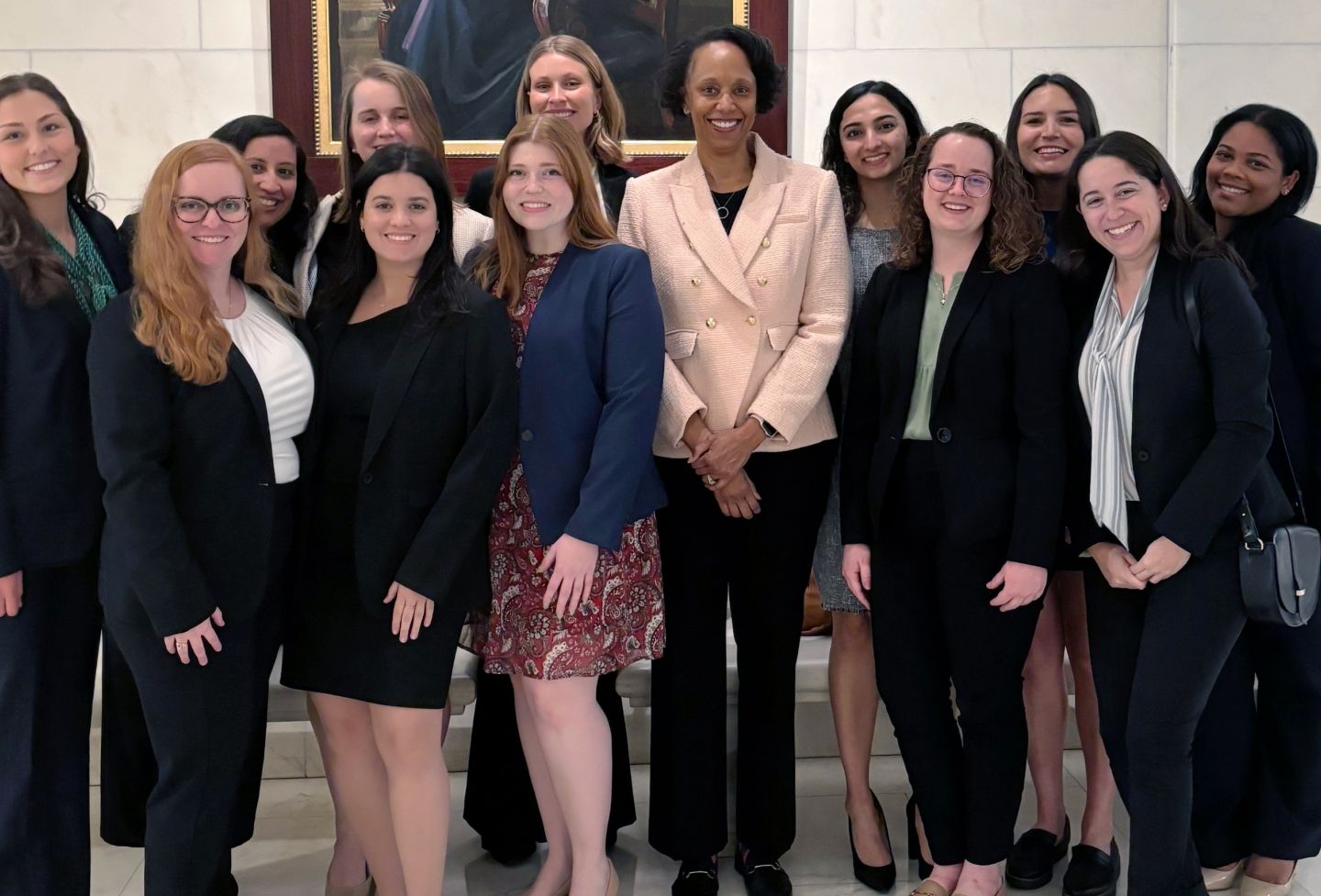
- Academic Calendar
- J.D. Curriculum
- Current Courses
- Concentrations
- Academic Policies
- Study Abroad
- Graduate Studies (LL.M. and S.J.D.)
- Dual-Degree Programs
- Programs and Centers
- Experiential Learning
- Educating Legal Scholars
- Faculty Scholarship
- The Free Exchange of Ideas at UVA Law
- Admissions Process
- J.D. Application Information
- Virginia Residency
- Online Status Checker
- Make Online Seat Deposit
- Transfer Students
- Brochures and Key Websites
- ABA Required Disclosures
- Diversity, Equity and Belonging
- Admitted Students
- Graduate Studies
- Financial Aid
- Karsh-Dillard Scholarships
- Student Organizations
- Academic Journals
- Student Government
- The Honor System
- Living in Charlottesville
- Awards, Fellowships and Honors
- Moot Court and Trial Advocacy
- Legal Writing Fellows
- Student Affairs
- Student Records
- Career Development
- Law IT/Computing
- Courts & Commerce Bookstore
- Employment Resources for Students
- Office of Private Practice Staff
- Resources for Private Practice Employers
- Public Service Center Staff
- Funding for Public Service
- Program in Law and Public Service
- Resources for Public Service Employers
- Office of Judicial Clerkships Staff
- The Pro Bono Program
- About the School
- Facts & Statistics
- Consumer Information (ABA Required Disclosures)
- Event Calendar
- Video & Audio
- Subscribe and Connect
- University of Virginia
You are using an outdated browser. Please upgrade your browser to improve your experience.
University of Reading Cookie Policy
We use cookies on reading.ac.uk to improve your experience. Find out more about our cookie policy . By continuing to use our site you accept these terms, and are happy for us to use cookies to improve your browsing experience.
Continue using the University of Reading website

Landmark book reveals history of women in publishing
11 April 2024

A new book edited by researchers at the University of Reading is the first international collection to explore the often overlooked role of women in publishing over the past 120 years.
Published this month by Edinburgh University Press, The Edinburgh Companion to Women in Publishing explores the diverse and significant impacts women have had in publishing across continents.
Drawing from feminist research, the collection offers a comparative analysis of women’s work in publishing over the past century. It features archival content, new oral histories, and eight interviews with leading women in the industry today to bridge the gap between the past, present and future.
Dr Nicola Wilson, Associate Professor of Book and Publishing Studies at the University of Reading, said: “For too long, the story of publishing has focused narrowly on men. This book gives a voice to the many talented women worldwide whose vital influence on print and publishing cultures has largely gone unrecognised.”
The book combines new work on high-profile women publishers and editors alongside analysis of women’s work as publisher’s readers, translators, illustrators, booksellers, advertisers, and as patrons. With examples ranging from high street book sellers to prestigious publishing houses like Virago Press, it offers a comprehensive and rich history of women in publishing.
The collection goes beyond the English-speaking world to offer a global understanding of women’s involvement in print cultures.
Dr Sophie Heywood, Associate Professor in French at the University of Reading, said: “With this collection, we wanted to present new ways of reading women’s contributions to transatlantic and continental publishing across the twentieth century. We look at examples of women’s publishing efforts from 1900 all the way up to 2020, while also considering what is still needed to further the profession moving forward.”
The Edinburgh Companion to Women in Publishing, 1900–2020 is available now on the Edinburgh University Press website .
Subjects A-B
- Agriculture
- Ancient History
- Anthropology
- Archaeology
- Architecture
- Biochemistry
- Biological Sciences
- Biomedical Engineering
- Biomedical Sciences
- Building and Surveying
- Business and Management
Subjects C-E
- Classics and Classical Studies
- Climate Science
- Computer Science
- Construction Management
- Consumer Behaviour and Marketing
- Creative Writing
- Criminology
- Engineering
- English Language and Applied Linguistics
- English Literature
- Environment
Subjects F-G
- Film & Television
- Foundation programmes
- Graphic Communication and Design
Subjects H-M
- International Development
- International Foundation Programme (IFP)
- International Relations
- Languages and Cultures
- Linguistics
- Mathematics
- Medical Sciences
- Meteorology and Climate
- Microbiology
- Museum Studies
Subjects N-T
- Pharmacology
- Physician Associate Studies
- Politics and International Relations
- Real Estate and Planning
- Speech and Language Therapy
- Surveying and Construction
- Theatre & Performance
Subjects U-Z
- Wildlife Conservation
Subjects A-C
- Business (Post-Experience)
- Business and Management (Pre-Experience)
- Classics and Ancient History
- Construction Management and Engineering
- Consumer Behaviour
- Creative Enterprise
Subjects D-G
- Data Science
- Energy and Environmental Engineering
- Environmental Sciences
- Film, Theatre and Television
- Food and Nutritional Sciences
- Geography and Environmental Science
- Graphic Design
Subjects H-P
- Information Management and Digital Business
- Information Technology
- International Development and Applied Economics
- Physician Associate
- Project Management
- Public Policy
Subjects Q-Z
- Social Policy
- Strategic Studies
- Teacher training
- Typography and Graphic Communication
- War and Peace Studies
- Architectural Engineering
- Bioveterinary Sciences
We are in the process of finalising our postgraduate taught courses for 2025/26 entry. In the meantime, you can view our 2024/25 courses.
7 minute read
Research Universities
Faculty and students, beyond academics, the history of the research university, classifying and ranking research universities.
Research universities are postsecondary institutions that devote a large portion of their mission, resources, and focus to graduate education and research. Currently, there are more than 250 of these institutions in the United States. Research universities such as Harvard, Stanford, Berkeley, and Michigan are often mentioned in the media due to their size, resources, status, and athletic teams. These are among the best-known, but there are many different kinds of research universities.
Research universities in the United States vary according to size, control, focus, selectivity, and the number of degree programs offered. They include public universities, such as the universities of Michigan and Virginia, and private universities, such as Duke University and MIT (Massachusetts Institute of Technology). They range in size from very large universities such as the University of Minnesota, which has almost 60,000 students enrolled at three campuses, to small universities such as Rice University in Houston, which has fewer than 4,500 students. A few research universities are very focused in mission and offer degree programs in specialized areas, such as The Rockefeller University, which offers graduate programs, including a Ph.D., in biomedical sciences only. Others, like Michigan State University, offer a dizzying portfolio of under-graduate and graduate degrees across seventeen colleges and hundreds of undergraduate and graduate degree programs. Some research universities embrace open admissions policies, while others are very selective and admit less than 20 percent of those students that apply.
What all research universities have in common–and what makes them research universities–is an emphasis on graduate education and research. All research universities offer advanced degrees, up to and including the doctorate. Most research universities also enroll a sizeable number of undergraduates in a comprehensive set of bachelor's degree programs.
Faculty and Students
Research universities occupy a unique position within the United States higher education system. For example, unlike students enrolled at liberal arts colleges, undergraduate students attending research universities generally pursue a specialized curriculum with a very large number of requirements for the major and a smaller number of electives and general education requirements. Due to the large size of most research universities, students who attend these institutions are likely to have large lower-division classes, some of which may be taught by graduate students who serve as teaching assistants.
Faculty members at research universities are expected to devote a larger amount of their time to research than are faculty members at liberal arts colleges and comprehensive universities, where the faculty's primary role is that of teacher rather than researcher. At research universities, faculty members are sometimes researchers first and teachers second, and are expected to publish articles and books and secure research grants from external sources.
While these qualities have provoked some criticism of research universities, they remain a very popular option for postsecondary students. As of 1998, for example, research universities enrolled more than one out of every five students attending a college or university in the United States. Research universities also attract a large percentage of the best and brightest students. Annually, research universities enroll the largest numbers of National Merit Scholars. These students are attracted to research universities because of their high-profile faculty members, the prestige associated with these institutions, and their resources, including state-of-the-art labs and technology.
Beyond Academics
The U.S. research university is much more than academics, however. The research university is a far-flung and complex organization with multiple campuses, extension centers, research centers and institutes, multiple campuses, student services and programming for diverse student groups, and often high-profile athletics teams. The Big Ten, Big 12, and PAC-10 athletic conferences consist entirely of research universities, for example. It is not unusual for research universities to establish their own research parks where private companies and the university engage in technology transfer and spin off new businesses. In the early twenty-first century, it is difficult to think of something in which research universities are not involved.
In this sense, Clark Kerr refers to the modern U.S. research university as a "multiversity" and a "community of communities" where the complexity and sheer number of goals the organization strives to achieve creates great specialization and multiple communities of actors who share little in common, except for the fact that they work for the university. Similarly, higher education researchers Michael Cohen and James March refer to research universities as "organized anarchies" where, at times, there appear to be no rules governing the organization, and no recognized leaders, only a sort of chaos that someone familiar with the research university can sort out.
The History of the Research University
The lineage of the U.S. research university can be traced to the great German and English universities and their respective forms and traditions. In fact, throughout most of the nineteenth century, there were no true research universities in the country. It was during the latter portion of the 1800s that several influential higher education leaders, including Daniel Coit Gilman of Johns Hopkins University, William Rainey Harper of the University of Chicago, and G. Stanley Hall of Clark University, established universities devoted to the primacy of research and specialized graduate education. These universities were modeled after the German traditions and structures found at Berlin and Heidelberg, including the graduate seminar and academic freedom ( Lehrfreiheit ). Before this time, earned Ph.D.s were largely unheard of in the United States. These leaders and their universities adopted the Germanic university form, and other universities followed. Soon after the founding of Johns Hopkins, Chicago, and Clark, universities that were founded during the colonial period were adopting and adapting the forms legitimated by Johns Hopkins and others.
Yet the U.S. research university also functions like an English university in many ways. For example, the research university in the United States almost always features a comprehensive undergraduate curriculum with a residential component that is more akin to Oxford and Cambridge than it is to Berlin. Similarly, student development and providing student services occupies a significant focus for U.S. research universities. This is a function of the fact that colonial colleges were organized according to an Oxbridge model, and their graduate education and research functions were superimposed on this existing organizational structure and culture.
Classifying and Ranking Research Universities
Given the variance in the characteristics of research universities, how can the different types of research universities be categorized? Traditionally, this has been accomplished by the Carnegie Foundation for the Advancement of Teaching through its Classification of Institutions. Begun in 1973, and continuing throughout the classifications of 1976, 1987, 1994, and 2000, this scheme categorized all postsecondary institutions in the United Stations. As part of this larger classification, the Carnegie Foundation placed research universities in one of two categories, Research Universities I and Research Universities II, prior to the 2000 classification. Research universities were placed within these two categories depending upon the number of doctorate degrees they awarded and the amount of federal research funding they received. For the 2000 classification, these categories were expanded and renamed Doctoral/Research Universities–Extensive and Doctoral/Research Universities–Intensive, respectively. According to this classification, there are 261 research universities in the United States.
There are other recognized ways of determining what a research university is, and which are of the highest quality. There are organizations such as the Association of American Universities, a prestigious, invitation-only group of sixty-one American and two Canadian universities, all of which are high-quality research universities. Historically, organizations such as the National Research Council have also worked to qualitatively and quantitatively describe the relative quality of research universities and their various academic departments. Most recently, magazines such as U.S. News and World Report have introduced very popular rankings of postsecondary institutions, including research universities. These rankings are quite controversial, however, because of the great weight they place on inputs and reputation, and because they attempt to rank what is arguably a very diverse set of colleges and universities.
See also: C ARNEGIE C LASSIFICATION S YSTEM , T HE ; C OLLEGE R ANKINGS ; H ARVARD U NIVERSITY ; H IGHER E DUCATION IN THE U NITED S TATES ; J OHNS H OPKINS U NIVERSITY ; T EACHING AND R ESEARCH , T HE R ELATIONSHIP BETWEEN ; U NIVERSITY OF C HICAGO ; U NIVERSITY OF V IRGINIA ; Y ALE U NIVERSITY .
BIBLIOGRAPHY
B IRNBAUM , R OBERT. 1980. How Colleges Work. San Francisco: Jossey-Bass.
B RUBACHER , J OHN S., and R UDY , W ILLIS. 1976. Higher Education in Transition: A History of American Colleges and Universities, 1636–1976. New York: Harper and Row.
C LARK , B URTON R. 2001. The Uses of the University. Cambridge, MA: Harvard University Press.
C OHEN , M ICHAEL D., and M ARCH , J AMES G. 1974. Leadership and Ambiguity: The American College President. New York: McGraw-Hill.
C OLE , J ONATHAN R.; B ARBER , E LINOR G.; and G RAUBARD , S TEPHEN R. 1994. The Research University in a Time of Discontent. Baltimore: Johns Hopkins University Press.
G RAHAM , H UGH D., and D IAMOND , N ANCY. 1997. The Rise of American Research Universities. Balti-more: Johns Hopkins University Press.
K ERR , C LARK. 2001. The Uses of the University. Cambridge, MA: Harvard University Press.
L UCAS , C HRISTOPHER J. 1994. American Higher Education: A History. New York: St. Martin's Press.
V EYSEY , L AURENCE R. 1965. The Emergence of the American University. Chicago: University of Chicago Press.
C HRISTOPHER C. M ORPHEW
Additional topics
- Residential Colleges - Defining Residential Colleges and Related Terms, The Classic Residential College, Benefits of Residential Colleges
- Research Misconduct - Policies and Procedures, Definitions, Misconduct Cases, Responsible Conduct of Research, Future Considerations
Education - Free Encyclopedia Search Engine Education Encyclopedia
Help | Advanced Search
Computer Science > Computation and Language
Title: realm: reference resolution as language modeling.
Abstract: Reference resolution is an important problem, one that is essential to understand and successfully handle context of different kinds. This context includes both previous turns and context that pertains to non-conversational entities, such as entities on the user's screen or those running in the background. While LLMs have been shown to be extremely powerful for a variety of tasks, their use in reference resolution, particularly for non-conversational entities, remains underutilized. This paper demonstrates how LLMs can be used to create an extremely effective system to resolve references of various types, by showing how reference resolution can be converted into a language modeling problem, despite involving forms of entities like those on screen that are not traditionally conducive to being reduced to a text-only modality. We demonstrate large improvements over an existing system with similar functionality across different types of references, with our smallest model obtaining absolute gains of over 5% for on-screen references. We also benchmark against GPT-3.5 and GPT-4, with our smallest model achieving performance comparable to that of GPT-4, and our larger models substantially outperforming it.
Submission history
Access paper:.
- HTML (experimental)
- Other Formats
References & Citations
- Google Scholar
- Semantic Scholar
BibTeX formatted citation
Bibliographic and Citation Tools
Code, data and media associated with this article, recommenders and search tools.
- Institution
arXivLabs: experimental projects with community collaborators
arXivLabs is a framework that allows collaborators to develop and share new arXiv features directly on our website.
Both individuals and organizations that work with arXivLabs have embraced and accepted our values of openness, community, excellence, and user data privacy. arXiv is committed to these values and only works with partners that adhere to them.
Have an idea for a project that will add value for arXiv's community? Learn more about arXivLabs .
History & Historical Writing
- Getting Started; or, Background Information
- Primary Sources
- Books, Books, Wonderful Books!
- Scholarly Articles
- Remarkable Web Projects, Primarily Primary
- Images and Films
- Interlibrary Loan
- Looking for a Topic?
- Book Reviews
- Historical Statistics
Class Activities
Enter the following information in this Padlet .
Column 1: subject headings you find searching OSCAR, LINK+, or WorldCat
Column 2: Subject terms you find searching America: History & Life
Column 3: Potential primary sources you find on your topic
Column 4: People, organizations, general ideas for future exploration
- << Previous: Historical Statistics
- Last Updated: Apr 10, 2024 2:47 PM
- URL: https://libguides.scu.edu/AmericanHistory
News Center
- Browse Archive
- Browse By Administrative Unit
- Browse By College/School
- Accomplishments
- Class Notes
- Experts Directory
- UNLV In The News
- UNLV Today Announcements
- UNLV Magazine
- Share a Story Idea
- Submit Class Note
- Submit a UNLV Today Accomplishment or Announcement
- Become a Speaker/Expert
- Directories
Quick Links
- Directories Home
- Colleges, Schools, and Departments
- Administrative Units
- Research Centers and Institutes
- Resources and Services
- Employee Directory
- Contact UNLV
- Social Media Directory
- UNLV Mobile Apps

It’s 'Game On!' for the UNLV Oral History Research Center
The center's newest project will chronicle the extensive and rich history of sports in Las Vegas.
A billboard advertising the Vegas Golden Knights Hockey team looms over the Allegiant Stadium construction site on May 29, 2019. (Aaron Mayes, Special Collections & Archives)
- Business and Community
- April 10, 2024
- By Sean Kennedy
- Sean Kennedy (UNLV Libraries): [email protected]
In just the past year, Las Vegas has seen the Las Vegas Aces claim a second consecutive WNBA title, the Vegas Golden Knights win the Stanley Cup, a Super Bowl at Allegiant Stadium, and the Formula 1 Las Vegas Grand Prix race down the Strip. Professional athletics are having a moment in the Entertainment Capital of the World, and UNLV’s Oral History Research Center (OHRC) wants to capture the story of how we got here.
Under the direction of Claytee White and project manager Stefani Evans, the OHRC is launching a new two-year project, Game On! The Oral History of Las Vegas Sports.
“The national spotlight is shining on Las Vegas, but it’s important to remember that sports didn’t start here with the construction of Allegiant Stadium,” said White, who is the founding director of the OHRC, which is part of Special Collections & Archives in the University Libraries. “We have a long history of athletes and sports teams – professional, college, high school, amateur and everything in between. This is the perfect time to document these stories for future generations.”
Game On! will collect oral histories from the people who shaped sports in Las Vegas, from the earliest teams and dreamers to the champion teams and the proliferation of professional sports teams in the city.
“Our goal is to collect around 140 oral histories over the course of the project,” said Sarah Quigley, director of UNLV Special Collections & Archives. “These first-hand accounts will enhance our extensive oral history collection, which includes nearly 5,000 interviews with individuals who have called Las Vegas and Southern Nevada home.”
The center plans to conduct interviews covering hockey, football, baseball, softball, mixed martial arts, motorsports, tennis, basketball, rugby, soccer, lacrosse, swimming, poker, boxing, rodeo, golf, running, rodeo, esports, and more.
“The Gorgeous Ladies of Wrestling, the American Gladiators, American Ninja Warrior, and so many more sports entertainment franchises have competed in Las Vegas,” said Evans. “Collectively they are part of our city’s history and this project will ensure these stories that show off the different parts of our culture are preserved in Special Collections & Archives.”
Game On! oral histories will be transcribed, digitized and made available to researchers and interested parties around the world through the UNLV Special Collections & Archives Portal. Any additional donated documents, manuscript collections, or photographs will also be made available to the public through Special Collections and Archives in UNLV's Lied Library.
The project is launching with an initial $30,000 gift from a private donor. The Center is seeking additional funding to support the project over the next two years. Gifts to the project will be used to hire additional staff to support logistics and editing, transcribe and print copies of the oral histories, and process and make the interviews available and findable online.
Those interested in making a tax deductible donation to support the Game On! project are asked to visit the UNLV Foundation website and direct their gift to the Oral History Research Center. Questions regarding the process of making donations can be directed to Michael Beiler, director of development for UNLV Libraries, at [email protected] or 702-895-2239.
White and Evans have begun scheduling interviews, but are seeking suggestions on individuals to interview. Do you know someone whose story should be included in the project? Nominate them using our online form or contact the Oral History Research Center at 702-895-2222.
If you’re interested in learning more about the project, or follow updates on the work, visit the Game On! webpage.

Campus Units:
Related experts:, you might also like.

UNLV Health is Academic Health
Dedicated to helping underserved communities in Nevada, UNLV Health is leading transformative health care while educating and training Nevada’s future health care practitioners.

New UNLV Paid Internship Program Connects Students with Local Startups
With funding from governor's office, StepUp & StartUp program has matched 50 UNLV students with local tech companies.
UNLV, UNR Extension Collaborate to Tackle Community Challenges in Clark County
Partnership invests more than $1.7 million in strategic partnership to address pressing local issues.
WCU Stories
Wcu student combines love of history and forensics for ncur research project.
WCU Stories April 9, 2024
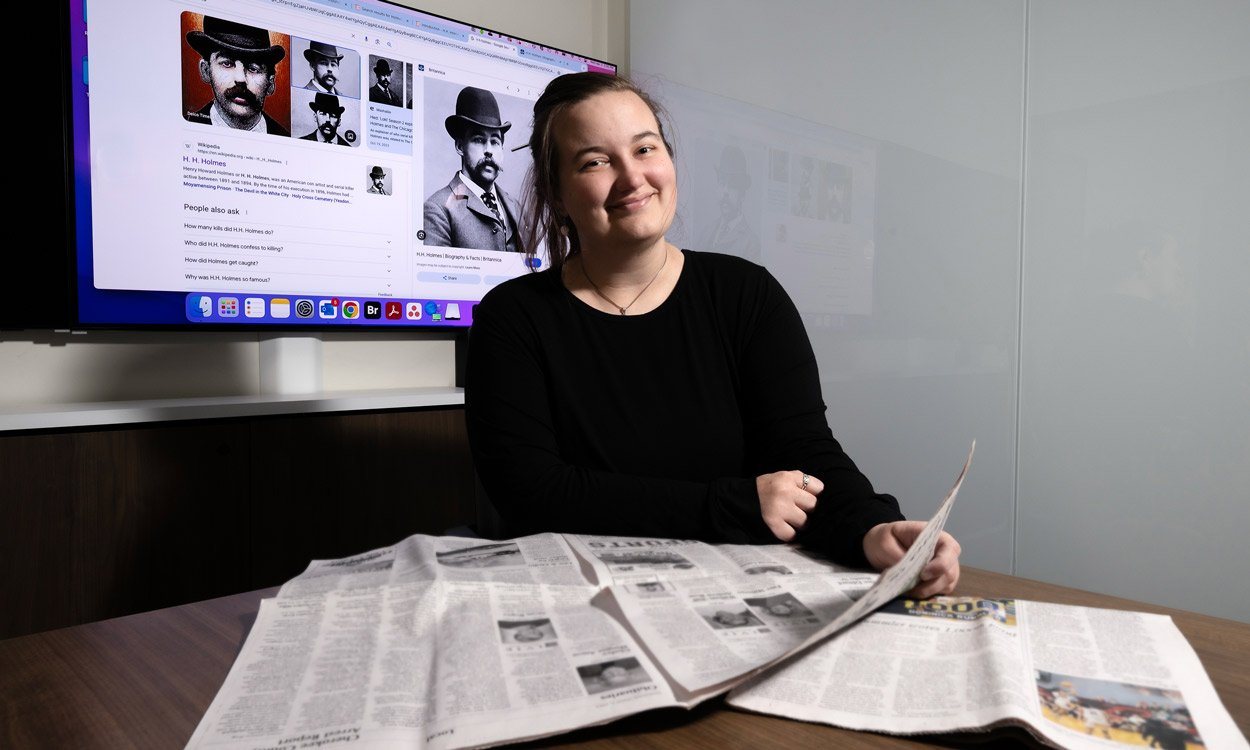
By Julia Duvall
Western Carolina University student Emma Roy, a junior from Clayton double majoring in history and forensic anthropology, has always had a love of history and murder investigations.
Her interest peaked when she was introduced to a murder mystery podcast by her godmother several years ago.
“I am a True Crime fanatic and I got hooked on a podcast about these different serial killers,” Roy said. “Even though my mom does not like gory things, she had interest in Jack the Ripper and listened to that podcast episode with me, which led to me learning about the 1890s serial killer H.H. Holmes and reading the novel, ‘Devil in the White City.’”
After reading the novel, Roy realized that while Holmes’ biographical information had been heavily explored, public perception of the murders had not.
This is when Roy came up with the idea to combine historical research with serial killer investigations.
Through her historical research course at WCU, Roy talked to Alex McCauley, department head and associate professor in WCU’s History Department, about combing her interests with a research paper on the public perception of Holmes through newspaper clippings.
“This is such a cool project and Emma has worked very hard on it,” Macauley said. “A major challenge in a project like this is taking such a sensationalized story and uncovering its deeper historical significance. It takes a student as clever, creative and diligent as Emma to accomplish this feat.”
Roy fondly remembers going with her classmates to the library to check out books for their research and all the books she checked out were about serial killers, crime scenes and murder investigations.
“I remember Dr. McCauley jokingly telling me we were going to get banned from Hunter Library and put on a list because of the books I chose for this project,” she said.
Roy’s research paper, “Only murders in the paper: How publications enthralled Chicago, elevated America’s first serial killer and evaporated public interest,” is 16 pages of information about Holmes, including how yellow journalism influenced public opinion of the investigations of his presumed murders.
“Yellow journalism was about news outlets using sensationalized information with little to no credibility to sell their papers,” Roy said. “While my research was limited to digital archives, I discovered there was this media frenzy about Holmes, then all of a sudden, the articles about the investigation kept getting farther and farther from the front page until nothing was printed.”
Some of the more sensationalized information about Holmes centered on what was dubbed as his “Murder Castle,” a building he commissioned ahead of the 1893 Chicago World’s Fair as a hotel.
“Most of Holmes’ murders took place during the fair,” Roy said. “There were so many victims that worked at his ‘hotel’ and when their families would inquire about them, he would just say, ‘Oh she ran off and got married, I haven’t seen her in months.’ I can’t even imagine. These poor families never got closure.”
There are nine women that are known victims of Holmes. The most well-known was Emeline Cigrand, whom he had connections with prior to the fair.
“He locked her in an airtight vault and she was either gassed or suffocated to death,” Roy said. “She tried so desperately to get out, her footprint was found on the vault where she tried to escape. Looking through these newspaper clippings, nothing was said about her, which I find so strange.”
While Holmes confessed to 27 murders, some of those people were found to still be alive and there is potential that Holmes had more than 130 victims.
He was only convicted for one murder though, that of his business partner and accomplice in insurance fraud schemes, Benjamin Pitezel.
Holmes was hanged for the crime of murder on May 7, 1896.
After sharing her project details with a friend, Roy was encouraged to submit the project to the National Conference on Undergraduate Research.
“I got a big old ‘I told you so’ from my friend when the project was accepted,” Roy said.
Roy, along with 10 other WCU undergraduate students, flew out to Long Beach, California, on April 7 to present their research projects at NCUR.
As for her plans after graduation, Roy has a dream of opening a museum for unsolved murder investigations.
“I would love to curate cold case items for a museum where visitors can try and help solve these crimes,” Roy said. “How amazing would that be to finally give families closure about what happened to their relatives anywhere from five to 200 years ago?”
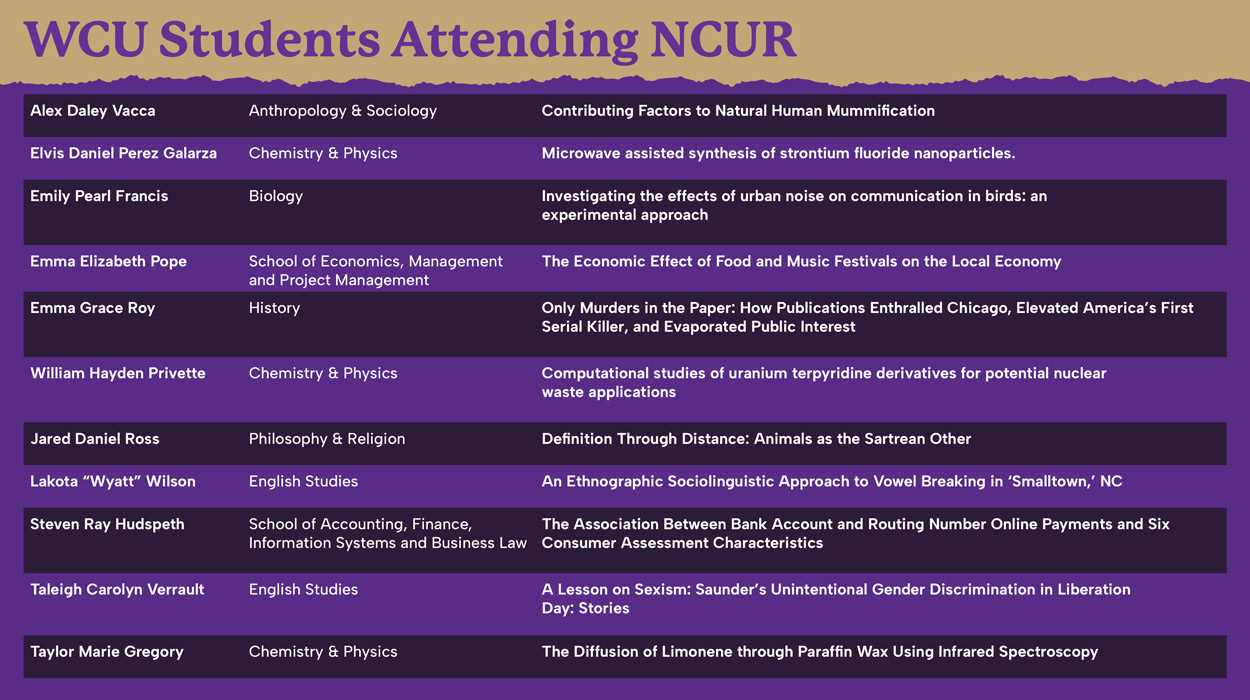
Related Stories
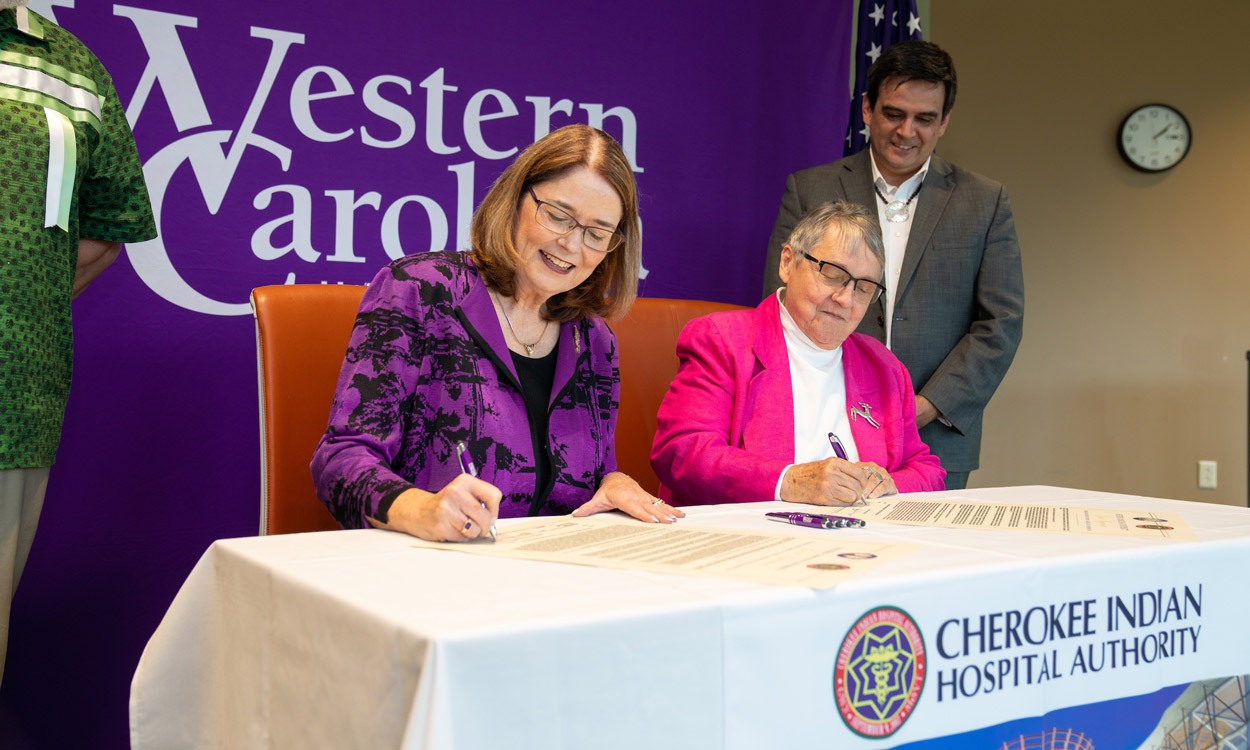
Regional Impact
College of Education and Allied Professions
WCU, Cherokee Indian Hospital Authority sign agreement for McKee Clinic funding

Student Experience
Commitment deposit deadline for summer, fall first-year students extended to May 15
About the Blog
Western Carolina University is located in the beautiful Southern Appalachian mountains of Cullowhee, North Carolina. Our 600-acre mountain campus is surrounded by one of the most biodiverse regions in the state that provides students unparalleled learning and adventure opportunities. If you're looking for a university ready to fight as hard for your success as you are, choose WCU. Learn more about our campus...
- February 2024
- January 2024
- December 2023
- November 2023
- October 2023
- September 2023
- August 2023
Connect with Us
- Like Us on Facebook
- Follow us on Twitter
- Follow us on Instagram
- Subscribe to us on YouTube

COMMENTS
History 19th century. The concept of the research university first arose in early 19th-century Prussia in Germany, where Wilhelm von Humboldt championed his vision of Einheit von Lehre und Forschung (the unity of teaching and research), as a means of producing an education that focused on the main areas of knowledge (the natural sciences, social sciences, and humanities) rather than on the ...
Competition for private donors, talented students, and highly skilled professors produced a virtuous circle in which elite institutions re warded high-quality research.. T he United States had about 900 colleges before the Civil War. By 1875, educational attainment exceeded that in any European nation, but the country had no top-tier research universities.
Levine, one of the principal investigators of a new Stanford Changing Human Experience grant, "Recovering the University as a Public Good," also shared some of the lessons the institution's history offers about academic leadership today.. The model for a university devoted to both research and teaching, Levine said, didn't emerge until the 19th century, in Germany, with the rise of the ...
The American research university was born a century after the American Revolution, when Johns Hopkins University opened its doors in 1876. It was an amalgam of the British Oxbridge undergraduate ...
Oxford, the second oldest university and oldest English speaking university, was probably sometime late in the 11th century. Traditions such as having a chancellor and residence halls had become established by the 13th century. Oxford had established its oldest colleges, Balliol and Merton Colleges, by the mid 13th century (Figure 2).
This history of the development of universities is the first of two articles on the past and future of the campus. ... A key reason for the increasing focus on university research was the lessons ...
Research universities are a recent innovation, having emerged in Prussia in the early 19th century, and in the United States only in the aftermath of the Civil War. By 1940, perhaps a dozen American universities could be regarded as rst- ... For most of their history, beginning in the 11th and 12th centuries, European universities were teaching ...
A seminal work—first published in 1963—on the history of the "federal grant university," what Kerr famously dubbed the "multiversity." Conceptually rich yet accessibly written, this book is essential reading for scholars, students, and administrators interested in understanding the behavior of the modern research university since ...
The History of the Research University. The lineage of the U.S. research university can be traced to the great German and English universities and their respective forms and traditions. In fact, throughout most of the nineteenth century, there were no true research universities in the country.
The Rise of American Research Universities provides a fresh historical interpretation of their ascendancy and a fresh, comprehensive estimate of their scholarly achievement. Before the Second World War, few universities in the United States had earned high respect among the international community of scholars and scientists.
the PhD in Britain) and another body of work on the history of the research university (including, for example, Clark, 2006 and Axtell, 2016). The task we set ourselves was to distil a coherent, and reasonably succinct, account of the history of researcher development in universities, particularly in Britain, that is as compatible as possible
The book is divided into five sections: "German Research Universities," "Americans Abroad and Returning," "American Adaptation," "Undergraduate Ed ucation in the University," and "Aftermath.". The first section, "German Re-search Universities," contains two texts on the University of Göttingen, which was established in ...
total research and development spending. In fiscal year 2021, the university performed $3.181 billion in medical, science, and engineering research. It has ranked No. 1 in higher education research spending for the 43rd year in a row, according to the National Science Foundation. 4. Johns Hopkins is Maryland's largest
The history of higher education in the United States begins in 1636 and continues to the present time.American higher education is known throughout the world for its dramatic expansion. It was also heavily influenced by British models in the colonial era, and German models in the 19th century. The American model includes private schools, mostly founded by religious denominations, as well as ...
A.G.M. Mitchell for one, a graduate of the University of Melbourne's engineering program in 1905, developed a "thrust bearing" adopted by "all new British warships" during the First World War. This technology afforded an "annual saving to the Navy alone in coal and oil [that] was given as at least £800,000" (Chapman 1921).
Harper Quadrangle at the University of Chicago, a U.S. research university. This is a list of universities in the United States classified as research universities in the Carnegie Classification of Institutions of Higher Education.Research institutions are a subset of doctoral degree-granting institutions and conduct research.These institutions "conferred at least 20 research/scholarship ...
Universities engage in research as part of their missions around learning and discovery. This, in turn, contributes directly and indirectly to their primary mission of teaching. Universities and ...
The Universities Research Association (URA) was founded in 1965 by a cohort of 34 universities across the U.S. to "provide a national basis" for the management and operation of the proposed 200 GeV proton accelerator. This project emerged from recommendations on behalf of the scientific community to expand the frontiers of high-energy ...
Learning to Do Historical Research: A Primer for Environmental Historians and Others. by William Cronon and his students, University of Wisconsin. A website designed as a basic introduction to historical research for anyone and everyone who is interested in exploring the past. Reading, Writing, and Researching for History: A Guide for College ...
The Victoria County History is one of the world's longest-running research projects, exploring England's rich local history. The Windrush Scandal in a Transnational and Commonwealth Context This research project seeks, for the first time, to produce a scholarly examination of the so-called 'Windrush Scandal' within a fully transnational ...
The best history research universities are those with rich histories of influence, proven through the work produced by the program's faculty and alumni. Beyond demonstrating scholarly impact in the field, the best history degree programs maximize your opportunities to interact with outstanding history faculty.
Two professors at the University of Virginia School of Law join the "Common Law" podcast to discuss how their differing approaches to researching the past, from the Civil War to the civil rights eras, have uncovered forgotten stories that help us understand today's legal landscape. In the season's fifth episode, released Tuesday, Professors Cynthia Nicoletti and Joy Milligan talk with ...
11 April 2024. A new book edited by researchers at the University of Reading is the first international collection to explore the often overlooked role of women in publishing over the past 120 years. Published this month by Edinburgh University Press, The Edinburgh Companion to Women in Publishing explores the diverse and significant impacts ...
The History of the Research University. The lineage of the U.S. research university can be traced to the great German and English universities and their respective forms and traditions. In fact, throughout most of the nineteenth century, there were no true research universities in the country. It was during the latter portion of the 1800s that ...
ReALM: Reference Resolution As Language Modeling. Reference resolution is an important problem, one that is essential to understand and successfully handle context of different kinds. This context includes both previous turns and context that pertains to non-conversational entities, such as entities on the user's screen or those running in the ...
European universities date from the founding of the University of Bologna in 1088 or the University of Paris (c. 1150-70). The original medieval universities arose from the Roman Catholic Church schools. Their purposes included training professionals, scientific investigation, improving society, and teaching critical thinking and research.
Class Activities. Enter the following information in this Padlet. Column 1: subject headings you find searching OSCAR, LINK+, or WorldCat. Column 2: Subject terms you find searching America: History & Life. Column 3: Potential primary sources you find on your topic. Column 4: People, organizations, general ideas for future exploration.
Research on school discipline has focused largely on the effects of exclusionary measures across the life course, but a University at Buffalo sociologist has published a new study that suggests how a fuller range of disciplinary experiences, not just the most severe punishments, has detrimental health and well-being implications for students later in life.
Nominate them using our online form or contact the Oral History Research Center at 702-895-2222. If you're interested in learning more about the project, or follow updates on the work, visit the Game On! webpage. University Libraries Oral History Research Center Special Collections and Archives. The center's newest project will chronicle the ...
Western Carolina University student Emma Roy, a junior from Clayton double majoring in history and forensic anthropology, has always had a love of history and murder investigations. Her interest peaked when she was introduced to a murder mystery podcast by her godmother several years ago.